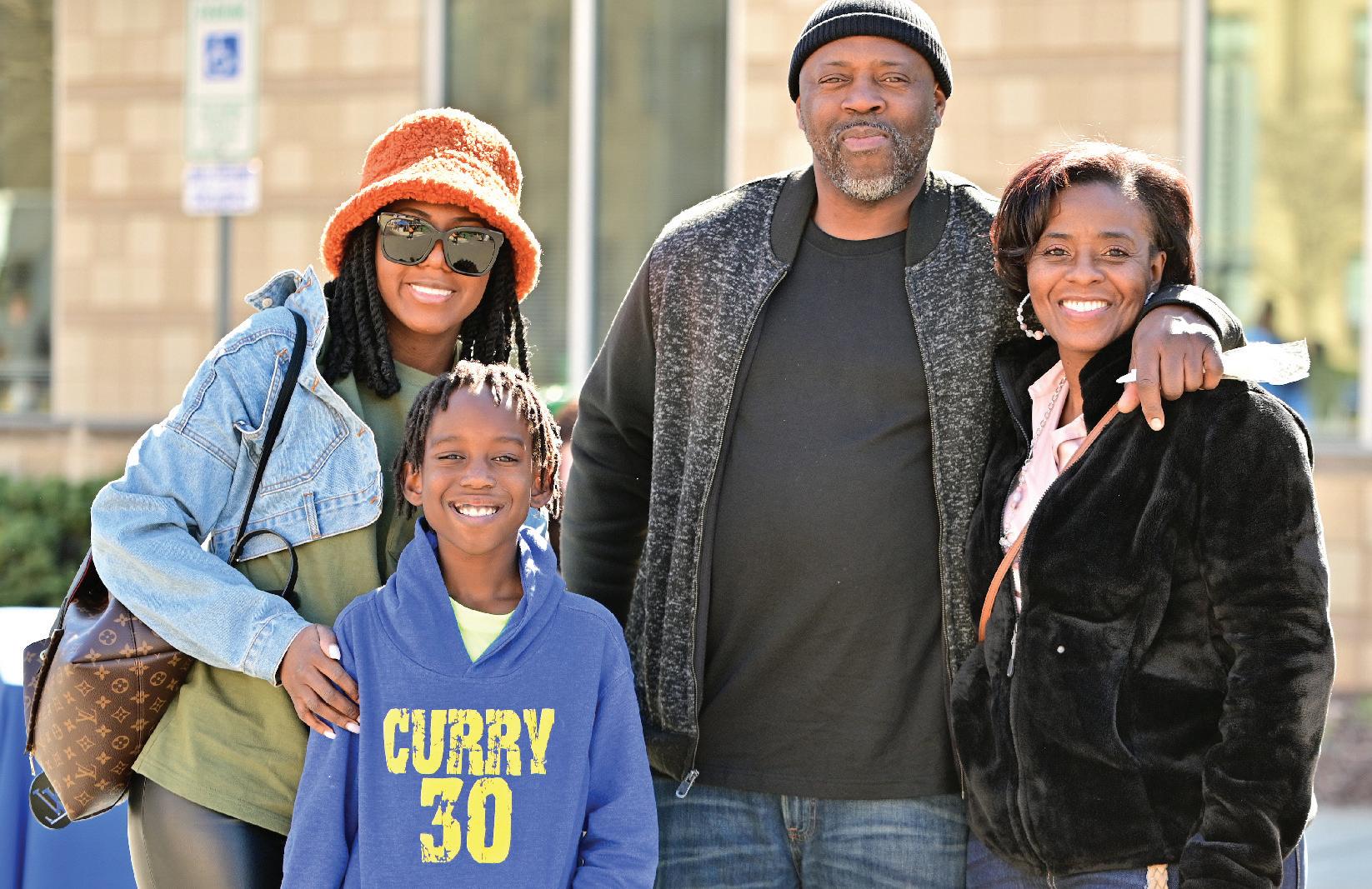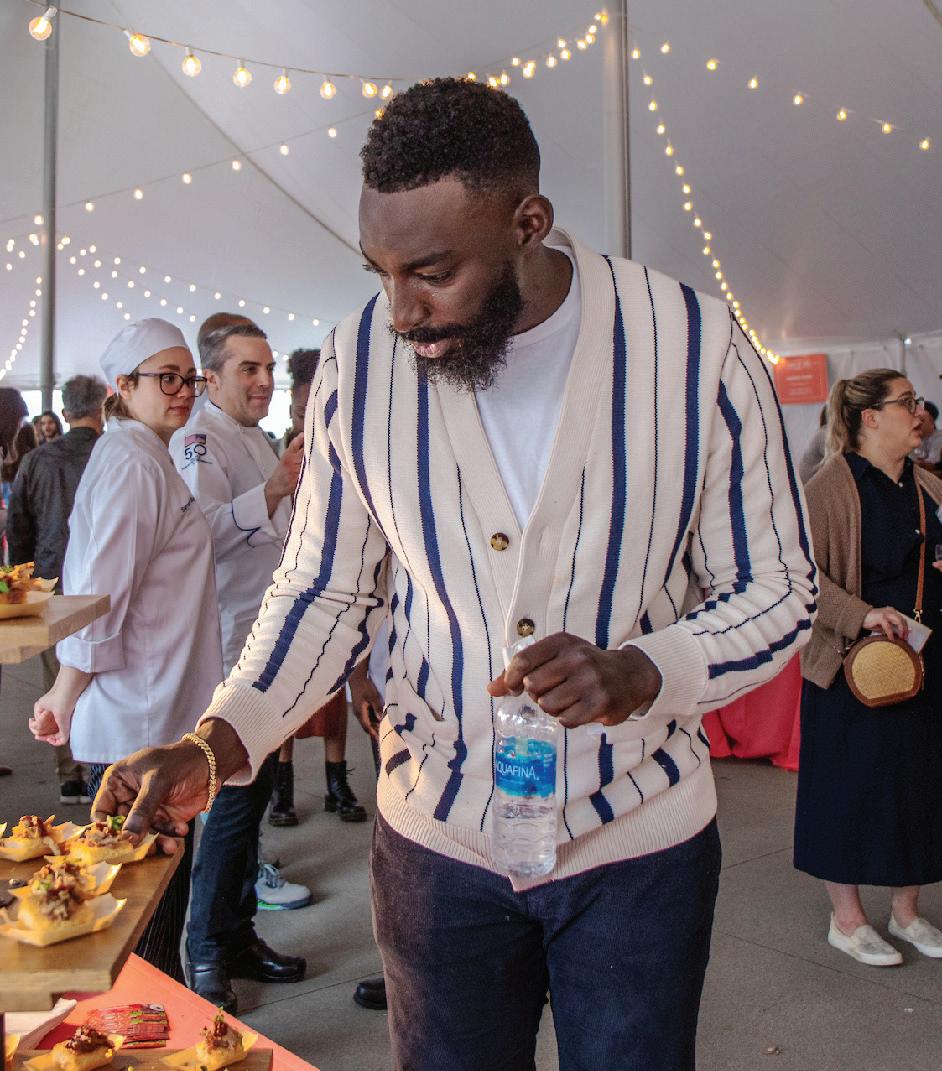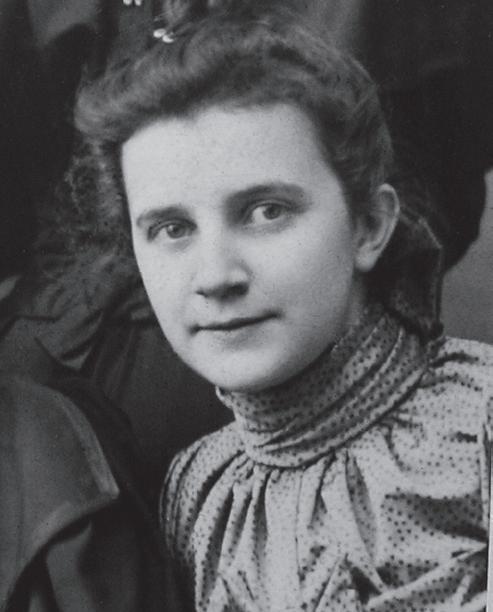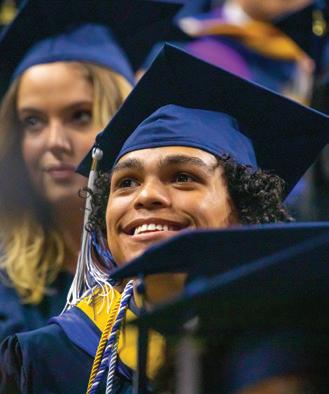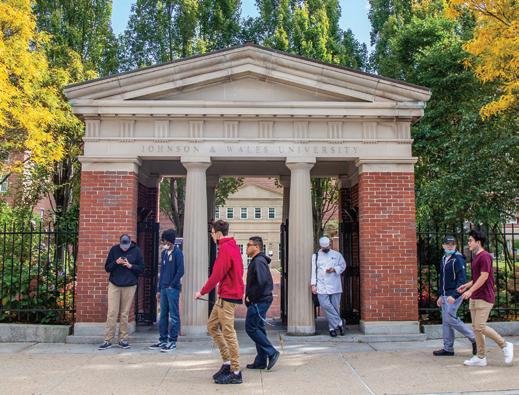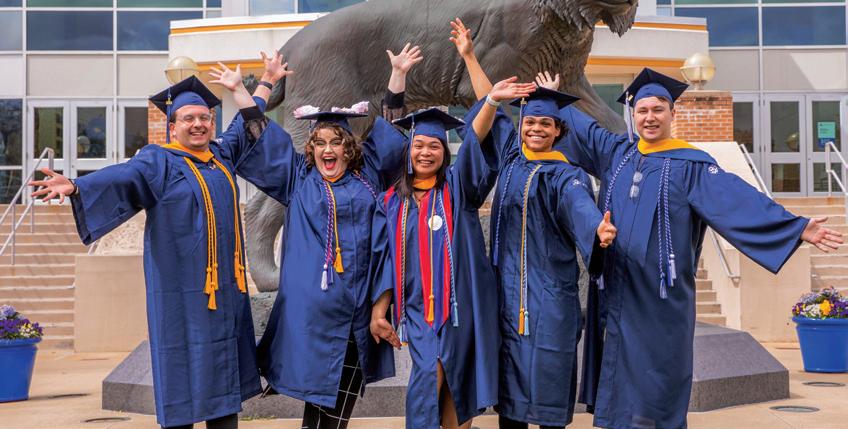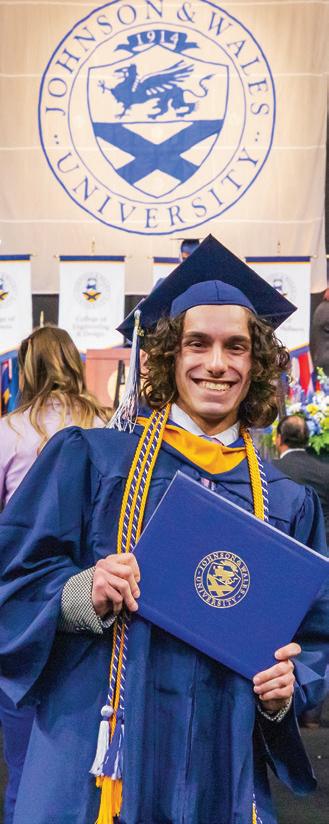
The Hook Community partnerships give Wildcats a leading edge



















The Hook Community partnerships give Wildcats a leading edge

















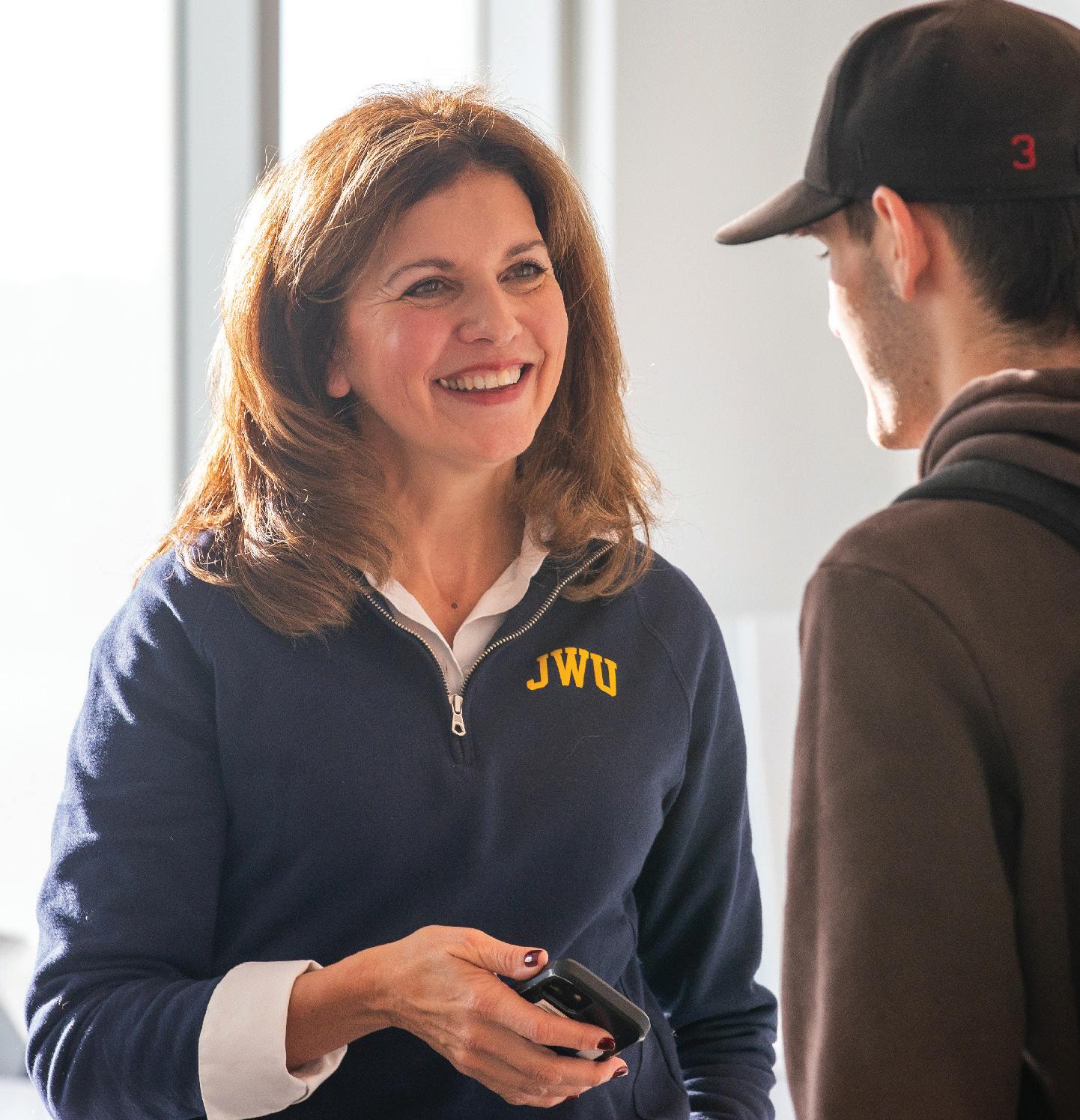
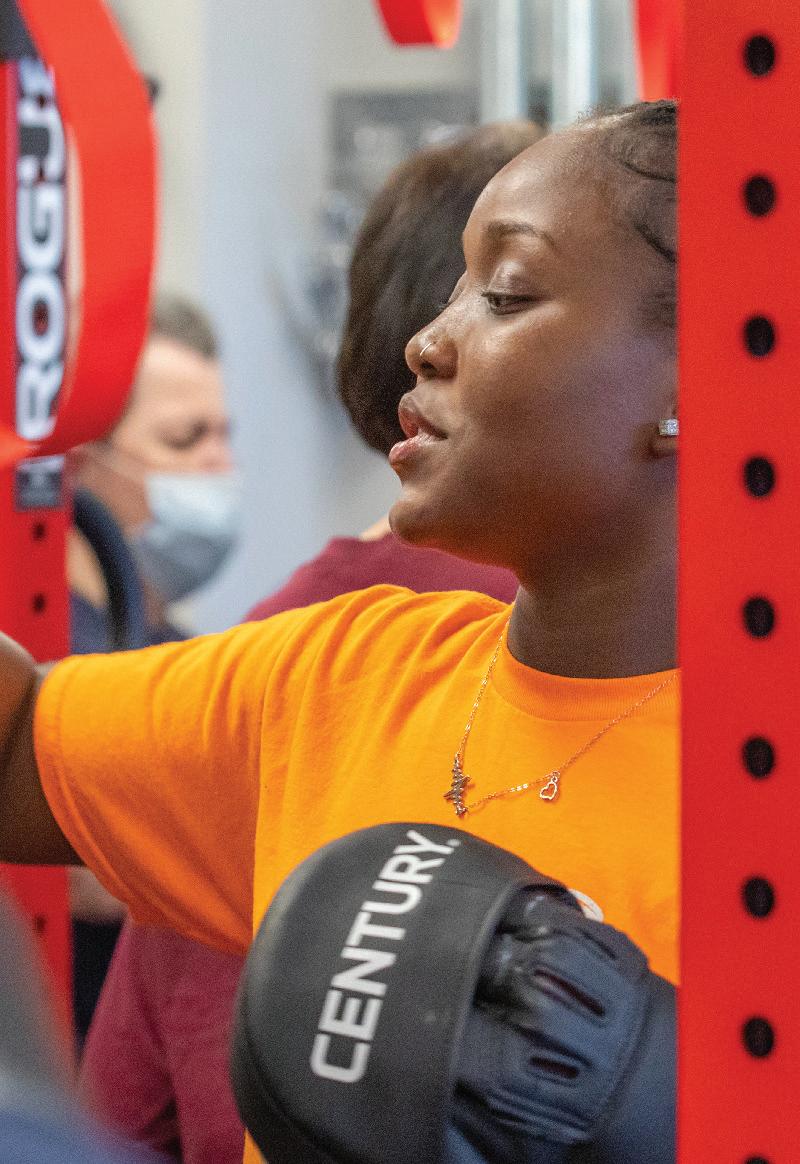

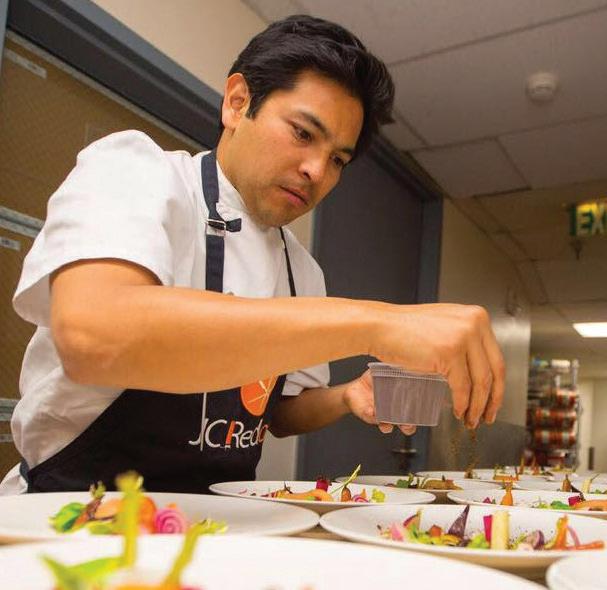
The First-Year Seminar provides a road map for navigating the transition from high school to college.
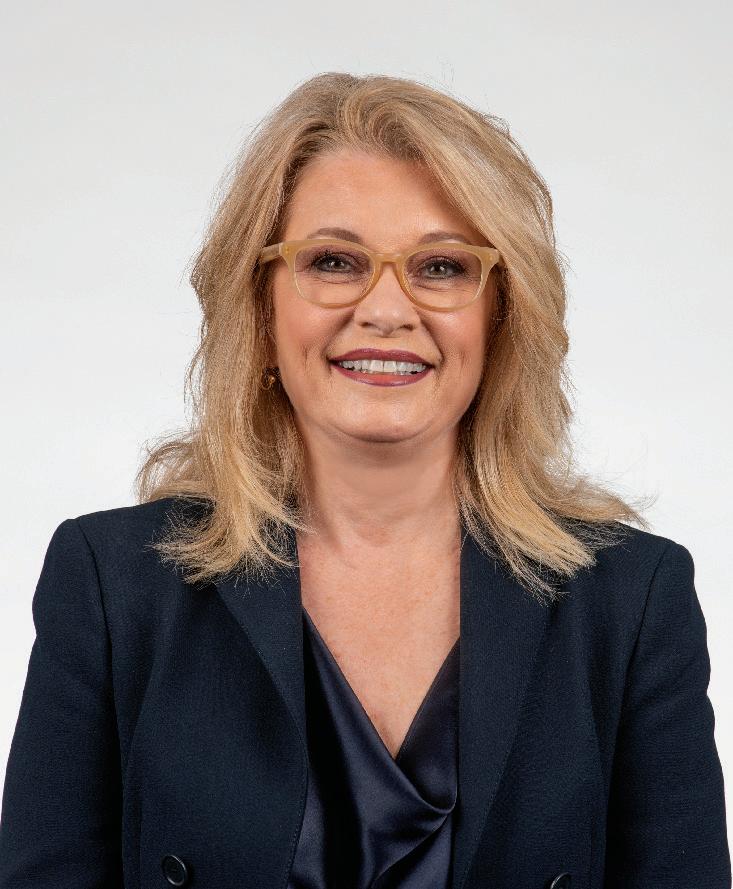
JOHNSON & WALES UNIVERSITY has been rooted in the Providence community since 1914 when our founders Gertrude Johnson and Mary Wales opened their school with one student and one typewriter on Hope Street on the East Side of the city. As we celebrate 110 years from our founding, it is fitting that we recognize Johnson & Wales’ community partnerships as the theme of our spring issue. The university’s dedication to experiential learning and a tradition of giving back dovetails with JWU’s extensive programming that pairs students with local organizations for course credit and real-world experiences.
One of the magazine’s features focuses on how the university has integrated community placement opportunities for our College of Health & Wellness (CHW) students. According to CHW’s Associate Dean Rebecca Simon, Ed.D., “We want [community members] to feel that the College of Health & Wellness is a resource for education, advocacy and support to those who need it.” The end result, she adds, is betterment of life for them and an exceptional education for our students.
As JWU’s College of Food Innovation & Technology incorporates food policy studies into its curriculum, it made perfect sense for the university to align with our graduate’s nonprofit organization dedicated to eradicating food insecurity. “Do what you can with what you have” is the motto that drives George Ortiz Jr. ’23. He and his wife started The Elisha Project with 24 bag lunches and less than $50 in their wallets. Fifteen years later, their nonprofit has shared rescued food plus household goods around the globe, including deliveries to Wildcats in need at the Providence Campus.
From our founding in 1914, we have always focused on our students. For some, the transition from high school to college can be challenging. It is now a little smoother thanks to the roadmap provided by our First-Year Seminar. Administrators, faculty and staff lead sections of about 20 students through their first formative semester of college. The cross-disciplinary course provides a fast-track to the resources, habits and attitudes they will need to succeed in college. The seminar also offers camaraderie-building field trips and a safe space to hone executive functioning skills as they deepen their ties to the JWU community.
Miss Johnson and Miss Wales would be amazed and proud to see how the university has evolved and prospered through the decades, and how prominently rooted we are in the Providence and Charlotte communities.
With Wildcat Pride,
 Mim L. Runey, LP.D. Chancellor
Mim L. Runey, LP.D. Chancellor
Vice President of Marketing & Communications
MATTHEW MONTGOMERY
Editor
DENISE DOWLING
Designer
BRIAN MURPHY
Contributors
SCOTT BOWERS
JENNIFER BROUILLARD
MIKE COHEA
LYNZI DELUCCIA
KRIS DERAIMO
ALISSA DION
ELIZABETH GEHRMAN
PETER GOLDBERG
ANNIE KENNEDY
BILL KOCH
NICOLE MARANHAS
DAN MORRELL
RACHEL NUNES
LISA PELOSI
CLARA SCHWAGER
KATELYN SILVA
MARIE-INES VALDEPENAS
JWU Magazine is published twice a year. Photos (black and white or color prints), high-resolution digital images and news can be sent to JWU Magazine, 8 Abbott Park Place, Providence, RI, 02903 or emailed to jwumagazine@jwu.edu.
Selection and publication of entries are at the editor’s discretion. JWU Magazine is produced by Strategic Communications in cooperation with the department of Advancement & University Relations.
Chancellor
MIM L. RUNEY, LP.D.
Campus Presidents
MARIE BERNARDO-SOUSA, LPD., ’92, PROVIDENCE
RICHARD G. MATHIEU, PH.D., CHARLOTTE
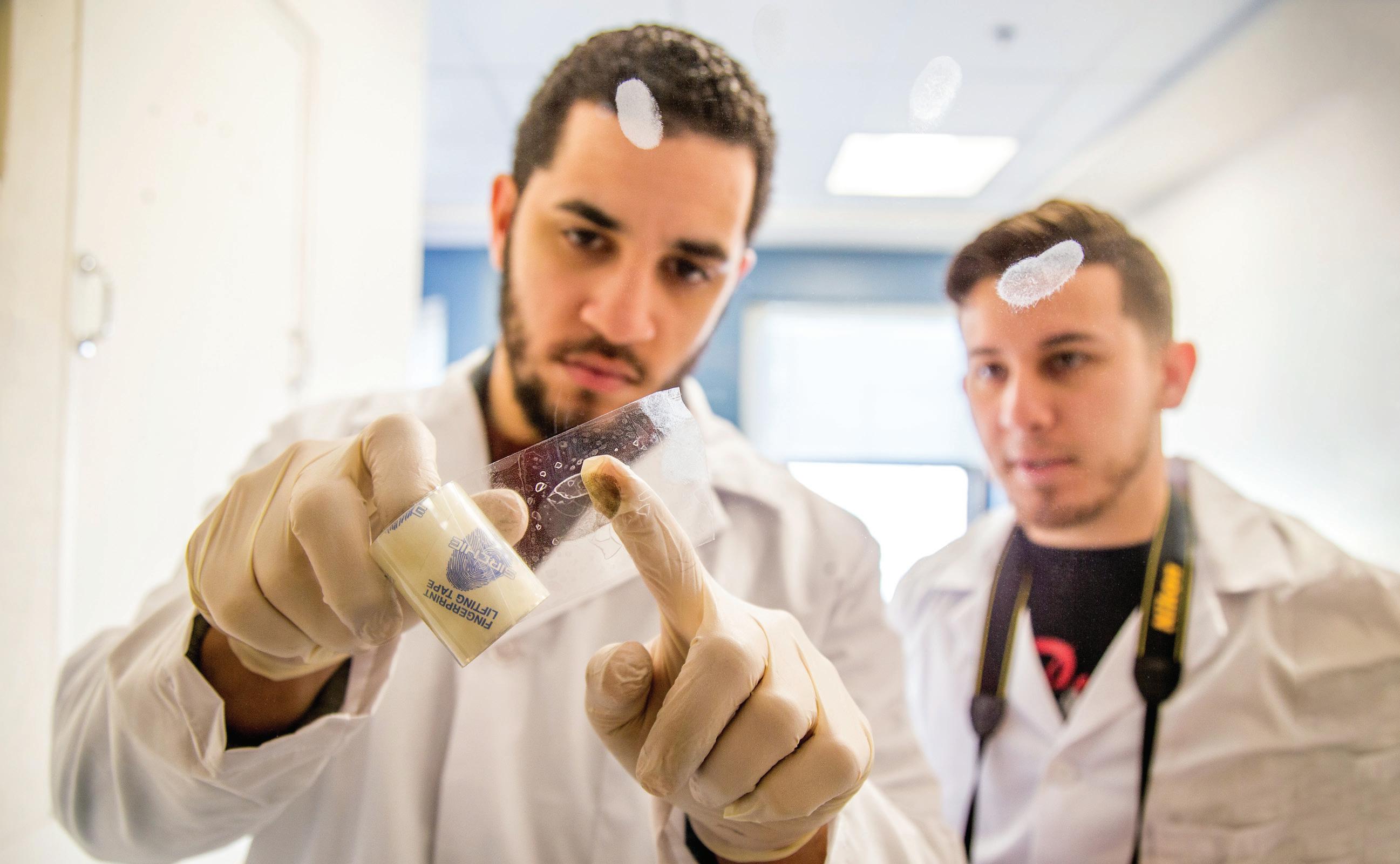
IN FALL 2023, Johnson & Wales hosted more than a dozen law enforcement officers from Warwick, Smithfield, Cumberland, Warren, neighboring universities, and the state’s Department of Corrections. It constituted JWU’s inaugural Basic Investigator Training course, falling right into Barbara Frazier’s wheelhouse.
Frazier came to JWU after a 20-year career with the Warwick Police Department and is in her second year, full-time, as an assistant professor in JWU’s Criminal Justice program. She joined Adjunct Professor and retired North Smithfield Police Captain Stephen Riccitelli to help lead the 40-hour training course that took place over five Fridays on JWU’s Downcity Campus.
“[We go over] everything from computer forensics to blood spatter, fingerprint lifts and some crime scene photography,” Riccitelli says. “They’re getting a wide variety of training that’s going to put them in a much better position when they go back to their agencies.”
Following time spent in JWU’s state-of-the-art Crime Lab, which offers a crime-scene staging room, officers visited the university’s NSA/DHS-designated “Center of Academic Excellence” Cybersecurity Center. There, faculty in the College of Engineering & Design’s Cyber Threat Intelligence & Defense program shared insight on types of digital evidence and what information can be derived from that evidence, as well as the proper methods for collecting and storing digital evidence.
“It gets us really good feedback on what these officers are doing and what they need so we may change our curriculum to keep up with challenges they’re facing,” Assistant Professor Peter Reid says. “Having those connections is going to help get our grads internships and job opportunities.”
The university plans to continue these trainings, building relations with industry professionals who support Johnson & Wales’ commitment to experiential education, setting our students up for success.
In January, JWU welcomed Maura Daly Iversen, DPT, SD, MPH as the new dean of the College of Health & Wellness. Dean Iversen comes to JWU from Sacred Heart University, where she previously served as the dean of the College of Health Professions.
Before Sacred Heart, she spent a decade at Northeastern University, first as the chair of the Department of Physical Therapy & Rehabilitation Sciences, and later associate dean of Clinical & Rehabilitation Programs, Innovation and New Initiatives at the Bouvé College of Health Sciences.
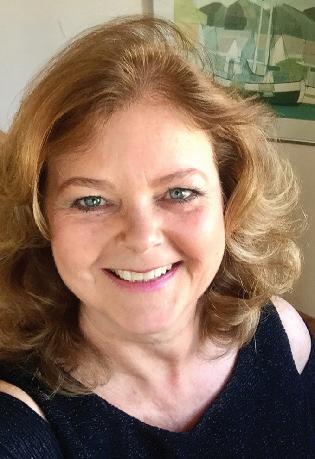
“We are very pleased to welcome Dr. Iversen to JWU,” says Provost Richard Wiscott, Ph.D. “Maura truly believes in lifelong learning, and has extensive experience teaching, developing curriculum, and advising students at both the undergraduate and graduate levels. We look forward to sharing her expertise in health and wellness, scholarship, and building community connections with our faculty and students.”
Throughout her career in education, Dean Iversen has focused on student success, developing accelerated and pathways programs linking undergraduate to graduate education and both designing and implementing initiatives to improve retention and graduation rates. She is also an accomplished researcher, with a history of publishing and presenting to national and international audiences. She prides herself on her ability to form strategic partnerships with healthcare systems, focusing on programs that meet changing industry needs.
Dean Iversen received her Bachelor of Science and Certificate in Physical Therapy from Simmons College in Boston, a Master of Public Health from Boston University, a Doctor of Science in Behavioral Science with a co-concentration in Clinical Epidemiology from Harvard University, and a Doctor of Physical Therapy from the MGH Institute of Health Professions in Boston.
Many JWU students have interned at the Xfinity Center in Massachusetts, a live entertainment venue owned by Live Nation, thanks to the strong partnership we’ve built over the years. It’s the perfect opportunity for Sports, Entertainment, Event — Management (SEEM) students to gain hands-on experience with event operations, guest experiences, marketing, ticketing and venue management.
“It’s been great to have so many people from the JWU community here at work,” says Megan Knight ’22, a SEEM alum who serves as the backstage experience coordinator for the venue.
Knight was recommended for the position by Samantha Lynn ’22, an operations coordinator for Xfinity whose role was created for her after her internship there. The JWU alumni network at Xfinity proves to be a “great foot in the door” for students honing their skills in JWU’s SEEM program where they choose a specialization in either sports management, event management or live entertainment management.
“For students who are going into live entertainment, I think it’s important to remember that the return on the investment for participating in a student program or an internship is that you’re meeting so many people in the industry and even people who are working at other venues or another capacity,” says Associate Professor Julie Viscardi-Smalley.
Matthew Fannon ’08, ’14, ’22 MBA, JWU’s director of sustainability, also serves as the facilities and sustainability manager at Xfinity. “I’ve been able to use the skills that I learned over those years at the university and utilize them at the venue,” says Fannon.
As JWU continues to offer students in the SEEM program opportunities to explore the live entertainment world, alumni have found great success by building connections with their professors and taking advantage of JWU’s industry partners — Xfinity Center is just one example of the many paths that SEEM students can explore.
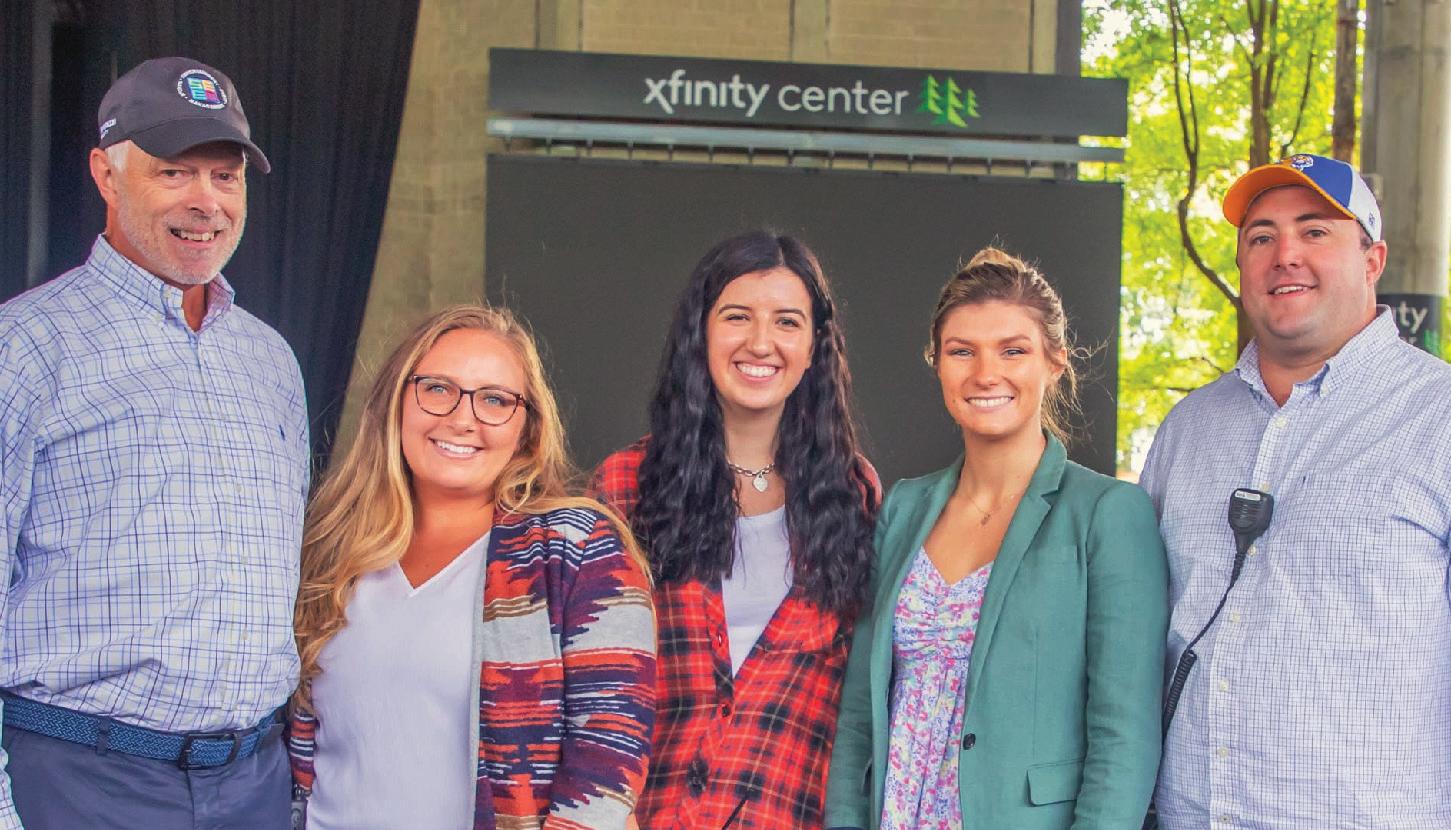
Johnson & Wales University proudly honors Professor Alana Dagenhart, Ph.D., an esteemed JWU Charlotte Campus faculty member in her 16th year of teaching English courses, specializing in poetry and creative writing. Her recent achievement of receiving the prestigious Fulbright Award highlights not only her scholarly dedication but also her profound impact on students and the academic community.
Reflecting on her Fulbright journey, Dagenhart shares, “Receiving this prestigious award has been a lifelong academic aspiration and a four-year application journey. Each year, I progressed a little more through the process. I am so glad I did not give up!” Her persistence, support from her JWU colleagues including Dr. Piyavan Sukalakamala and a fellow Fulbright Scholar, and her commitment to excellence have led to this significant recognition.
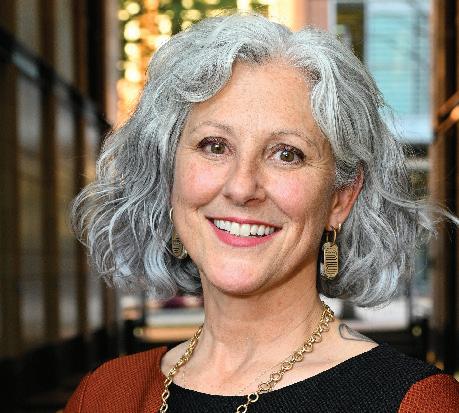
President Richard Mathieu expresses pride in Dagenhart’s accomplishments, stating, “Alana’s selection for a Fulbright Award is an outstanding testament to her excellence in the field of poetic literature. We are privileged to have her representing JWU on the world stage as her experiences will not only enhance her own scholarly pursuits but also enrich the educational experiences of JWU students. Dagenhart’s Fulbright journey underscores JWU’s dedication to fostering a vibrant intellectual community and global perspective in higher education.”
As a Fulbright Scholar, Dagenhart’s upcoming project at Queen’s University Belfast will delve into the intersections of Northern Irish poetry, North Carolina literature, and cultural connections. Her hybrid project blending poetry, place studies, science and pedagogy promises to forge new perspectives and insights in literary scholarship.
Dagenhart’s dedication to global engagement and cultural understanding resonates with the vision of the United Kingdom Fulbright Commission, striving for a world without obstacles to learning,
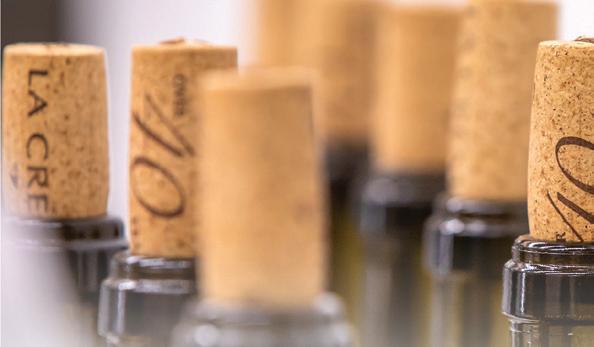

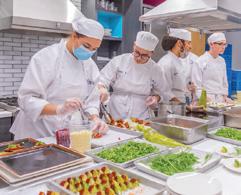
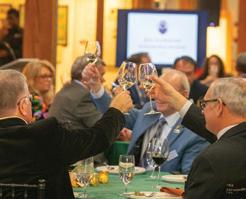
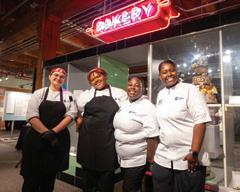

An unforgettable experience
Join JWU’s Epicurean Scholarship Society for exclusive access to
• Dinners with renowned chefs
• An annual lunch in the university dining room
• Invitations to events such as the FIT Symposium and special guest lectures
• Customized corporate cooking courses (Chef’s Choice)
Your membership matters
Funds support JWU philanthropically, helping to promote the communal spirit of fine cuisine and lifelong learning.
understanding and collaboration. Dagenhart’s journey serves as an inspiration to aspiring scholars and educators, emphasizing the value of perseverance and intellectual curiosity. Her advice to embrace rejections as opportunities for growth echoes the spirit of continuous learning and resilience.
“Take rejections like a compliment. All a rejection means is that you’re not ready—yet. If you are honest with yourself, you’ll find that rejections always serve you some valuable information that you can use to persevere. Take that information and turn it into success.”
Spring 2024 marks the 10th anniversary of the launch of JWU’s Physician Assistant Studies program. As the first university in Rhode Island to offer a PA program in 2014, JWU responded to the urgent need for more mid-level healthcare practitioners in the state. As we look back over 10 successful years, JWU is mindful of the important role the university has in shaping the clinicians of tomorrow.
From the start, the program has been centered on a whole-body approach to wellness, helping to shape practitioners with the respect, empathy and trust inherent to patient-centered, humanistic healthcare. The integrated didactic curriculum spans diverse populations and care levels, allowing students to graduate prepared and ready to contribute in meaningful ways to an industry under constant change.
Our state-of-the-art Center for Physician Assistant Studies, built ahead of the launch of the program, gives students the opportunity for both classroom and hands-on learning. By the time our students finish the year-round, 24-month program, they are
ready to enter the workforce as thoughtful and skilled healthcare professionals dedicated to improving the lives of their patients.
As JWU looks ahead to the next chapter of PA education, the university continues to innovate and offer new, in-demand programs, solidifying its commitment to shape the future of healthcare for decades to come.
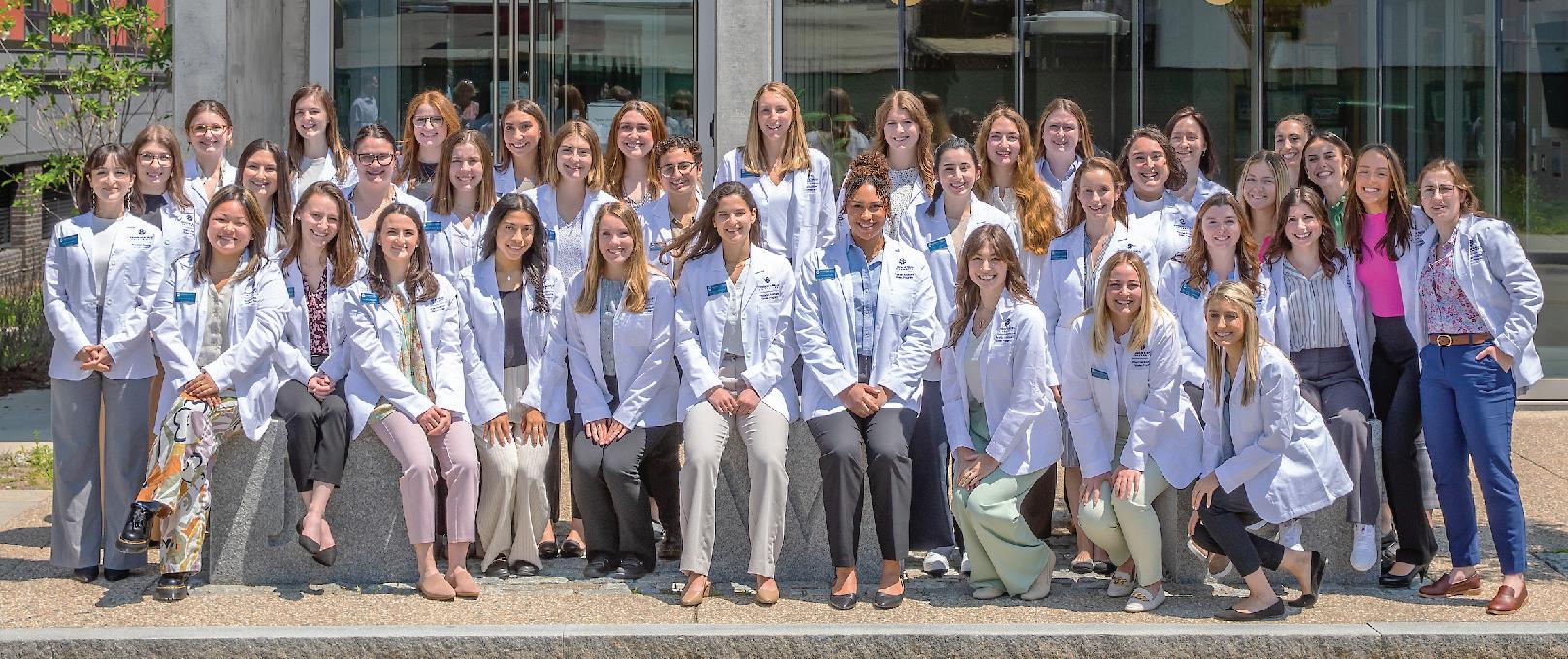
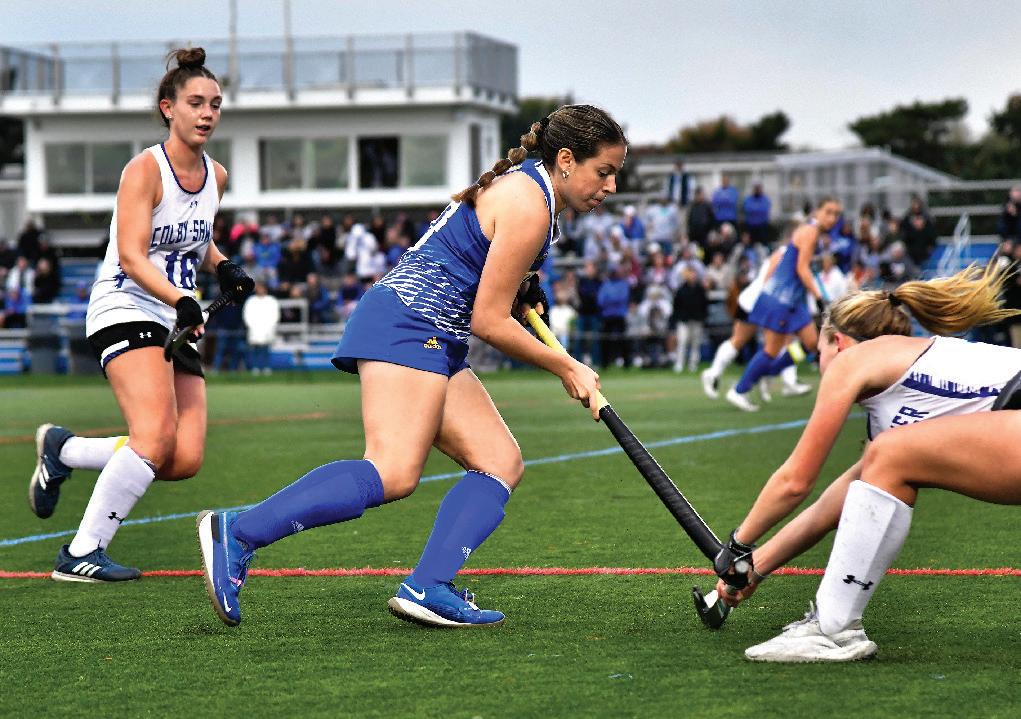
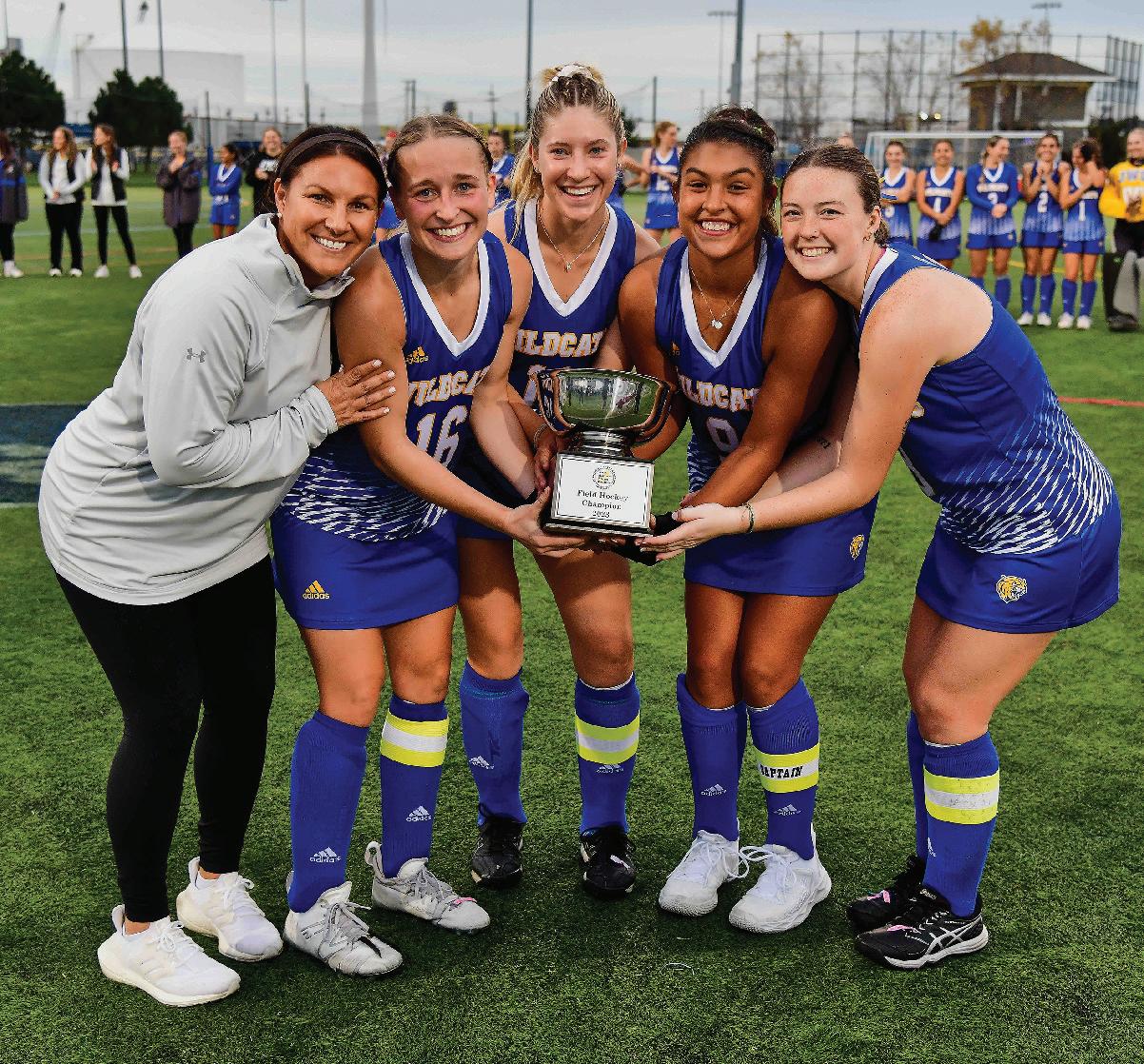
Lisa Lopes saw the potential for JWU to become a field hockey powerhouse. The Wildcats have made her vision come to life.
It was the success enjoyed by some other athletic programs at Johnson & Wales University’s Providence Campus that convinced Lisa Lopes. This was the place to pursue her first opportunity as a field hockey head coach. The Wildcats were less than a decade from their debut in 2013–14 and still had plenty of room to grow. The department machinery was in place — the right mix of staff and players could unlock something special. Her evaluation has proven true. Lopes and JWU celebrated a third straight Great Northeast Athletic Conference title this fall, and each led to a corresponding NCAA Tournament berth. The Wildcats have knocked Saint Joseph’s (Maine) off the league pedestal and now stand alone as its power program. “I didn’t have the success to talk about in the recruiting process,” Lopes says. “I was just selling the future. I was selling what I wanted us to be in the future.”
She’s now the two-time conference Coach of the Year, and Lopes led a near sweep of GNAC honors in November. Haley Budenas ’25 was named Defensive Player of the Year, Sophia Brea ’27 was tabbed Goalkeeper of the Year and Ava Pontes ’27 brought home
Rookie of the Year. JWU finished with a 17-3-0 overall record and outscored its opponents by a combined 73-6 before a postseason loss against Bates.
“I think everybody’s so different and so unique, but we all fit so well together,” Pontes says. “We call each other family, and it is true in some kind of way. I don’t think I would be able to imagine my college years without having the support of a team.”
Lopes didn’t need to travel all that far for her next chapter. She was the associate head coach at Providence College prior to taking over her own program. Her husband, Sam, is the head women’s soccer coach with the Friars. There was no move required and minimal disruption for their two sons, Jax and Cruz. “I was ready to be a head coach,” Lopes says. “I had been an assistant for a long time. I had worked with great coaches and great mentors, and I felt like I was at a point in my career where I wanted to do my own thing.” It wasn’t immediate — the world at large had other ideas. The onset of the COVID-19 pandemic kept the Wildcats from playing any matches in the 2020–21 academic year. JWU’s players went through spring and summer workouts with the hopes
of returning for 2021–22, and their message to incoming teammates like Budenas was clear. “My first year the upperclassmen had this drive, this want to win,” Budenas says. “They influenced everybody so easily. It seemed so distant for them, and then suddenly that year it wasn’t once we started winning.”
“It gave me that first full year without competition,” Lopes says. “We were allowed in the spring to do more practices. It gave me that first full year to get to know the girls without the pressure of games. Looking back on it, it was probably a blessing in disguise.” Lopes points to an overtime loss against New England College in her first season as a turning point. The result didn’t go their way, but she saw a certain intensity in the Wildcats that afternoon. They proceeded to rip off a 15-match winning streak that resulted in a GNAC championship and the program’s first NCAA Tournament bid. “The positives I saw in that game and the fight I saw in them — I realized, ‘Yeah, we’ve got something here,’” Lopes says. “And if they just continued on that trajectory of improving every single day, I thought we definitely could have a chance.”
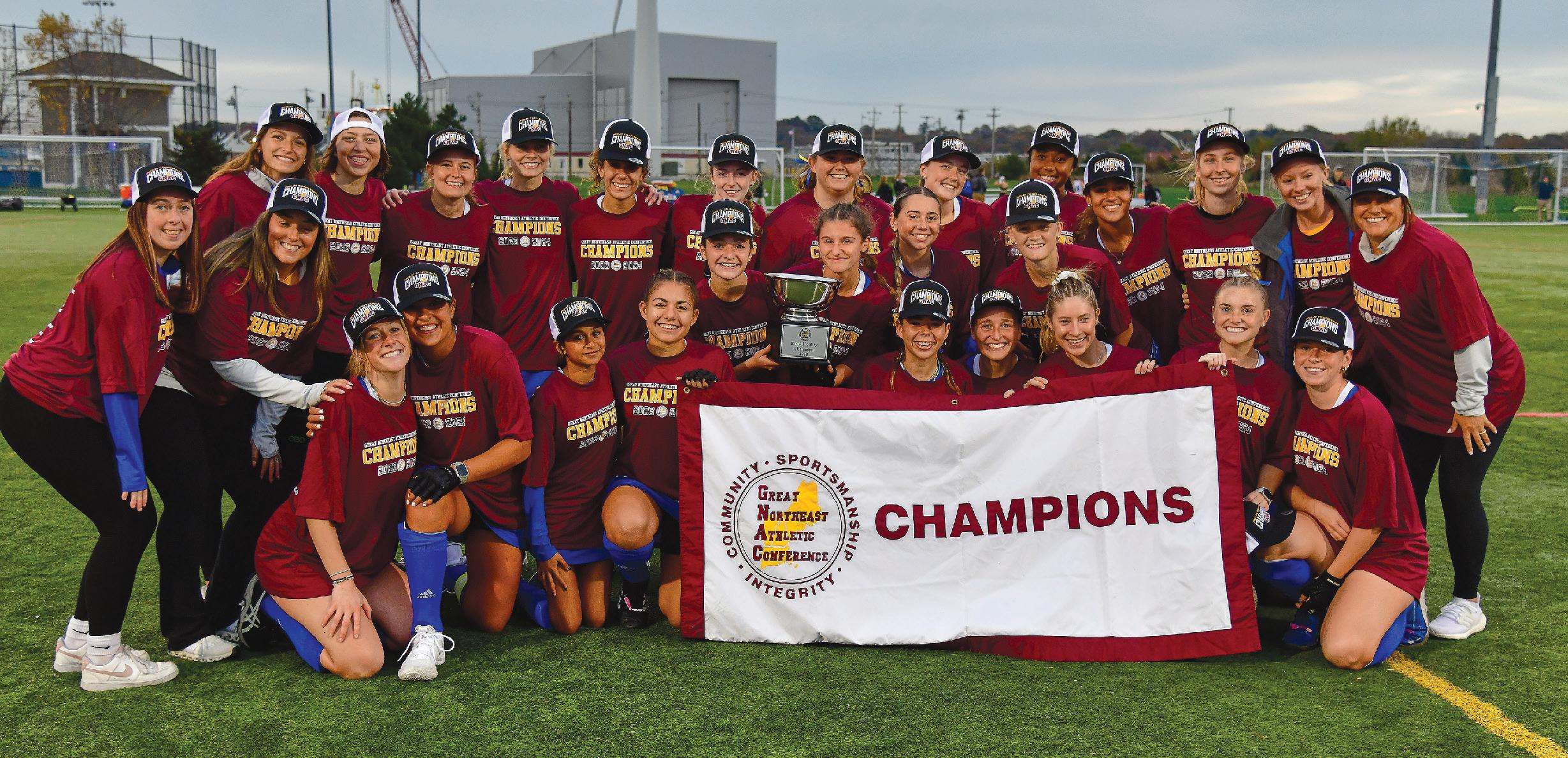
That newfound confidence carried forward. JWU won its first 15 matches in 2022–23 and finished unbeaten in league play. The Wildcats hosted the GNAC tournament and smashed three opponents by a combined score of 9-1, including a victory over Simmons in the title match. “Each year the recruits have gotten better and better,” Budenas says. “And I don’t mean anybody was bad to begin with, but it’s just a new level each time. I think they’re just so prepared, so confident in their abilities.” Pontes is exactly such a player. She was a Massachusetts state champion at powerful Somerset Berkley Regional and a graduate of a program whose coach, Jen Crook, saw her daughter, Cami, verbally commit to Lopes while she was still on staff at Providence. That was the personal connection that helped bring in JWU’s eventual leading scorer in 2023–24. “During practices I could almost feel myself progressing — my skill and my power,” Pontes says. “I think coach could see that, too. That was really nice.”
Pontes was among the scorers in a 4-1 victory over Colby-Sawyer that secured the program’s latest GNAC crown. Margaret Johnson ’23, ’24 added a goal and an assist — her former school, Wesley College, closed its doors in the midst of the pandemic due to financial difficulties. Johnson was already in contact with JWU about continuing
her lacrosse career, and Lopes almost accidentally stumbled upon a foundation piece. “I did have to change the culture a bit as far as the commitment goes,” Lopes says. “It was a little bit different prior to me coming. I needed to get them a little bit more on board with the commitment to the field hockey part. They wanted that.”
The Wildcats defense posted 13 shutouts last season, matching a program record. JWU has piled up 36 of those since Lopes and Budenas arrived on campus — they counted just 16 entering the 2021–22 campaign.
Budenas, Madison Young ’25, Kaitlyn Freeman ’24 and deep midfielder Katie Sloan ’24 formed a human wall in front of Brea, who was forced to make less than 50 saves in more than 1,000 minutes of action.
“We just became one,” Budenas says. “We were not letting anybody past us. That mindset translated into how we played.” The next step is making real progress in an NCAA field. The Wildcats fell to Tufts, 1-0, in that first appearance but had a considerably more difficult time against Williams and the Bobcats. This wouldn’t have been a conversation even five years ago — things can change quickly. Lopes and her players haven’t come this far just to stop now. “We just want to go past the first round and get into it a little more than just being there,” Budenas says.
“We made it here for a reason.”

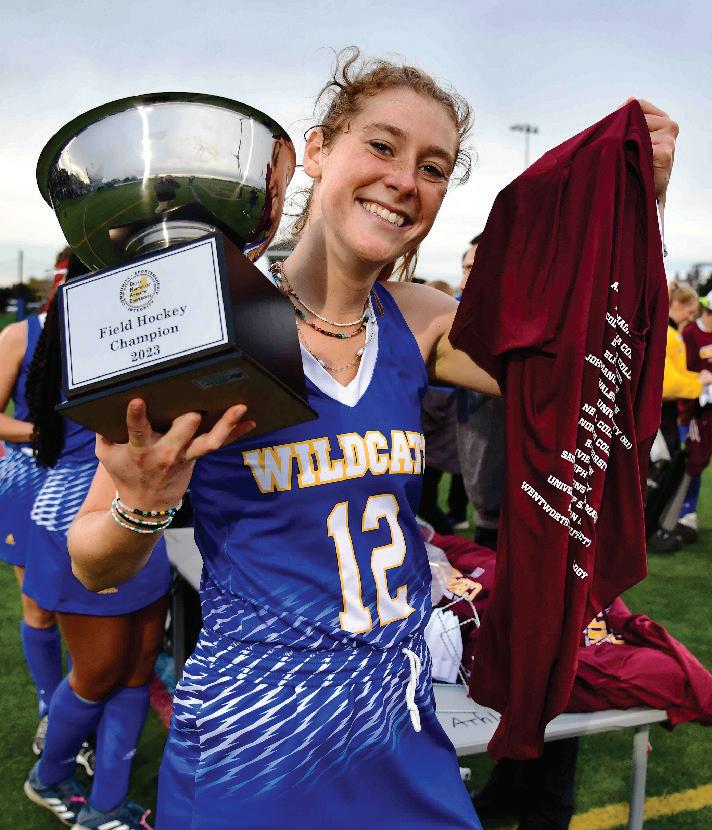
ELIJAH BROWN ’25 arrived on the Johnson & Wales Providence Campus in 2021 as a promising student who had languished at the end of high school. COVID-19 lockdowns brought months of gloomy online classes, and as a person with ADHD, he struggled to pay attention to a screen day after day, month after month. His grades suffered.
His senior year, in short, was not the greatest springboard to college.
“Teachers gave up during that time,” Brown, a junior from Winter Springs, Florida, says now. “Students gave up during that time.”
A first-generation college student far from home, trying to break out of an academic and social funk, Brown was exactly the sort of incoming student Johnson & Wales University had in mind when it launched a course called First-Year Seminar (FYS). He happened to be part of the first cohort to take the cross-disciplinary class, which aims to get new students up to speed on the resources, habits and attitudes they will need to succeed in college.
Faculty, staff and even administrators — including JWU Providence Campus President Marie Bernardo-Sousa, LP.D. ’92 — lead sections of about 20 students through their first, formative semester of college. With the seminar, JWU immerses new students in a cross-disciplinary academic experience that draws from every corner of the university, bringing faculty, chairs and deans from every college — Hospitality Management, Business, Health & Wellness, Food Innovation & Technology, and Arts & Sciences.
What Brown discovered during his First-Year Seminar was an approach to school that better suited his learning style. He got to know the Academic Success Center, explored the library and was particularly captivated by the study abroad program. He began 2024 by heading to Dubai for an internship at the Ritz-Carlton, a tremendous leap for a hotel resort management major who entered college in a rut.
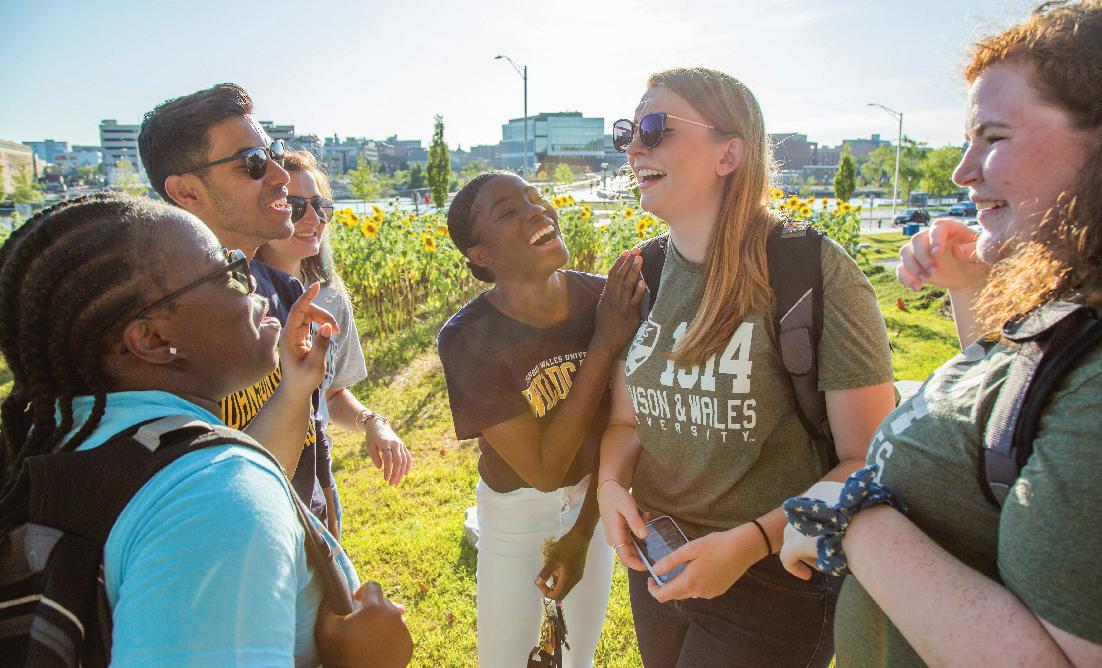 By Sam Eifling
By Sam Eifling
“I’m excited, I’m nervous,” Brown says. “But learning what you can achieve in college in the First-Year Seminar helped me shoot for the stars.”
THE FIRST SEMESTER of college is a crucible for just about anyone. But shrink it down even further, to the first several days. Students away from home for the first time, navigating the logistics of a big move, on top of the emotions of being the new kid in school (even as they’re surrounded by 1,200 other kids students equally as new) make the beginning of someone’s college career a crucial period.
“They have that first term — and maybe just the first couple of weeks — to figure out that they belong here,” says Kimberly Rosenbaum, the assistant professor in the College of Hospitality Management who’s in charge of FYS curriculum at the Johnson & Wales’ Charlotte Campus. “They have to have a sense of community in the first couple of weeks. If they’re going to stay and be successful, all these things we offer in First-Year Seminar are showing the way.”
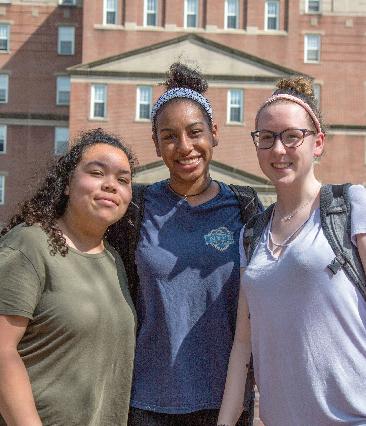
The First-Year Seminar is a one-credit pass/fail course that meets for 75 minutes once per week for the first 12 weeks of the semester, leaving students to concentrate on finals during the end of November and December. They’re graded largely on presentations, class activities, and submitted assignments meant to encourage students to reflect on their college experience, and to get them oriented quickly. Other universities around the country offer similar courses built to introduce students to their new institutions. It just happened, in JWU’s case, that the course was ready to roll for a year in which it would be needed like few other times in memory.
The seminar’s core curriculum aims to help students build the executive functions they’ll need to succeed academically. Students all take workshops on time management, counseling services, navigating spring class registration, and on connecting their interests and majors to careers. They also receive guidance on staying safe and secure both on campus and in the wider community. And — not to be overlooked — students get encouragement and immediate opportunity to make connections with classmates from other majors, to begin building the social fabric that, while it might not appear on transcripts, will largely define their college experience and memories.
“Offering a program like this is one of the most important things we can do for our new students coming in,” Rosenbaum says. “It’s an exciting time in your life. But, OK, now that I’m here, what do I do?”
The 2021 group, the pilot batch group of students in the seminar, arrived in a historically bewildered state. Erin Wynn, an associate
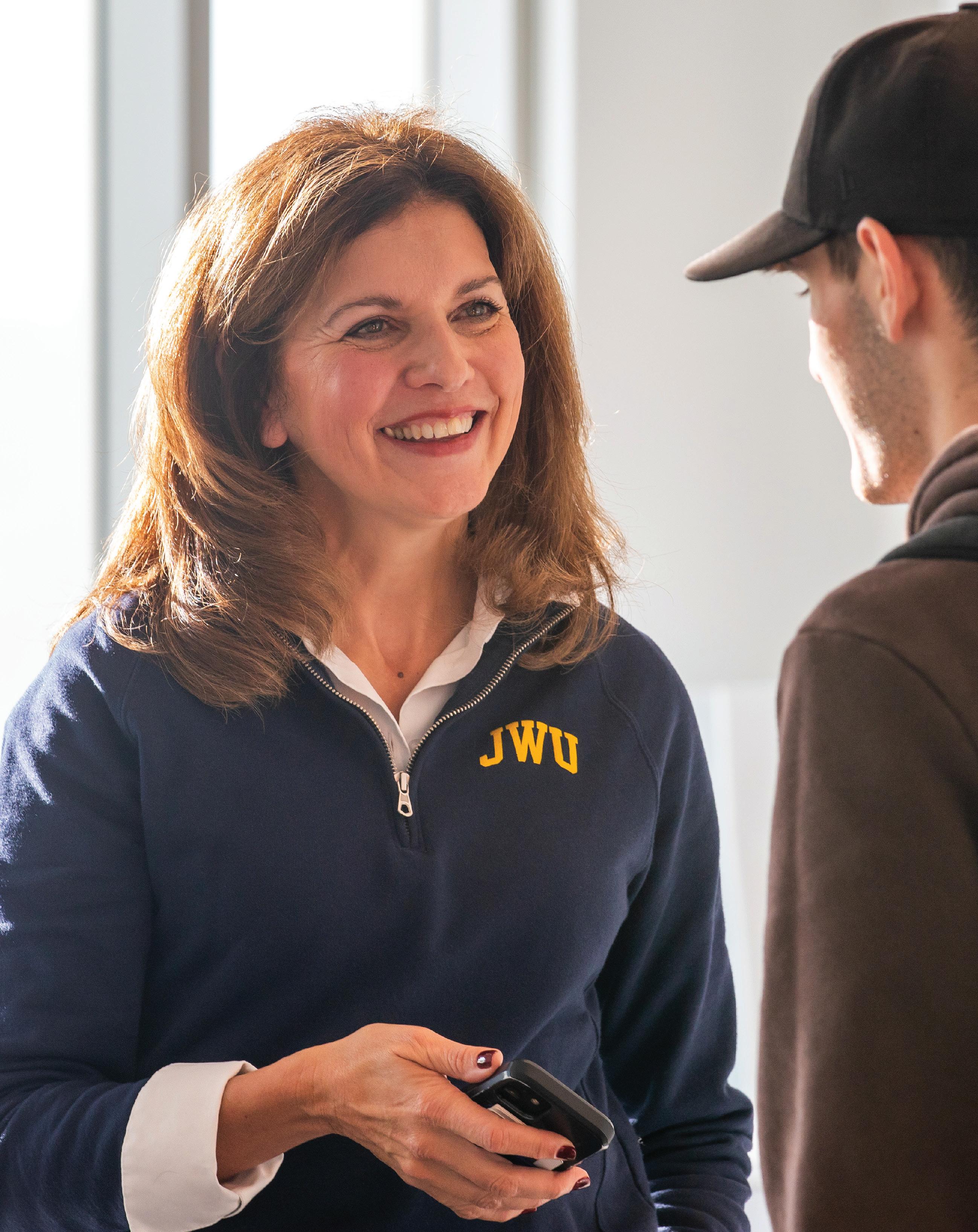
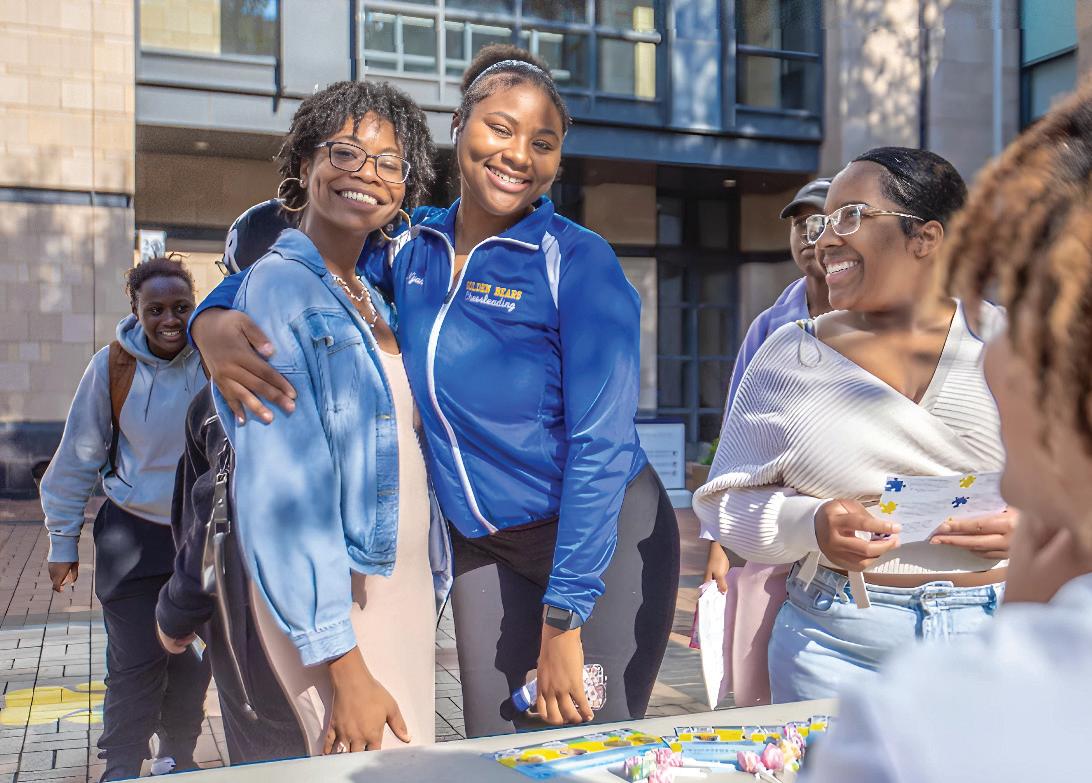
professor of English who directs the First-Year Seminar program at the Providence Campus, remembers recognizing a cohort in need of community and support. She wondered how some of the students she met that fall had made it to college. Some people thrive in an online setting, but many more do not, and studies on online and hybrid learning show that many of those students report higher rates of mental health problems and feelings of social isolation.
For the sorts of students drawn to JWU — which prepares a significant number of students for careers in hospitality and other highly sociable fields — a year or two spent in Zoom rooms five days a week might have been a particularly challenging tough fit and it showed. “They were lower-functioning in many ways,” Wynn says. “Even socially.”
Wynn could empathize. Years ago her own high school grades were poor enough, she says, that a guidance counselor tried steering her away from college altogether, despite her aspirations to be a teacher. Meanwhile her family, while more encouraging, didn’t know how to help her advance her academic career. When she went to college interviews, admissions officers were mildly shocked to learn that she had driven herself and come alone.
“Who we are in high school doesn’t dictate who we’re going to be the rest of our life.”
Those bumpy months gave her a perspective on how critical the transition into college can be, for kids who are thrust into young adulthood. “Who we are in high school,” she says, “doesn’t dictate who we’re going to be the rest of our life.”
The lessons she picked up in college still apply to the 18-year-olds stepping onto campuses for the first time in the 2020s. The key message Wynn offers to her students in FYS: You’re now in charge of yourself. Professors aren’t going to chase you for assignments. Nobody is going to check in.
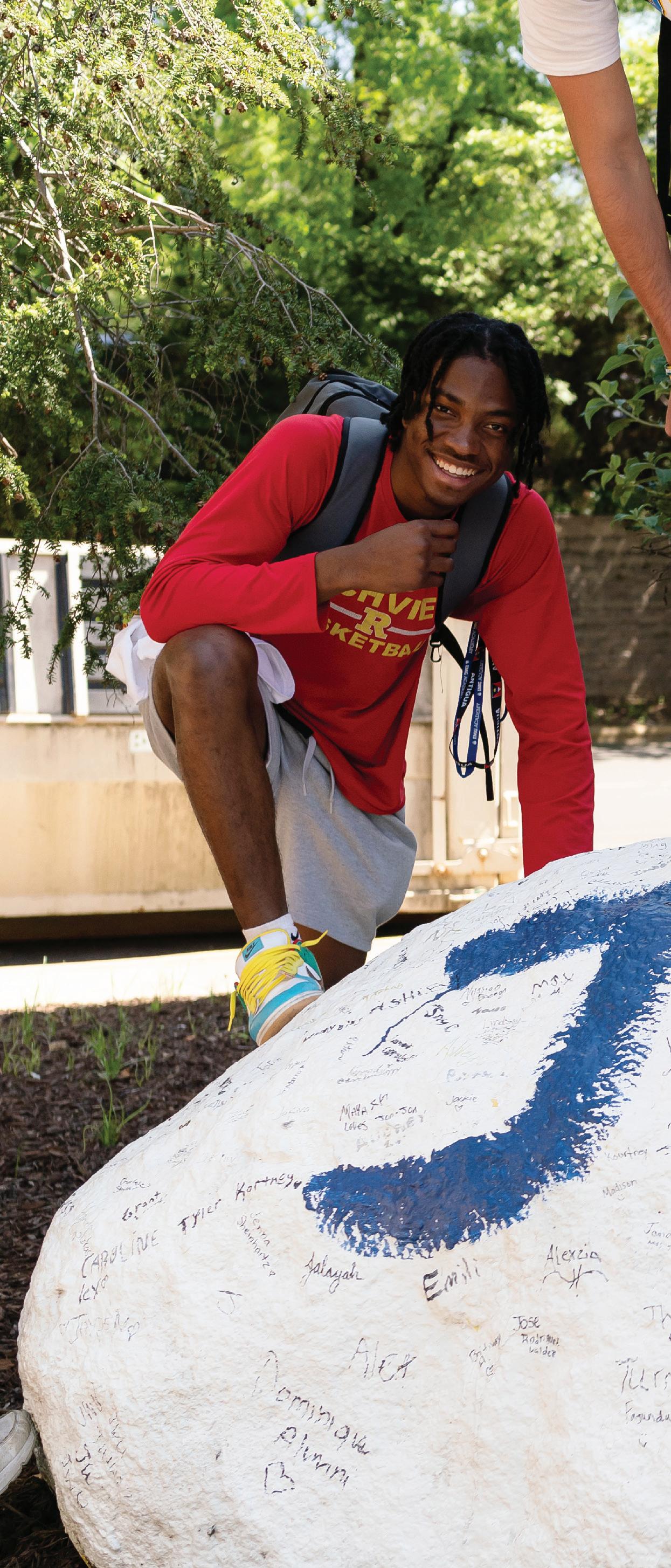
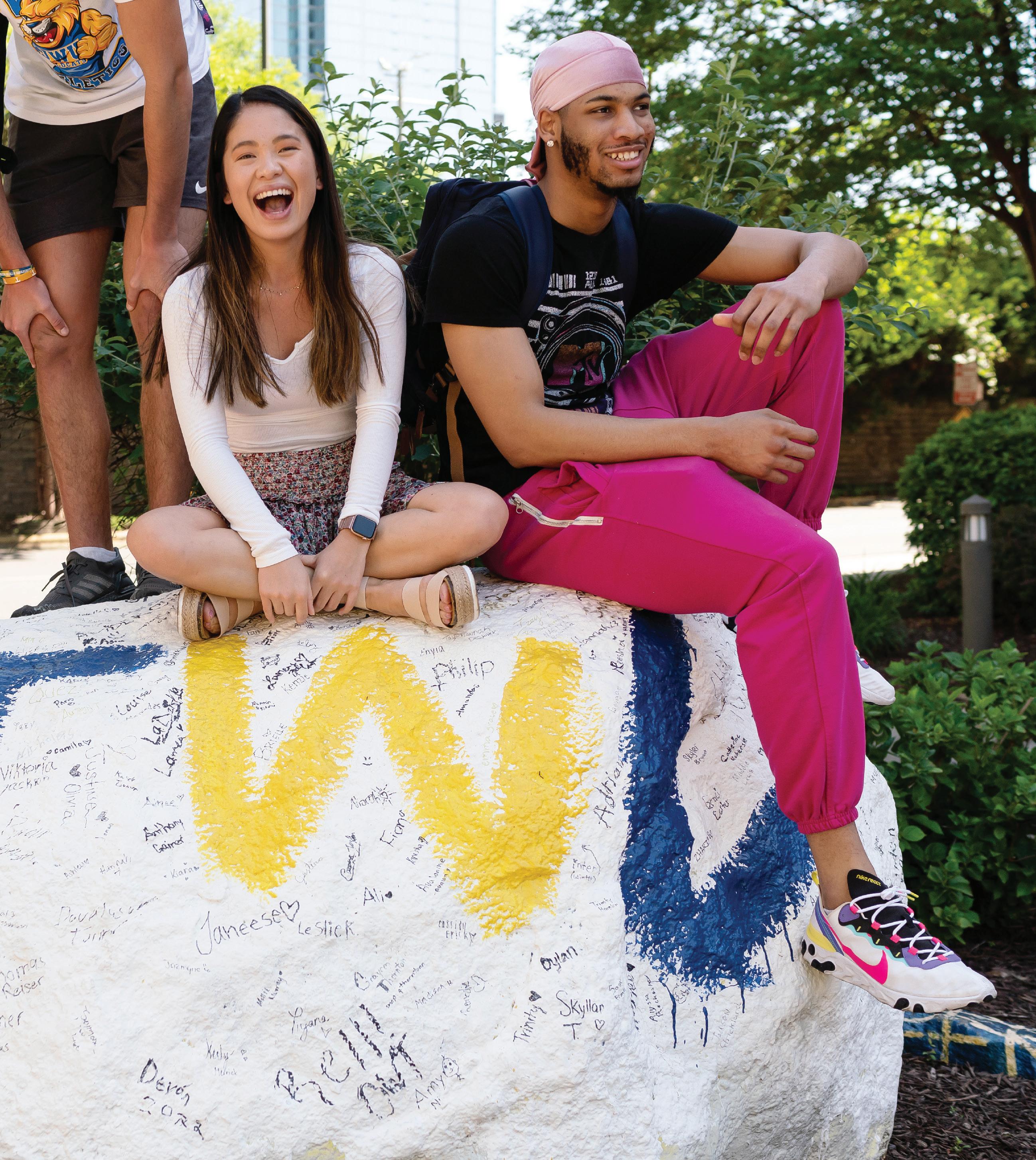
Brown, one of her students from those initial pilot groups, says he learned from Wynn the importance of making wise choices about his time and his energy that have helped him in the years since.
“Don’t be afraid to tell people no and tell yourself yes,” Brown says. “We’re like an iPhone — we can go for only so long before our battery dies out. When you take time for yourself, you can actually manage your time. Once you recharge your body and mind, everything else is going to come into place.”
BERNARDO-SOUSA remembers the cohort of FYS students in the fall of 2022, the program’s second year, as still struggling to shake off the hangover of remote learning during COVID-19 lockdowns. Their first instinct was to focus on their own well-being. Classes were quiet. The JWU campus president encouraged students in her section to think differently about their school, as a place where they could form relationships and find a community.
In a word, she wanted them to make friends.
“We help students build connections and understand the JWU culture,” Bernardo-Sousa says. “By doing that, we were confident students would have a better understanding of how to navigate the institution, to build connections with educators and administrators.”
The First-Year Seminar feeds into existing events that also nudge students toward finding their network. At one such event, Student Involvement Fest, student clubs and organizations gather in Gaebe Commons to answer questions and invite first year students to consider, say, a capella, ski club, food rescue, or esports — or any of the other hundred-odd groups that enrich a college experience.
Students are also sent out on a scavenger hunt, fanning out across campus in small groups, then presenting their findings to their fellow classmates. The goal is to get more than one view on the likes of the student health and counseling services, campus security, and the academic success center. Everyone brings back different views about such a seemingly familiar landmark as the library. Did you know they’ll help you write and proofread papers? That you can hang out with friends there, knock out some research, and even meditate there?
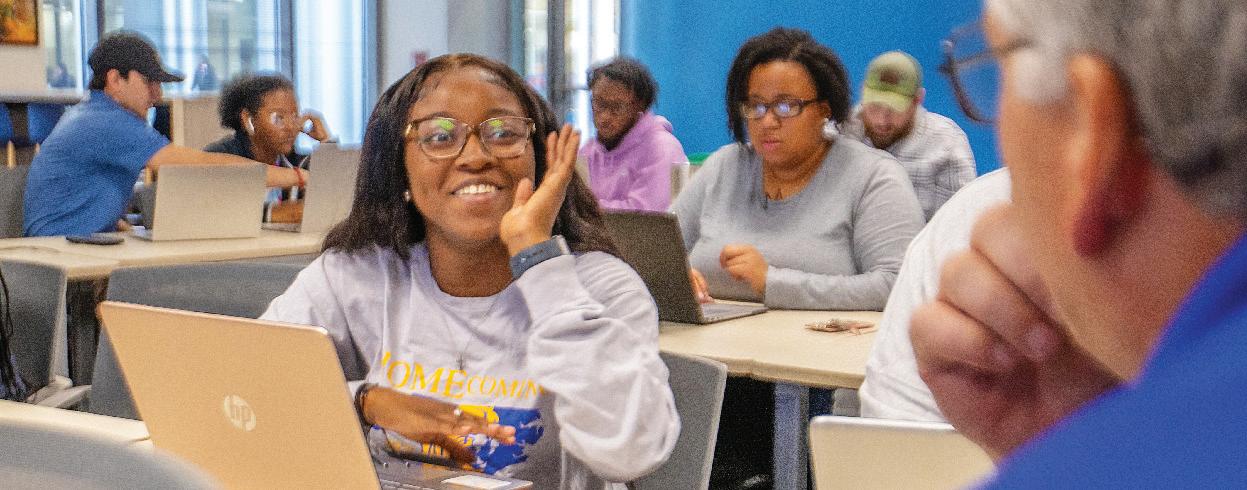
THE FALL OF 2023 brought the third, and largest, iteration of First Year Seminar. The program that just two years earlier was a three-section pilot phase now embraces every incoming student on campus. The latest cohort, Wynn noticed, seemed more prepared than their predecessors. “The ’23 class went to their proms,” she said. “They spent their senior year in high school. They were ready and excited.”
Even in the best of times, though, the early weeks are key to a student’s survival success on campus and retention at the university. Wynn reads her students’ early assignments — in which they reflect on their overall state of being — and watches for hints that they’re not feeling supported. A student writing that they’re not making friends or feeling unhappy is a cue for the seminar instructors to reach out, or to strategically re-seat that student near a chattier classmate.
The goal is to keep a student from feeling left out or falling behind early. No one wants to be playing catch-up right before midterms.
“We help students build connections and understand the JWU culture.”
“What we found, with students who might struggle academically, is that they think everyone knows all the answers and they just don’t,” Bernardo-Sousa says. “What they see firsthand through the conversations that happen in the seminar class is that no one has all the answers. Part of college is learning about yourself and learning to advocate for yourself, and taking advantage of the resources that are there.”
For Bernardo-Sousa, the greatest epiphany of leading the FYS sections, listening to the incoming students, working with them on their goals and reflections, is that they’re all trying their best to succeed. And they’re learning about themselves in real time. When they notice they didn’t write an outline for their term paper, but did scroll TikTok for two hours, they can share that realization in a low-risk classroom setting.
“Students have been comfortable coming to me and saying, ‘I’m struggling right now — can you help me? I don’t know what to do next,’” Bernardo-Sousa says. “Really, I’m just a conduit to the resource they need. But the fact that they’re honest, and that they’ve made that connection, has been gratifying for me, on a personal and professional level — to see a program that we had hopes for achieve that kind of result.”
“They come in afraid,” Wynn says. “JWU is a teaching school. We are not scary people. We’re here to help them learn, maybe in a different way from what a big university might offer.”
The chance to tap into the wider cultural and food scenes of Charlotte was one of the reasons James N. Madden ’27, an incoming psychology student, chose JWU. Coming from Rosman, North Carolina, a couple of hours west of Charlotte, Madden found that FYS helped ground him in a new city, with new opportunities.
The instructor in his section, RJ Kilgore, director of the Academic Success Center on campus, not only gave tips on how to build better study habits and to get involved with student clubs, but made suggestions on the best Uptown restaurants and museums to visit.
“He came off as a really cool, down-to-earth guy, someone you can go to and have conversations with,” Madden said. “It’s literally having a friend who works on campus. He knows we’re all coming straight out of high school and goes out of his way to make people feel comfortable.”
Seminar instructors nudge students to take advantage of the various activities that, in fact, their student fees support. For instance, in September, that most impressionable time of the semester, JWU rented out the venerated Roger Williams Zoo on a Saturday night. Students took buses, scoped out tortoises and wallabies and boas, and got to wander the grounds, bumping into professors and classmates — and for the rest of the semester, Wynn says, students reminisced about their big night at the zoo.
At her first weekly seminar, Rosenbaum looks around her classroom and does her best to read the room. Some of the students are arriving after a six-hour culinary lab, an endurance test they’ve never
experienced previously. Others are simply doing their best to conceal their first-week insecurity.
By the second week, people are thawing a little. In the third week, Rosenbaum has found, everyone is keen to get to know one another. After a class trip to Charlotte’s Levine Museum of the New South, Rosenbaum gave students the option to write a reflection on their experience or to share it verbally on a walk back to campus. She was gratified to find a shy student from her seminar chatted the entire walk — an unlikely art critic had just been unlocked.
“It’s great to watch the ones who are on the outskirts open up,” she says. “Your goal, really, is to get them acclimated, to get them to understand the community and also everything outside of JWU.”
Over the weeks, students adapt, becoming more professional, more assertive. They consider their etiquette, their personal brand. They gain fluency in the college itself. They learn how to manage time and tasks, to prioritize their work against their social lives, and to articulate their goals and ambitions. Many of the students say their goals revolve around losing weight, and Rosenbaum tends to follow up with a question about how much sleep they’re getting or not getting. She brings water to class and snacks. A bag of oranges was a huge hit. It can be that simple.
By the late fall, students have bought into this new community, and feeling secure, are ready to give back. Once that happens, you can get real magic.
Every December, Rosenbaum works on a big event called Project Gingerbread, in which students and student groups come together to celebrate the holidays and decorate 300 gingerbread cookies for staff at a children’s hospital a couple of miles from campus. She mentioned to her FYS that she needed a Santa, and after class, a culinary student let her know, in a most low-key fashion, that he might be up for it — “you know,”
“Offering a program like this is one of the most important things we can do for our new students coming in.”
Rosenbaum says, “that cool kid who doesn’t want anyone to know he’s fun.”
On the day of the event, the Friday before finals, campus groups went all-out: making cards, making ornaments, decorating stockings, dishing up Irish lamb stew and spinach artichoke dip, handing out hot chocolate, running a bingo game. Fifteen students dressed as elves. People decorated cookies in shifts. And her volunteer first-year student Santa, who was committed only for an hour of ho-ho-hoing, stayed in character for the entire event.
When the professor finally had to ask him to change out of the costume, the student let her know, as casually as possible, that he wouldn’t mind playing Santa again next year. JWU
To support Scholarships & Financial Aid visit giving.jwu.edu
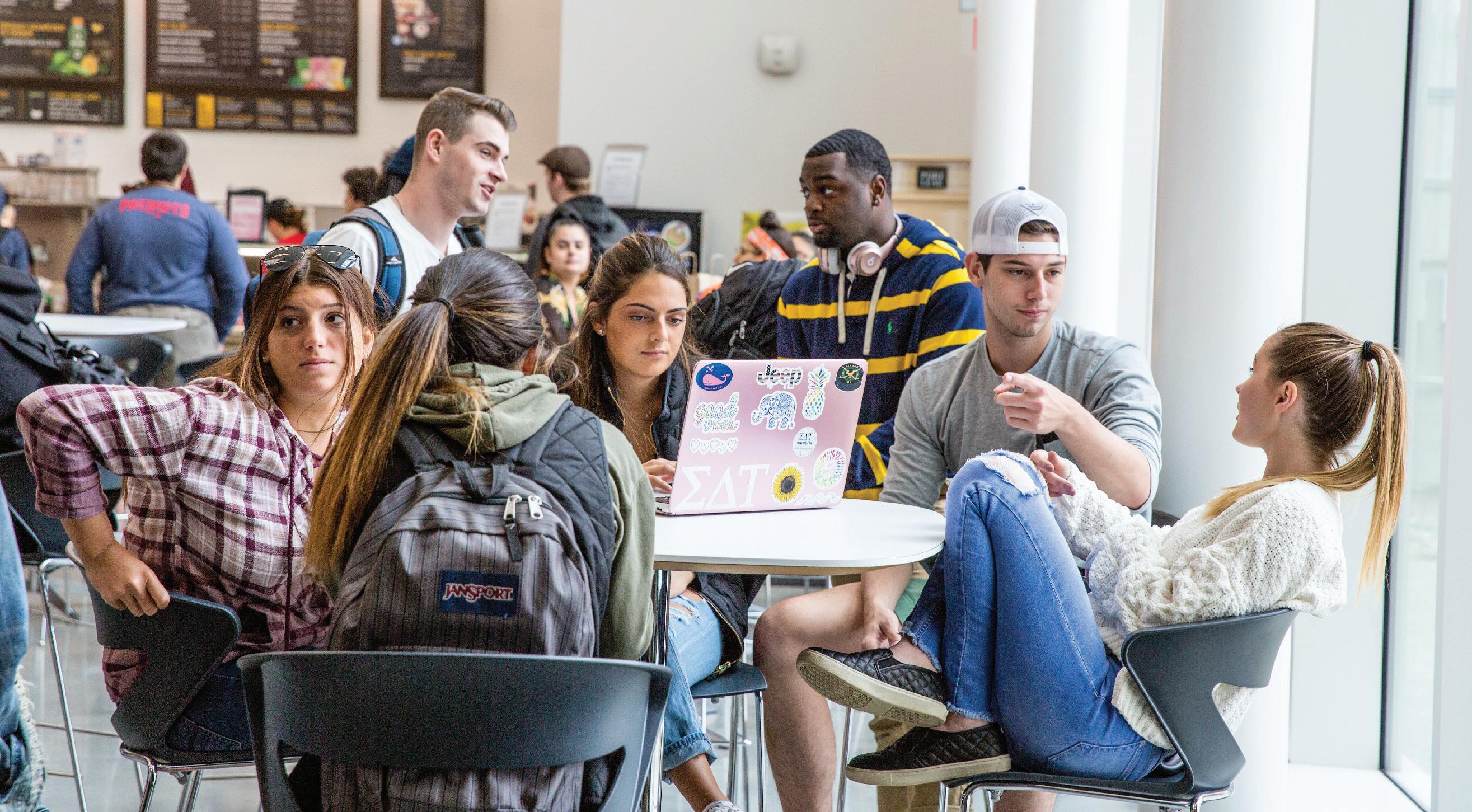
IT’S JUST AFTER NOONTIME AT ROCK STEADY BOXING
in Rhode Island and dozens of punching bags and mitts hang from the ceiling in tidy rows around the oversized gym. Phrases on the off-white walls including “Small changes can make a big difference,” “Can’t stop, won’t stop,” and “In this corner, hope,” provide motivation, along with the addictively high-energy music. Today, it’s the Jonas Brothers with the relentless beat of “I’m a Sucker for You.” Two dozen participants in maroon Rock Steady T-shirts follow session leader, Carolyn Kosiba-Quiterio, as she encourages them to count out loud, and she means LOUD.
“One, two, three, four, five,” and on up to “ten!” then all over again; ninety minutes of counting, stretching, leg lifts, using a chair to balance on one leg then the other, followed by sessions with the bags, all with a goal of building body strength.
Geraldine Gibson ’25 OTD, is assisting, a dynamo in a traffic-cone orange T-shirt and black exercise pants, her ponytail flying from side to side. She darts around the room, encouraging the 20some Parkinson’s clients (called athletes here) and their caregivers, helping steady them, showing how to hit the punching bags as hard as possible, and the best ways to use the mini weights.
Rock Steady Boxing (RSB) is a gym that offers exercise programs for people with Parkinson’s, a neurogenerative disorder with symptoms that include problems with balance, swallowing and gait. Non-contact boxing-inspired routines can dramatically improve the lives of people with Parkinson’s. And while symptoms vary from person to person, boxing can also help with the invisible problems of Parkinson’s lurking below the surface such as sleep and mental health issues, or unregulated blood pressure.
Gym owner Kosiba-Quiterio was interested in forming collaborative partnerships with area universities. “It gives those who work with Parkinson’s patients a greater awareness of what it’s like to have the disorder,” she explains. In JWU’s College of Health & Wellness (CHW), students in the Occupational Therapy (OT), Physician Assistant (PA), Master of Public Health and accelerated nursing degree programs receive real-world experience and course credit for placements such as the one at Rock Steady Boxing. For example, CHW students might work alongside the licensed occupational therapists at the Rhode Island Clinic, for uninsured and low-income residents; or at Oasis Recovery & Wellness Center, which serves adults in recovery from mental health and substance use issues.
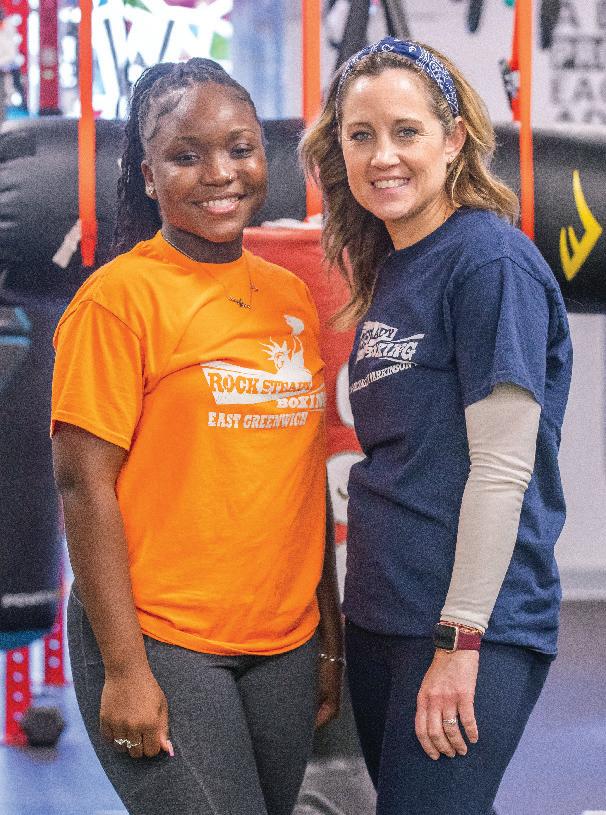
Gibson is working on her doctorate in Occupational Therapy and has already spent 30 hours with this group doing her level 1 field placement. Sessions include strengthening and mindful techniques such as yoga and work-around strategies that participants can take home and use after the sessions. She’ll be back at Rock Steady full time this summer, completing her level ll placement as part of JWU’s College of Health & Wellness’ fieldwork placements. For Gibson, helping these athletes has been inspirational. “I learned you can do anything,” she says. “Not to be a cliché, but don’t be held back, push through.” Gibson also relishes the challenge of graduate work. “I love the JWU program. It’s so hands-on and there’s nothing that faculty can’t help you with.”
“The mission of our community placements is to educate the students in a variety of real-life settings, but also to give back,” says Rebecca Simon, Ed.D., CHW’s associate dean. “We want to become a part of the community’s fabric and to give them as much as we gain from them. We want the community to feel that JWU’s College of Health & Wellness is a resource for education, advocacy and support to those who need it.” From the beginning, the emphasis has been on that bilateral relationship, she says. “The end result is betterment of life for those in the community and an exceptional education for our students.” In the three-year OT doctorate program, the first two years are a combination of classroom time and fieldwork, some at community sites and others at more clinical locations such as hospitals. Their third year is all experiential, with rotations in a medical setting or one that’s more nontraditional, like Rock Steady. After three years, students have earned a doctorate, take the final exam and become nationally certified. From there, alumni have gone on to careers in skilled nursing, hospitals and outpatient clinics.
ANOTHER EXAMPLE OF COMMUNITY OUTREACH is JWU’s partnership with Brown University’s Pathways to Medicine program, where Physician Assistant students mentor local high school students for one semester. The program introduces the possibility of health science careers to teenagers who might not have considered the field or had exposure to it. It also helps smooth the path as these students transition to college. They form strong bonds with their college-level mentors, receive support as they
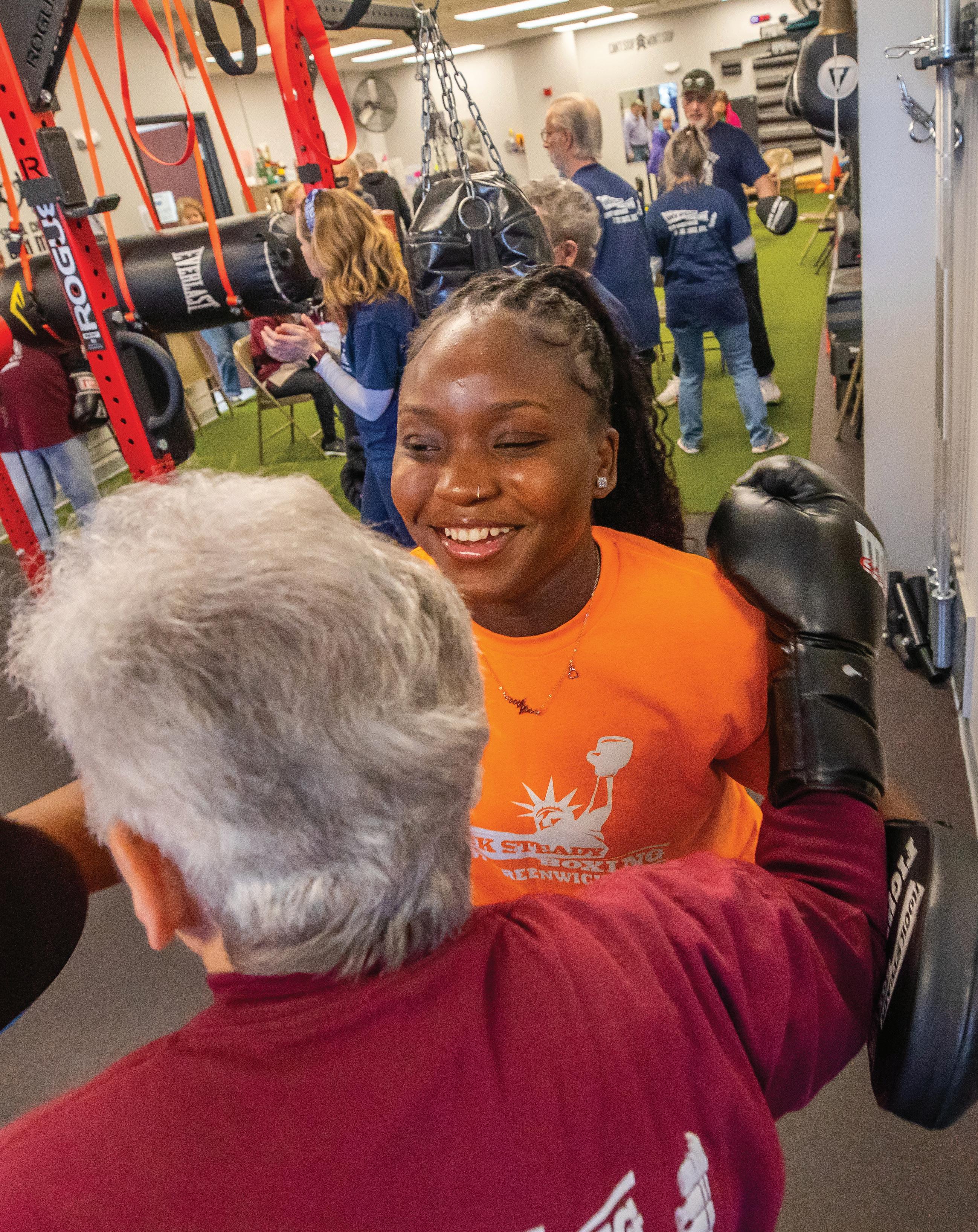
apply to college, learn about the professional school application process, and strategize pursuit of their healthcare career goals.
Bridget Healy ’24 M.S.P.A.S., is a Pathways to Medicine representative who attends the program’s classes with its participating high school students; she also mentors three of them on a one-on-one basis. Healy helps them refine topics for their in-depth final projects. One picked schizophrenia, another focused on pancreatic cancer. They investigate the origins of their topic’s medical condition, the risk factors and symptoms. Students learn how to take vital signs and a patient history, as the PAs guide them through their research and assist with clinical skills workshops. If their project takes the form of a poster, it may show the etiology of a medical condition.
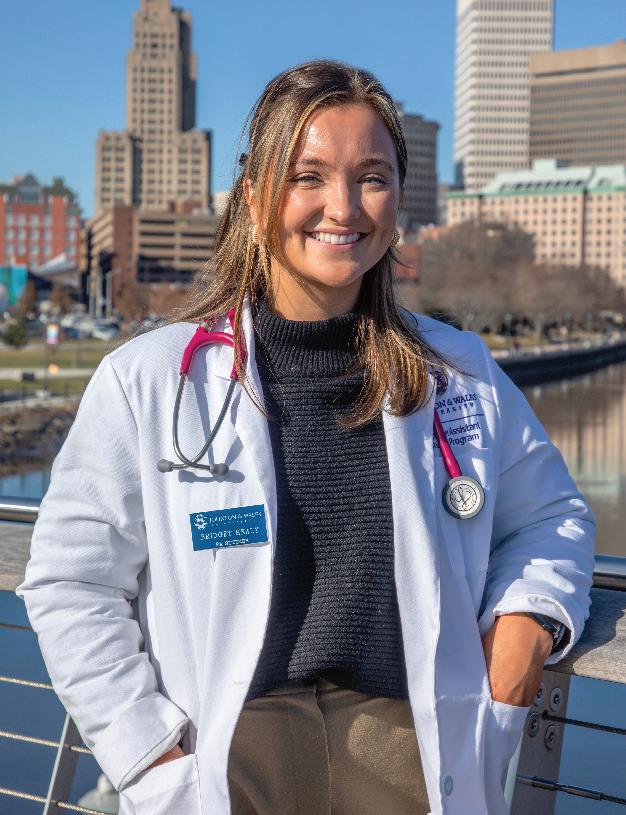
“In the case of pancreatic cancer, for example, there’s a description of the disease, and its origins. Those would be listed down one side of the poster,” Healy says.
“Then the risk factors go down the other side, along with symptoms, as well as questions to ask to come up with a diagnosis, such as what else could it be? Is it appendicitis? And what are the potential treatments? Finally, what’s the prognosis?”
“We give them the tools to do evidence-based medicine using a scientific database and show them how to find reliable sources. That’s the main goal,” Healy says. “We also host days that are like speed dating; we’re micro dosing them with these different specialists.” Students may meet with a pharmacist, nurse practitioner or vascular surgeon, for example, where they have the opportunity to ask one-on-one questions about the specialty. Another session is CPR and suture day, where students learn the basics of resuscitation, as well as how to stitch up a wound. Cadaver day is hands-on in JWU’s anatomy lab and focuses on the heart, lungs and other main organs of a body that have been donated to science, taught by first-year PA students.
“Kids leave saying things like, ‘I couldn’t believe that’s what the lungs of a smoker look like.’ It’s really cool when you think they’re 14 or 15 years old,” Healy says. “The session emphasizes how to treat the body with ultimate dignity. JWU is big on the humanistic approach.” As proof of how Pathways emphasizes the importance of mentoring, Healy recalls a student who messaged her about a project on the different types of hypertension. She was having a hard time organizing her presentation. “I can’t imagine being in high school and trying to figure that out,” says Healy. “She asked for
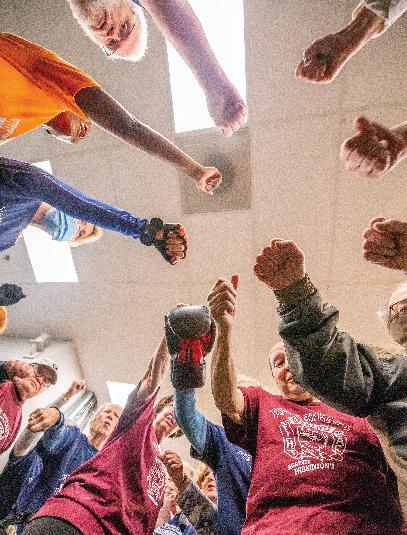
my input and it was nice to be able to help her. Being involved has turned out to be more of a reward than I ever imagined.”
The semester-long program culminates with presentations in a symposium setting. Students present projects to their mentors, other students, as well as family and faculty members, who have a chance to see the culmination of their hard work. At graduation, Healy will pass the torch as coordinator to the next JWU PA. It’s a legacy and a goal of the program, which encompasses people who represent diversity and ex-
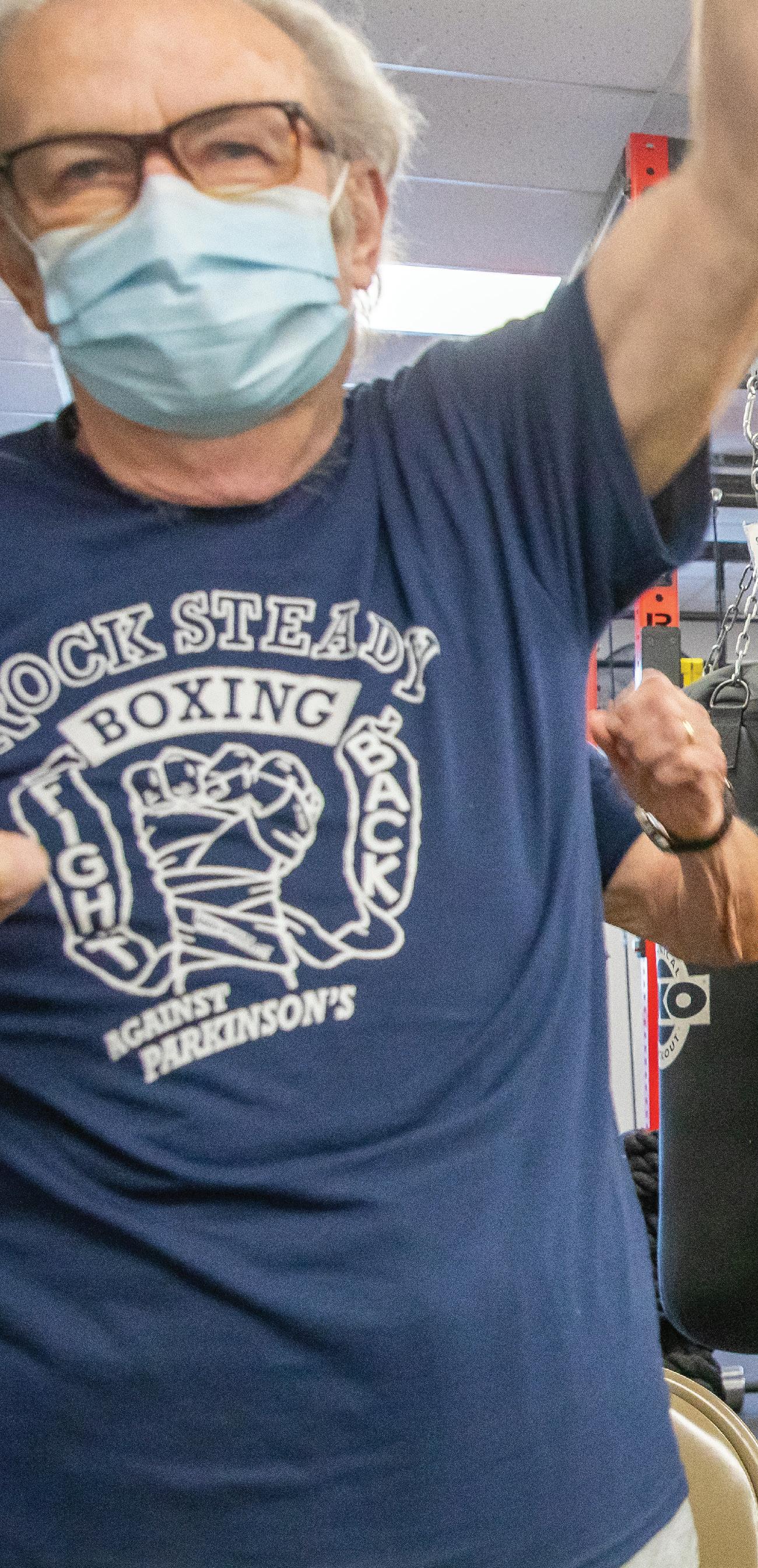
pands that diversity throughout the PA population. According to Healy, “It’s a full circle movement for me.”
BACK AT THE BOXING GYM in East Greenwich, the noon class is winding down. Before everyone says their goodbyes, however, they gather in a circle and offer fists together like spokes in a wheel as they chant, “One, two, three, Rock Steady!” “We do that at the end of each class,” Gibson explains. “We’re like a team.” JWU
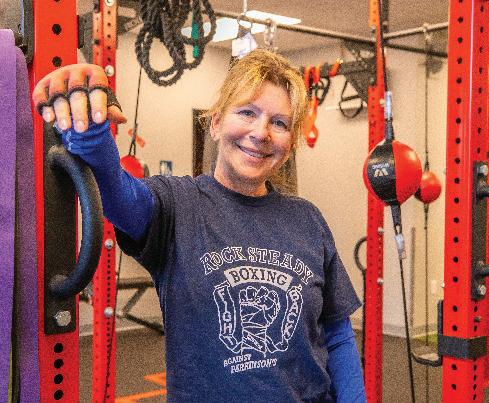
(Left) Rock Steady Boxing Gym owner Carolyn Kosiba-Quiterio was interested in forming collaborative partnerships with area universities, giving students real-life experiences.
(Below) Gibson ’25 leads a no-contact boxing-inspired routine that can dramatically improve the lives of people with Parkinson’s.

July 21, 2011. For the third week in a row, George Ortiz Jr. ’23 and his family are making brown bag lunches to hand out to people living on the streets. Each includes a sandwich, chips and an apple, in a bag decorated with a color drawing by one of his young children. Ortiz posts a photo on his blog of the week’s provisions — a small bag of Roma tomatoes, head of lettuce, Oscar Mayer ham and salami kits — laid out on their table. He writes, “We are onto something.”
Fourteen years later, the Elisha Project has shared more than 20 million pounds of rescued food, plus household goods, hygiene products and furniture to communities from New England to Texas, Puerto Rico and Guatemala, and as far as Ukraine, Cabo Verde and South Asia. Their outreach has grown to include pop-up street kitchens, bodegas and drive-through share markets, in addition to regularly sending supplies by the truckloads to food banks, schools, hospitals, churches and charitable organizations. The emphasis is on fresh fruits and vegetables, meats and perishables hard to come by at food banks, and culturally sensitive foods. Everyone, from his team behind the scenes and network of partners, to the many millions served, is now part of the family.
As a kid growing up in Brooklyn, Ortiz found his refuge in school. He was a voracious reader, taking the train every week to his grandmother’s house, always with a quarter to buy a book on the way. The eldest of five, he was a father figure to his siblings almost as soon as he could talk (“I never saw myself as a little kid,” he says), while his young mother did her best to provide. “I grew up on welfare, food stamps,” says Ortiz. “School was a place where I didn’t have to have the most money, I just had to get good grades.”
Tragedy struck as a teenager when his 7-year-old brother died and his mother was arrested for neglect. Ortiz lived with his grandmother at the
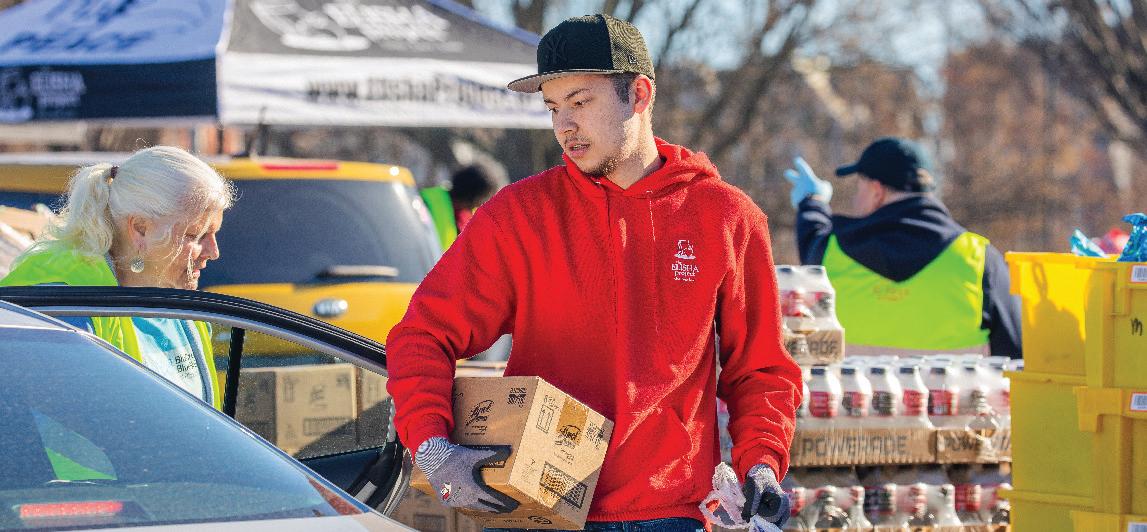
time. “She was a wonderful mother who fell on hard times,” says Ortiz. “She ended up dying at 40 years old in prison. When you think of all that, I should be a different person.” Instead, he doubled down on his determination to create a different path for himself. “I knew there was more to life than what you are born into.”
His inherent discipline drew him to the Marines, where he graduated top of his class and served 15 years, retiring with a disability after serving in Desert Storm. Living then in California, he founded a highly successful customer data research company with several Fortune 500 clients on its roster before he moved to Rhode Island with his wife, Carrie, to take care of his ailing grandmother. Despite his childhood vow never to be poor again
— “I wanted nothing to do with poverty, nothing” — the cross-country transition strained the company, and they lost the business.
By Nicole Maranhas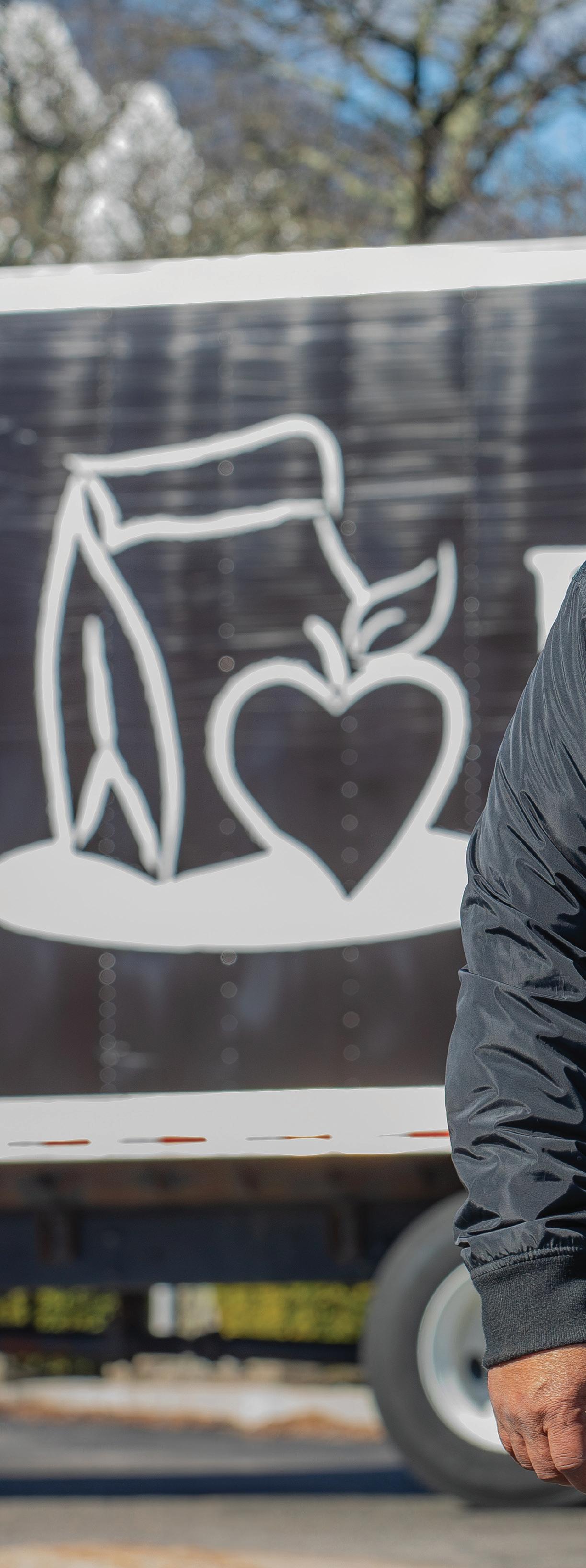
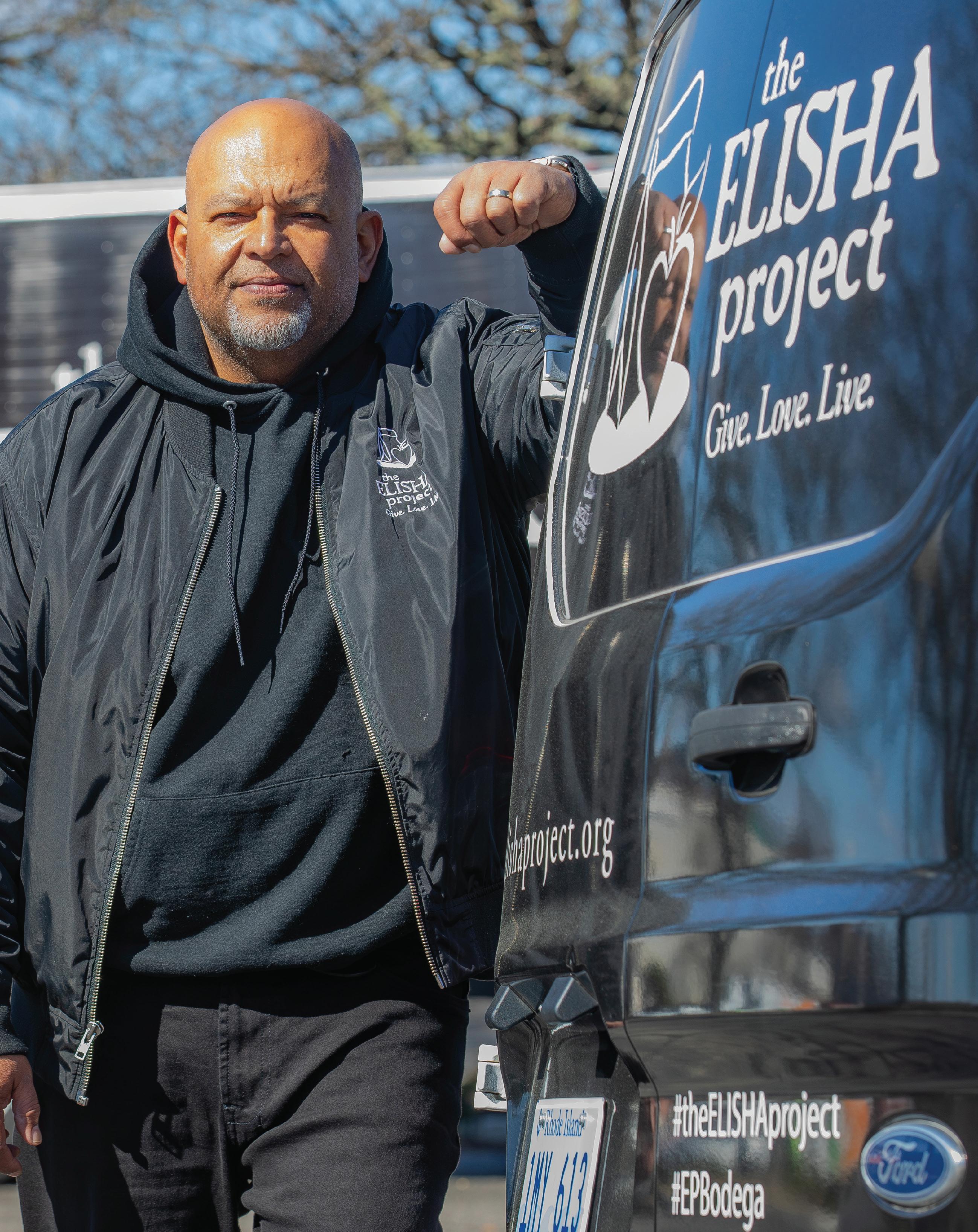
With a young child and another on the way, Ortiz and his wife found themselves suddenly desperate while he struggled to find a new job. “I was trying to take any job, sweeping floors, I didn’t care.” At the lowest point, they found that their previous income disqualified them from accessing food banks and other local services. Ortiz says, “I think a real ‘aha moment’ for me was one lady asking me, ‘What did you do with all your money?’ I remember the shame and embarrassment I felt.”
As soon as they found their footing — a hard-won effort during which Ortiz also returned to school to earn a master’s degree in divinity while working full-time — the couple was determined to give others the help they had not been able to find. “How much money do we have?” Ortiz remembers asking Carrie. “Forty-eight dollars and fifty cents,” she told him. It was enough to make 24 bag lunches. Ortiz lights up when he recalls, “That’s how we got started.”
The Elisha Project is named for the biblical prophet who dug a valley full of ditches in faith that they would fill up with life-saving water. It is the story Ortiz lives by: “Do what you can with what you have.”
Scontemplative students I have ever had,” says Christopher Westgate, Ph.D., a media and communication studies professor in the College of Arts & Sciences. “His work was honest and thoughtful, and he encouraged his classmates to think critically.” Westgate was in the audience when Ortiz was honored by the Rhode Island Foundation with its 2023 Community Leadership Award last year. “I was so proud to see him accepting that award and being recognized for all the work he has done,” says Westgate. “He is a selfless person; he has given of his time, talent and treasure in so many ways.”
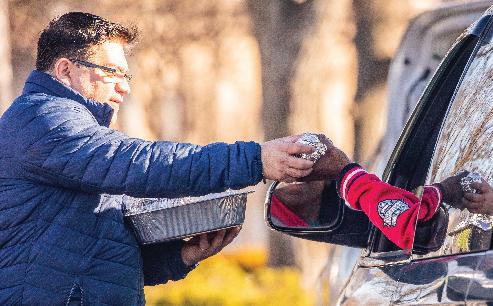
TORYTELLING IS MY PASSION,” says Ortiz, a talented photographer and filmmaker who has documented the Elisha Project from that first blog post. Even as his outreach efforts skyrocketed, he was inspired to go back to school through the Veteran Rapid Retraining Assistance Program (“I love being a student,” says multi-degreed Ortiz) to further his self-taught skills. The university appealed to him for its experiential learning emphasis and inclusive community — “they meet students where they are,” he says — as well as for its longtime support of Elisha Project, where for years faculty chefs had donated time and leftover bakery goods. As a media communications major, Ortiz graduated magna cum laude. “He was one of the most
This includes looking out for fellow Wildcats, through various collaborations between the university and Elisha Project over the years. Diane Riccitelli, director of off-campus student services, currently works with the Elisha Project to arrange for regular deliveries of hygiene and household products for any students that need them. “Our first shipment was almost 300 different types of products — deodorant, feminine products, detergents, soap, first aid kits — that students can grab off the shelves, no questions asked,” says Riccitelli, who coordinates with multiple JWU departments to distribute the shipments. “If students are worrying about meeting their basic needs, school becomes challenging. It’s important that we are able to help support them.”
No-questions-asked is key for Ortiz, who has never forgotten the days when he was the one who needed help. Case in point: Saturday share markets, where hundreds of cars line up hours in advance to receive fresh foods and boxes of household and hygiene products. “Some people are averse to that, feeling like people are going to take advantage,” says Ortiz. “We will help anyone who has the audacity to ask.” The drive-through markets launched at the start of the pandemic, a period that tripled the Elisha Project’s growth. Realizing shutdowns would make it difficult for people to find help, Ortiz
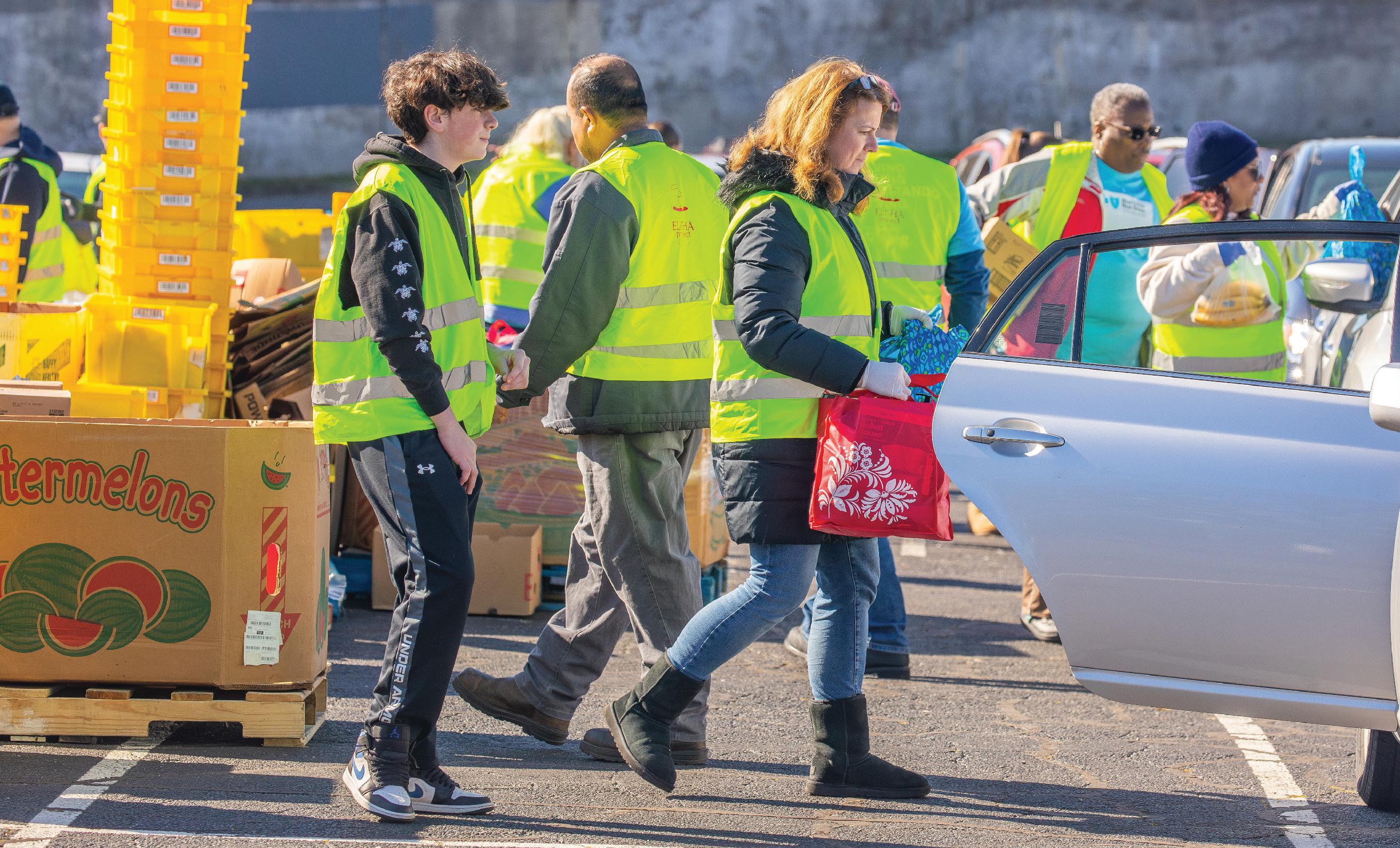
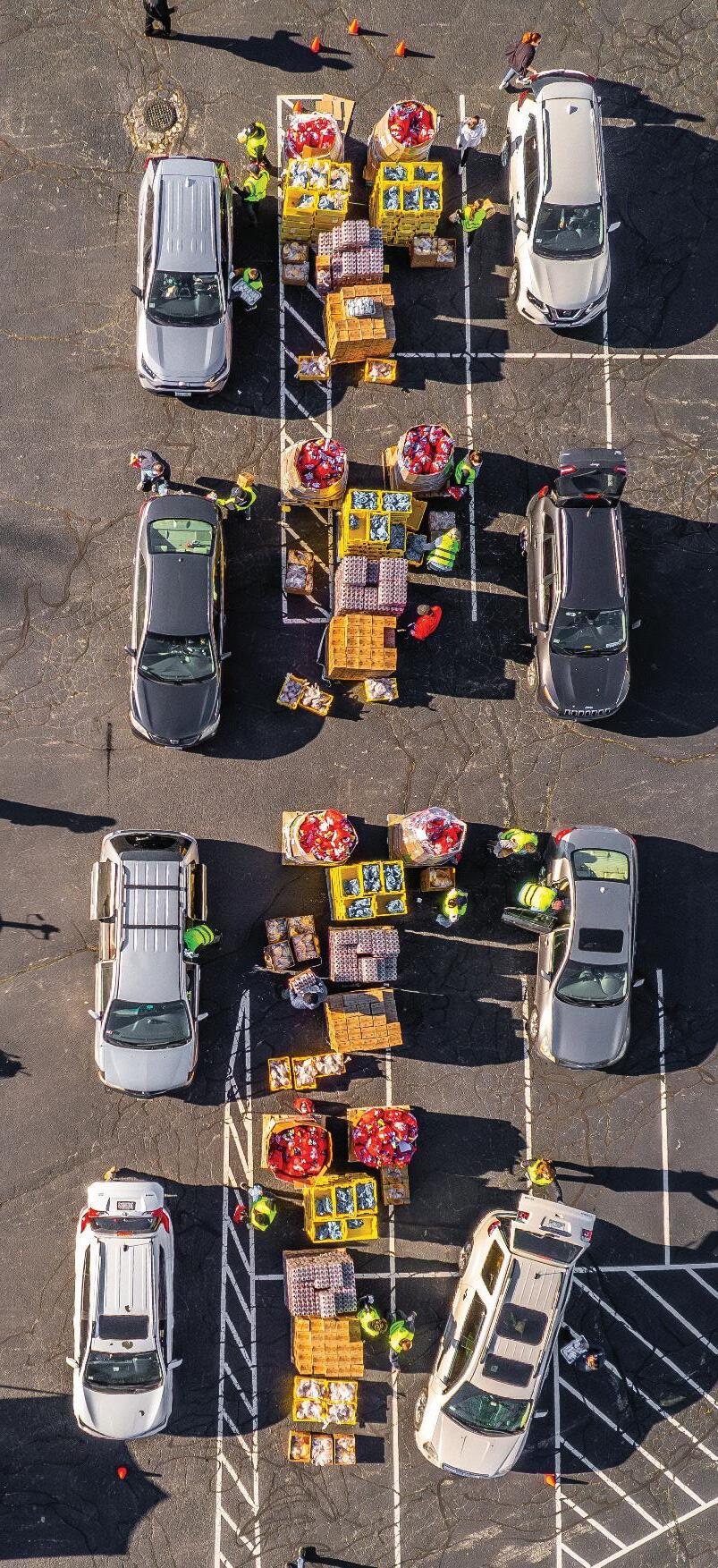
worked with Mayor Donald Grebien to set up a warehouse in the old Apex department store in Pawtucket, where he could receive and prepare shipments for distribution. The new space meant that Ortiz could go beyond food, and retail and wholesale giants such as Costco now send furniture, household goods or even appliances they can’t sell (Ortiz pays shipping) for the Elisha Project to donate to organizations that serve families in need, locally or afar. Among the millions helped by his efforts, fellow veterans and their families are an important part of the Elisha Project community.
His ever-growing outreach is made possible by an army of volunteers, corporate partners and community advocates, but especially by his own family (he is now father of seven) and nearly 24-7 Elisha Project team.
This may only be the tip of the iceberg. “I’m a dreamer who executes,” says Ortiz. “Some people are always dreaming, never getting anything done. In my life, I’ve had to be the dreamer, the visionary and the grunt who got the work done.”
PLOT TWIST. “My focus isn’t on the person receiving the bag,” Ortiz says, referring to the brown bag lunches he still hands out every week. “My focus is on, how do we change the people handing out the bag? If we change those people, that’s how we solve food and housing insecurity.”
This is one of the most powerful impacts of the Elisha Project. More than 125,000 volunteers have been part of the organization since its inception, a number always growing. You might find them singing along to Stevie Wonder while sorting items in the warehouse, or loading boxes into cars on a Saturday morning, all smiles, even in freezing rain. Many are regulars. “We serve the needy,” he says often. “We just don’t know on which side of the bag resides the needier person.”
More than writing a check, he believes “skin in the game” is transformative. “Giving something with your own hands, that’s personal. That’s giving back.”
This is the ultimate story he tells through his work. “Some people don’t think they have anything to give, but your time is valuable, you are valuable,” Ortiz says. “Everyone, everyone has something valuable to give.”
Rescuing and repurposing food waste is becoming a culinary skill of its own. Since 2021, members of Wildcat Food Rescue have volunteered their time to round up leftovers from JWU’s College of Food Innovation & Technology (CFIT) labs to create meal kits for fellow students facing food insecurity. “Our hope is that it can help students who don’t have meal plans,” says CFIT Dean Jason Evans, Ph.D.
While some food waste at JWU is collected for compost, Wildcat Food Rescue gathers other cast-offs, whether a batch of soups or pound of pork, to repurpose into reheatable meals that are up for grabs at the CFIT bake sale (a weekly market where bread and baked goods from JWU kitchens are sold to students at cost) or set out in display coolers on the Harborside and Downcity campuses. “When I started as dean and first began meeting with students to get their perspectives, food waste was top of mind for them,” says Evans.
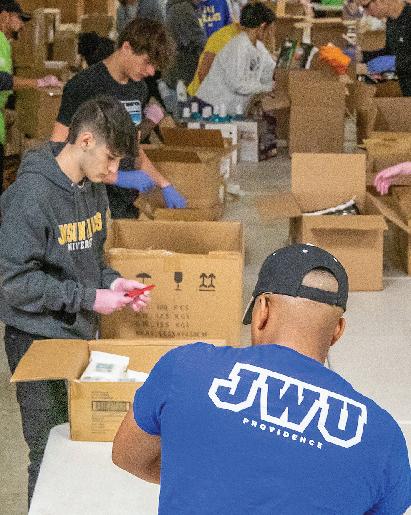
Working with faculty advisors Associate Professor Joseph Melanson ’94 ’96 M.A.T. and Senior Instructor Tim Brown, the student-led organization distributed 1,400 pounds of food in Spring 2023. While Evans is mindful of making sure curricula produce the minimum amount of waste, he is proud that the bake sale and Wildcat Food Rescue have been successful initiatives in addition to other university efforts like collaboration with the Elisha Project. “I think we’ve appreciably impacted [campus] food waste and food insecurity,” says Evans.
He notes that the group is hoping to help start a similar program at local high schools, and JWU will launch a partnership with King Arthur Baking this year to lead an after-school baking program that could also help address food insecurity as one of its outcomes.
“This generation comes with sustainability built in as a priority,” says Evans. “A lot of them really think about their careers as a vehicle for doing good.”

In order to empower the next generation of bakers, the NielsenMassey Foundation has supported a $100,000 endowed scholarship for JWU students who are studying in the baking and pastry programs in CFIT, the College of Food Innovation & Technology.
“At Nielsen-Massey, we believe in the strength of a healthy culinary community. To support that community, we invest in the current generation of chefs and the next generation of culinary experts,” says the Nielsen-Massey family. “JWU is a premier culinary institution that is building the next generation of tastemakers and culinary experts. We believe institutions like JWU are critical to a sustained, healthy culinary community, and we are excited and proud to support their mission.”
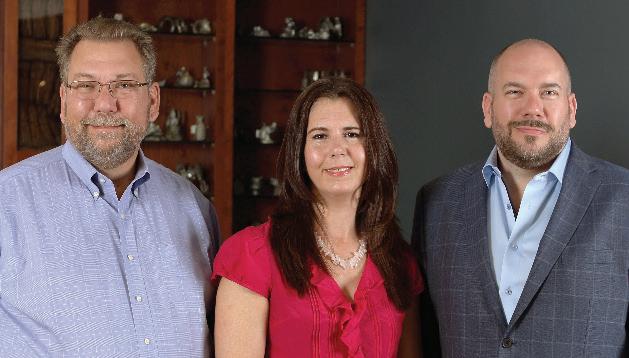
Founded in 2009, the Nielson-Massey Foundation is committed to assisting disadvantaged individuals with education and leadership development, especially in the field of culinary arts. The foundation is a family affair, led by siblings Craig, Beth and Matt Nielsen — third-generation owners of Nielsen-Massey Vanillas — and their mother Camilla Nielsen.
The family wants people to know that the business of vanilla is anything but basic; in fact, producing a high-quality, taste-bud inspiring vanilla requires a “unique extraction process to retain the delicate aroma and flavor compounds that are otherwise lost to heat and pressure,” says the siblings. “We want culinary students to know that all vanillas are not created equal, and that is why there is a noticeable difference between a Nielsen-Massey vanilla and any other vanilla.”
For the family, giving to JWU was an “easy decision” based on their longstanding engagement with and belief in JWU, personal relationships with many instructors, and shared commitment to developing the next generation of culinary professionals at the highest level.
“The Nielsen-Massey Foundation only supports organizations we truly believe in, and we believe deeply in JWU,” the family says.
“Offering a scholarship to an aspiring student to pursue their dream is the most direct way we can foster and support education and leadership development in the culinary arts. We encourage others to give to JWU and contribute to a sustainably healthy culinary community.”
Robert (Rob) Stiles ’78, ’22 Hon. is a high-powered, successful co-founder of a real estate investment banking business today, but in high school, he was “drifting.” It was the two-year culinary program at Johnson & Wales University that taught him the meaning of hard work, focus and commitment, he says. That lifelong impact inspired Stiles to give not only his money to JWU — through a $100,000 student scholarship — but also his time, through mentorship support, hosting the oneJWU fundraising challenge, and acting as a visiting lecturer on entrepreneurship in hospitality real estate.
“My two years at JWU were hard-charged years, learning beside incredibly motivated students who pushed me to be better, and more efficient and effective, and with faculty who were so knowledgeable and disciplined. It was really through that experience that I became laser-focused and hardworking,” explains Stiles, who is now managing director and founding principal at RobertDouglas, a real estate investment banking firm.
After completing the JWU culinary program, Stiles chose to switch his focus to hotel administration at Cornell University. Nevertheless, he says his time at JWU impacted his trajectory, influences how he approaches his life professionally and personally, and informs how he gives back philanthropically.
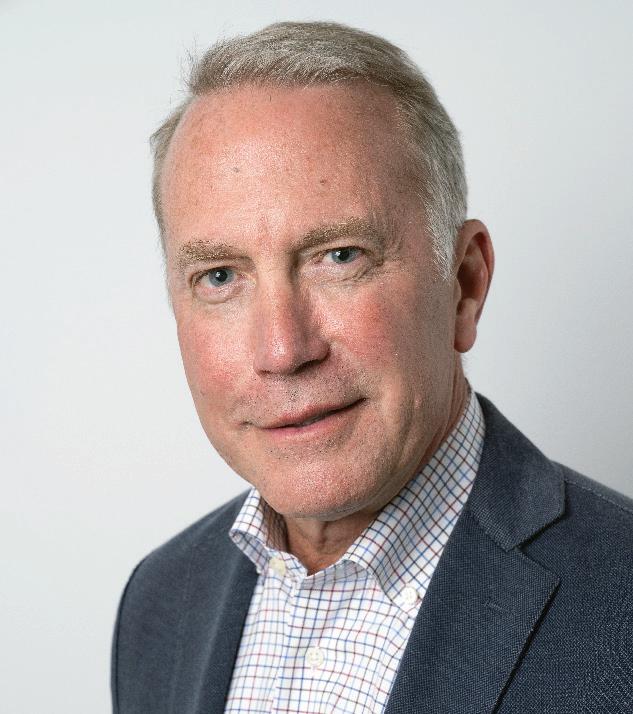
“My wife and I firmly believe that education is maybe the most efficient game changer in people’s lives, so categorically we’re very supportive of education,” says Stiles, who lives in San Francisco but reengaged with JWU years ago and was taken aback once again by the level of dedication and drive shown by its students.
He adds, “A liberal arts education is fantastic, but JWU provides very practical, real-world programs that deliver transformational results for people who know what they want out of life and their career. Supporting JWU is an easy decision because they are changing outcomes for so many young people.”
Robert (Rob) Stiles ’78, ’22 Hon.
NELSON ISAIAH VAZQUEZ, known affectionately as “our Daddio” at home and Neli to his friends, was completing his M.S. degree in Clinical Health Counseling at JWU when he suddenly and tragically passed away the age of 24. His impact, however, will continue to live on through a clinical health studies scholarship established by his parents — Stephanie Lozada and Nelson Vazquez Jr. — in 2023.
Vazquez is described by family and friends as someone who saw the good in everyone, always offered a shoulder to lean on, had a contagious laugh, and brightened every space he entered. He had a flare for fashion; a deep love for his parents, siblings, friends, and his dog, Paris; and a passion for helping others, particularly those who felt marginalized by society. His family says he saw counseling as a symbol of hope and a “way to help people who have not always felt heard.”
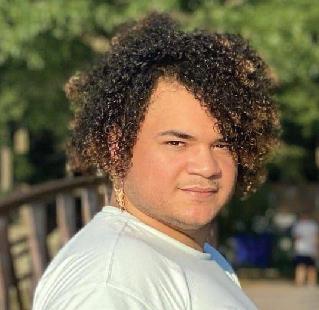
Inspired by his own personal struggles, Vazquez was committed to making the world a more just and loving place, says those who knew him best. “Neli was a survivor of intersectional discrimination being a person of color, hard of hearing, and a member of the LGBTQ+ community,” said Mariah Villanova, a high school friend. Nevertheless, she says, “Neli was always himself,” and his JWU friends describe him as most himself while on campus.
Friend Jaycie Jordan ’22 M.S. says, “JWU was a place where Neli could express himself and know that he wouldn’t be judged.” Mariah DiToro ’22 M.S., shared a similar sentiment, saying, “To Neli, JWU was more than just a school, it was a place where he could be himself … it was a home away from home. JWU was a place that brought Neli incredible friendships — people that have so much love for him and always will.”

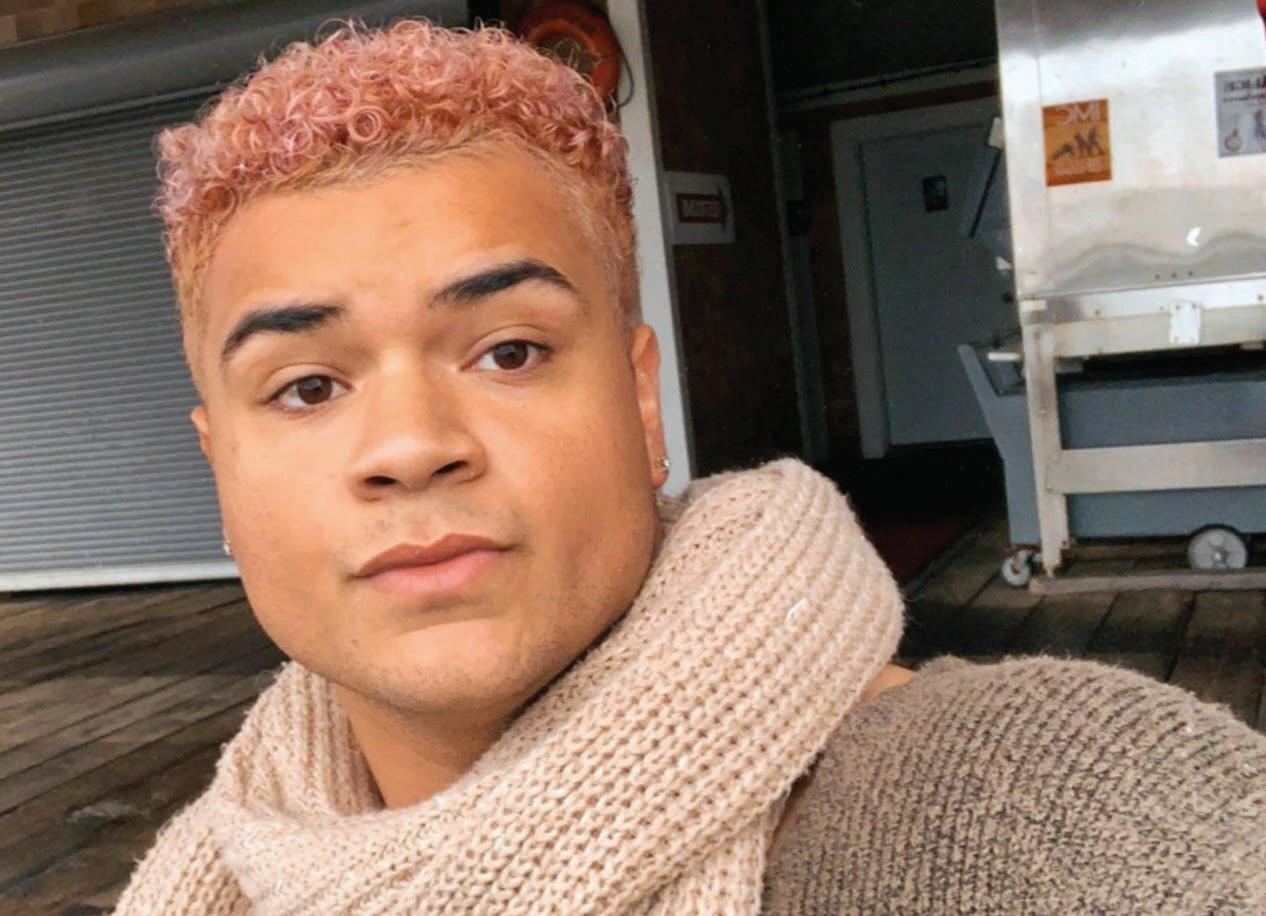
Vazquez also touched the faculty at JWU, including Heather Cosmini ’11 Ed.D., professor of social sciences. “Neli loved to learn and make other people feel special,” she says. “He chose to study clinical health counseling because he loved people so much and wanted to understand them better so he could ultimately help them overcome life’s inevitable trials.”
Another dear JWU friend, Shannon Printer ’23 M.S. says, “Neli was very passionate about helping those who have gone through similar struggles to him and creating a safe space for them. I remember we did a 45-minute mock session for the JWU program, and we were in his car afterwards and he spoke about his life in terms of ‘cups’ and how some areas of his life were filled and others were empty. He wanted to help those whose cups needed to be filled.”
The scholarship fund was established to honor Vazquez’s passion for counseling and his belief in the importance of giving everyone— across every aspect of difference—a voice and a safe space to be themselves. “We hope the recipient will be a beacon of light for someone in need of guidance and continue Neli’s legacy of care,” say his parents.
Alumni from across campuses and all class years gathered on Friday, April 19, on the Providence Campus to celebrate one another and reconnect with the university. The festive weekend opened with a lively showcase by the JWU Players followed by a Wildcat Welcome Reception. Alumni relished the opportunity to reconnect with classmates, faculty, and university leadership. Returning alumni were treated to the Senior Reveal Showcase, an interactive exploration of graphic design students’ final projects.
On Saturday, alumni were invited to explore new academic offerings and initiatives. This included classroom visits to learn more about cybersecurity’s future in digital warfare, workshops focusing on cannabis plant science business practices, and pitches from students who competed in this year’s JWU Sharkfest. With the support from Paul D. Dechichio ’04, each attendee received a T-shirt to commemorate their experience.
A reunion staple, Taste of JWU showcased an amazing array of food and beverages from around the world, prepared by talented JWU alumni, including Andrew Brooks ’17, Armondo Bisceglia ’01, ’03 M.A.T., Savannah Campbell ’19, Bryan Chavez ’15, and Jaewoo Choi ’16, Stacey Deetz ’05, Sanjiv Dhar ’90 M.S., Motokazu Kondo ’04 and Andrew Simonich ’20. In addition, student culinary clubs participated and wowed everyone with their mouth-watering dishes. Great music selections were played by DJ Christopher N. Depta ’06 to complete the event.
The delightful tasting continued with a fun cocktail and mocktail session led by Linda G. Garcia ’17, Jerry Finch, and Christina M. Mercado ’07, ’10 MBA, who shared some of their amazing recipes. Special thanks to the generous contributions from Bill Gamelli and Nicholas J. Padula II ’87.
Saturday evening, the Distinguished Alumni Awards recognized three exceptional alumni who have made noteworthy contributions in
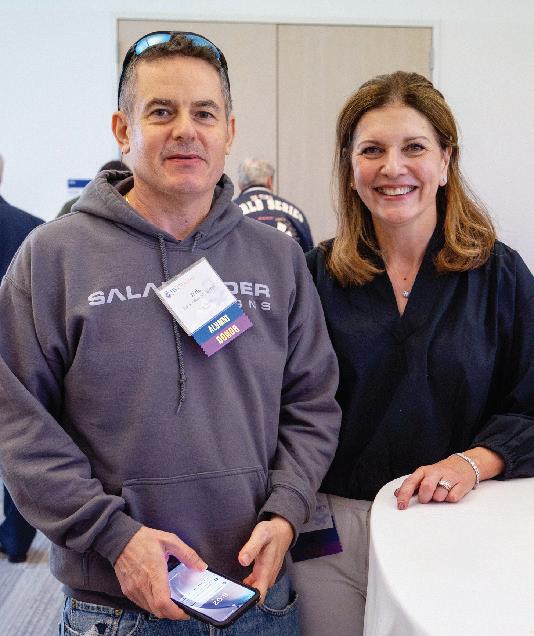
their respective fields and JWU, and have demonstrated remarkable dedication, hard work and perseverance, inspiring others through their achievements: Margaret R. Mulvena Pearson ’13, former private chef and founder of Feast & Fettle won the Graduate of the Last Decade (G.O.L.D.) Award; Aditya V. Dhandhania ’10, CEO of Neon Marketplace and senior managing director of TPG Strategic Ventures won the Outstanding Achievement Award; and Sanjiv Dhar ’90 M.S., owner of Indian RI Group/Swades Inc./Spice Kraft Inc. won the Alumni Service Award. Celebrations continued as alumni gathered at the Culinary Arts Museum to participate in spirited Casino Night where the air was filled with excitement as they played blackjack, poker and roulette in hopes of winning big with prizes donated by Michael Canini ’00 and Damaris R. Messina ’05, ’14 MBA.
On Sunday, during Brunch by the Bay, Marie-Bernardo Sousa, president, Providence Campus, remarked on the strength of the alumni connections and warmly reflected on a weekend filled with festivities, networking, and deepening connections to the university and each other. Featured alum, Andrea Moreno ’16, ’18 MBA, shared that the weekend provided her a “true full circle moment of gratitude for the incredible foundation built at JWU.”
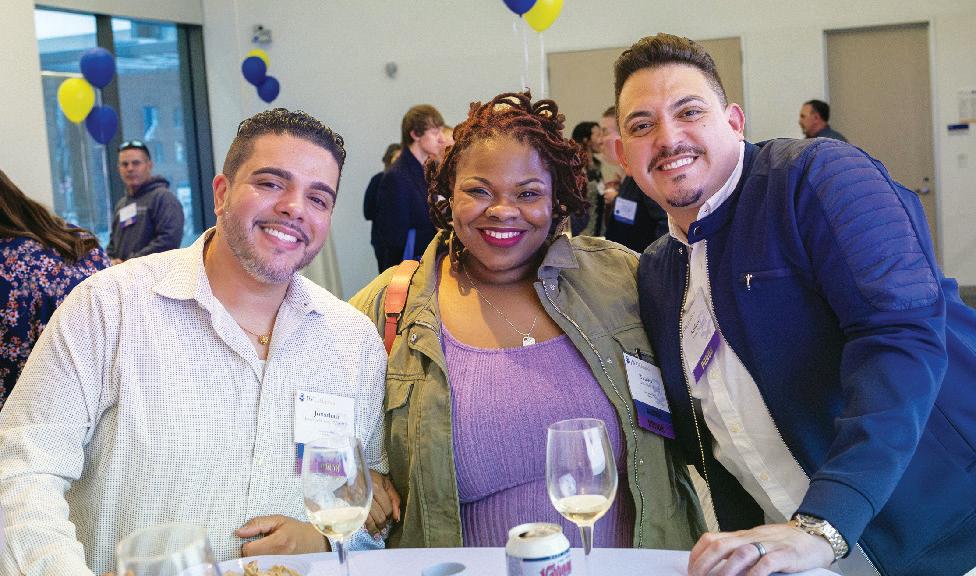
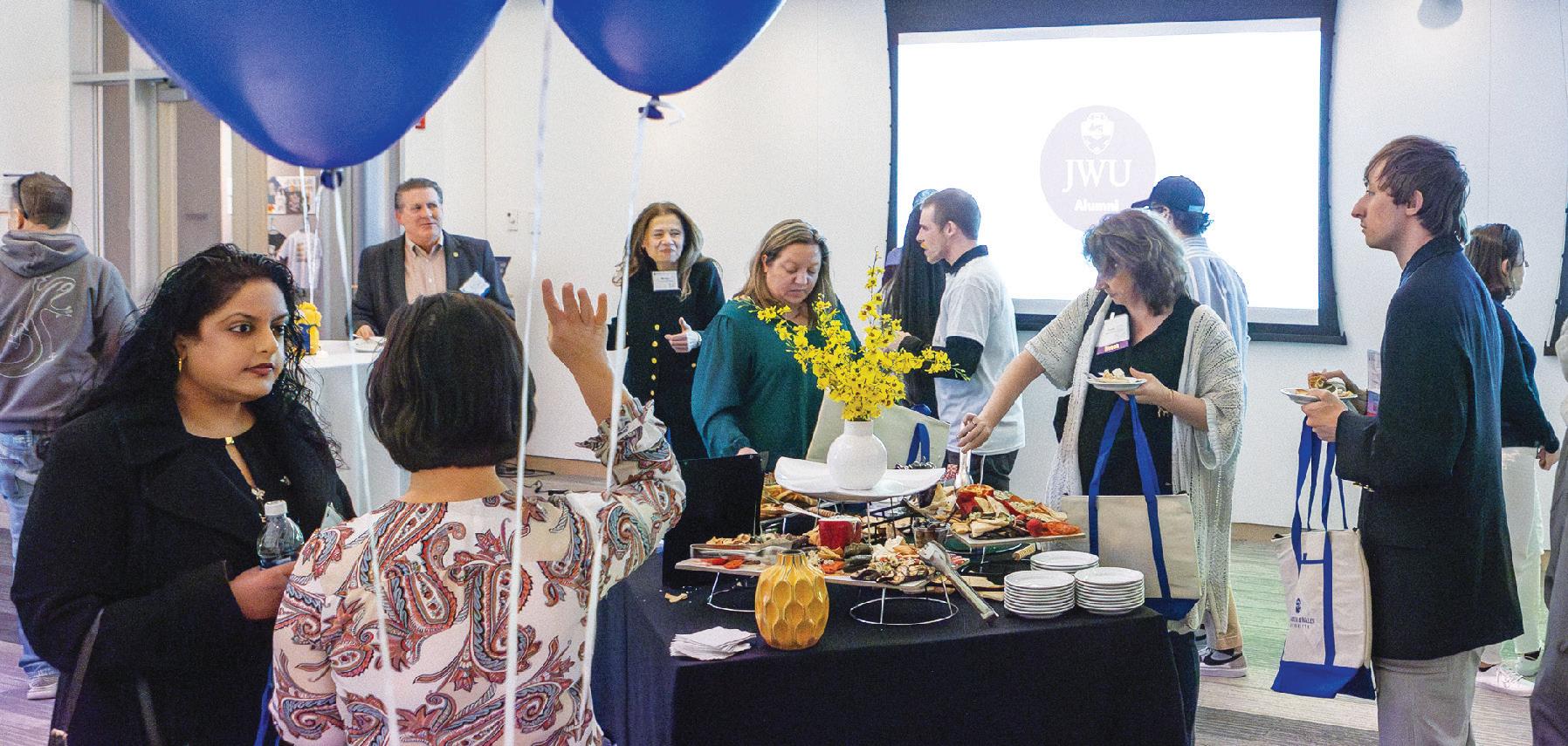
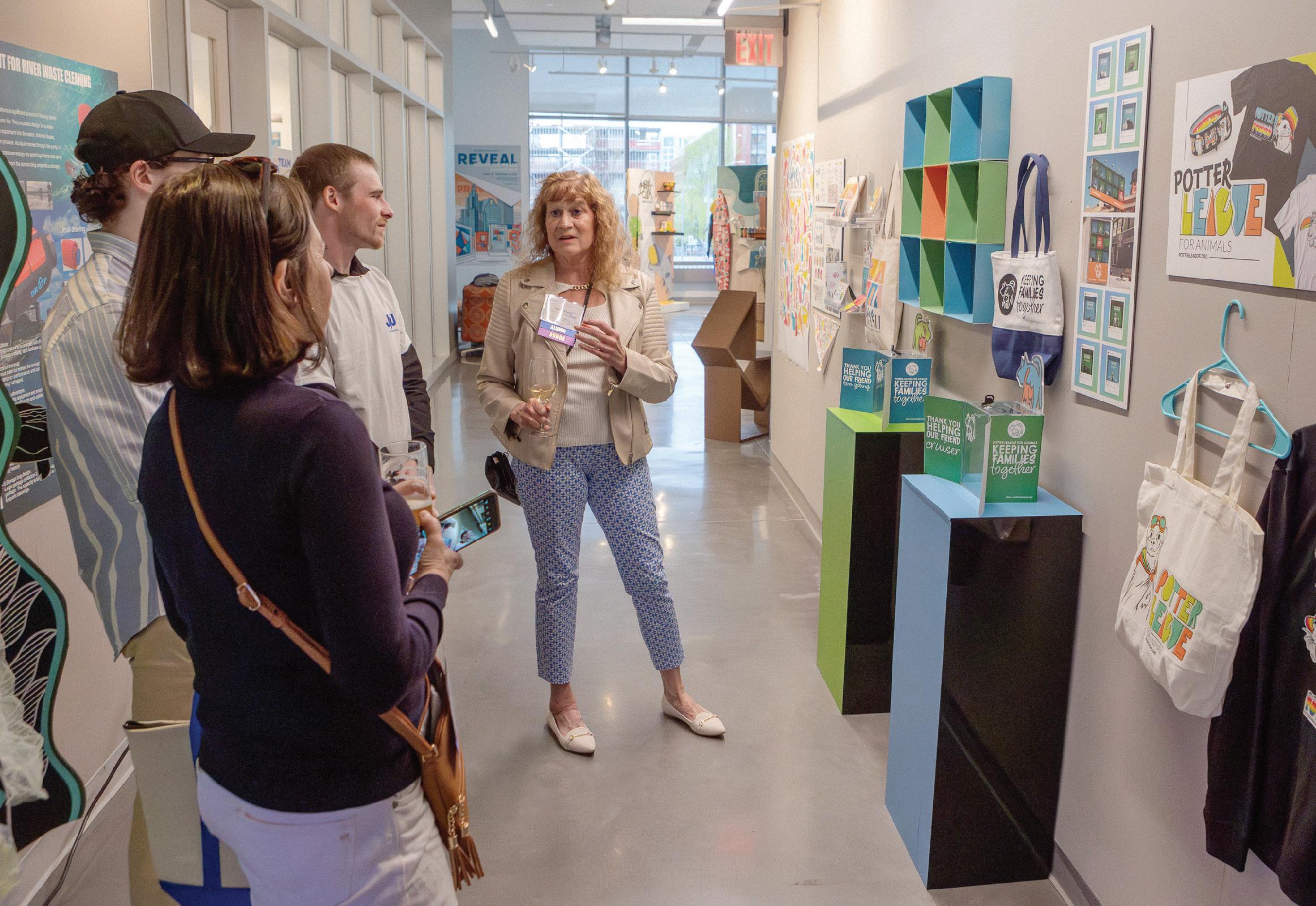
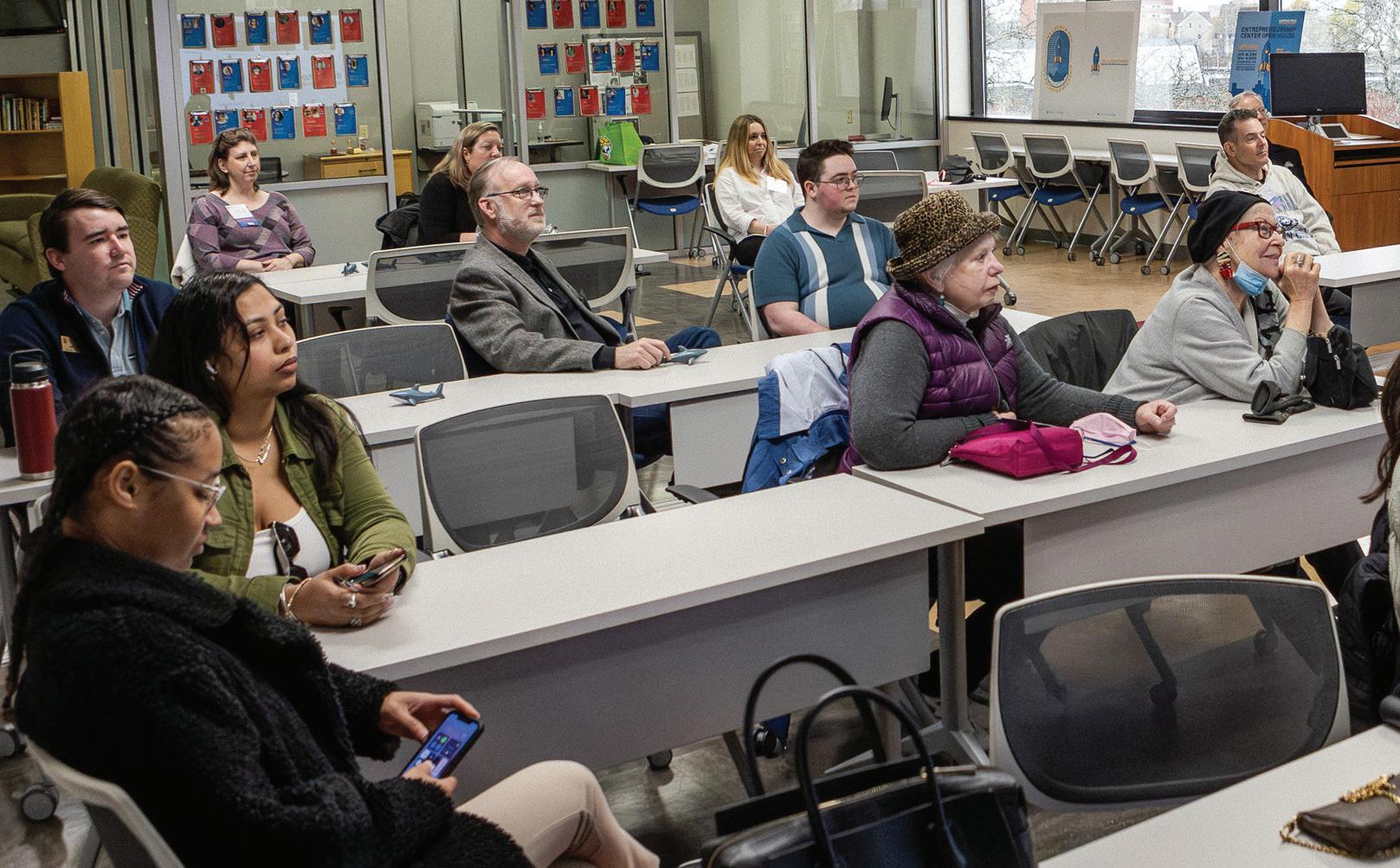
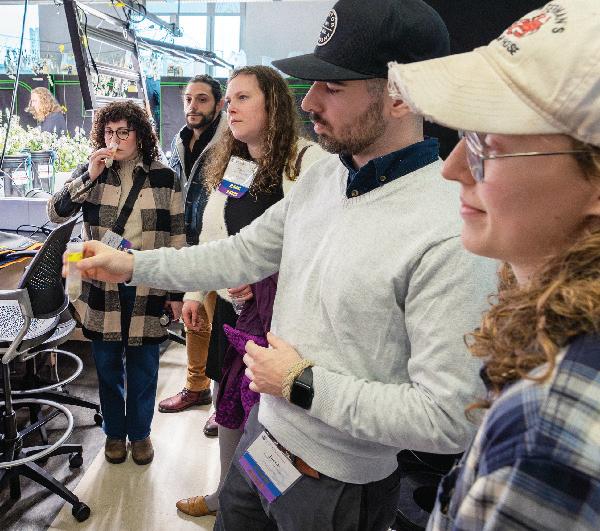
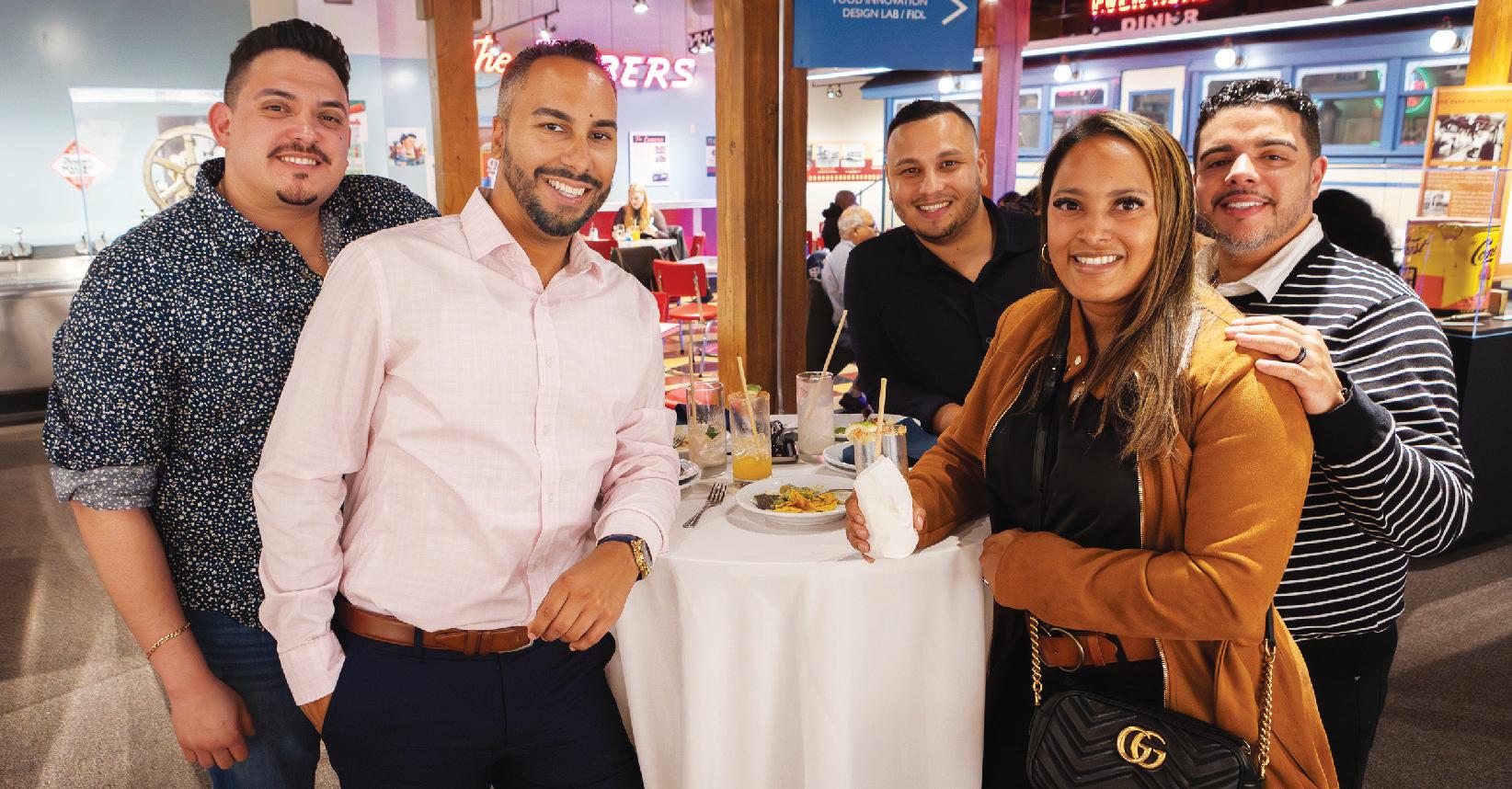
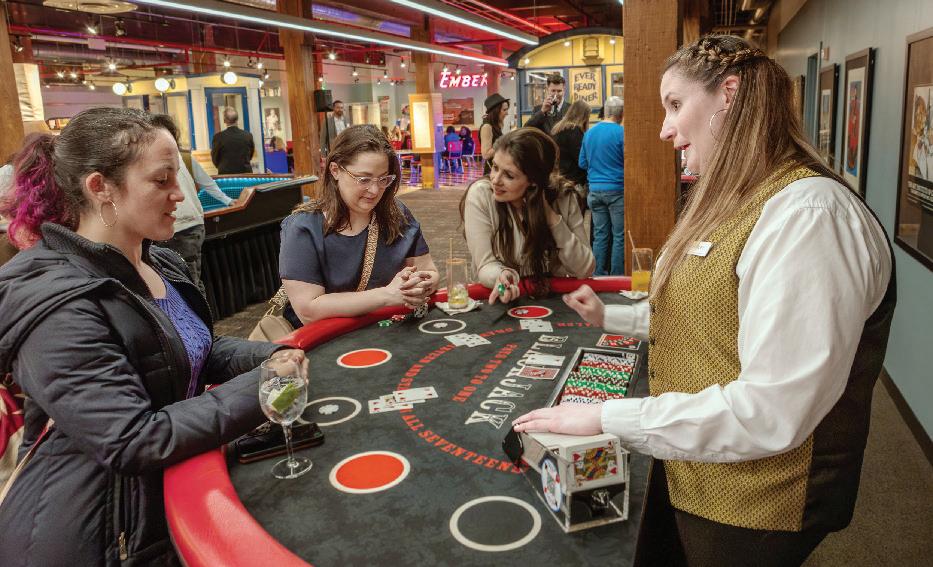
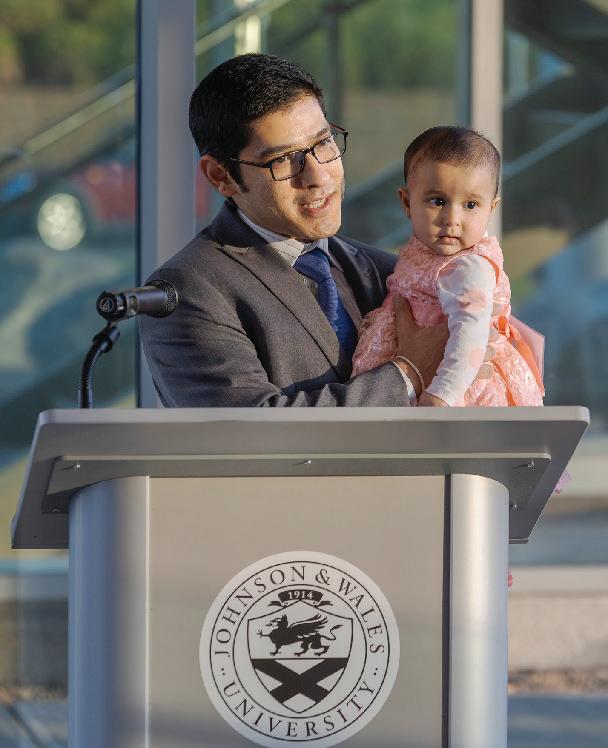
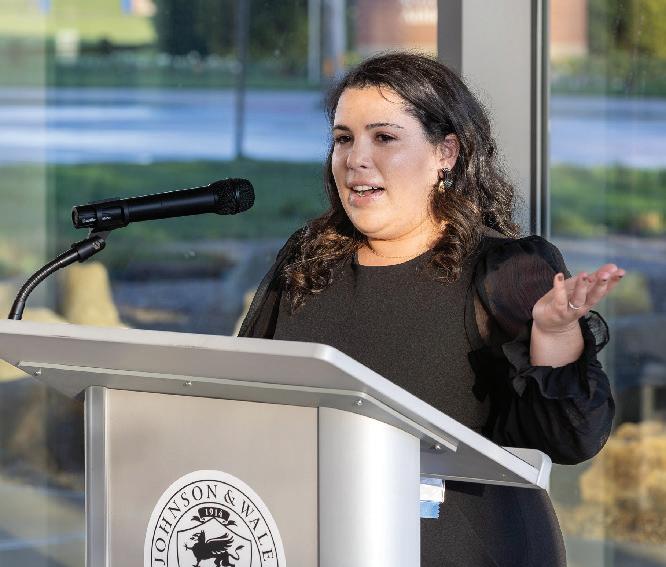
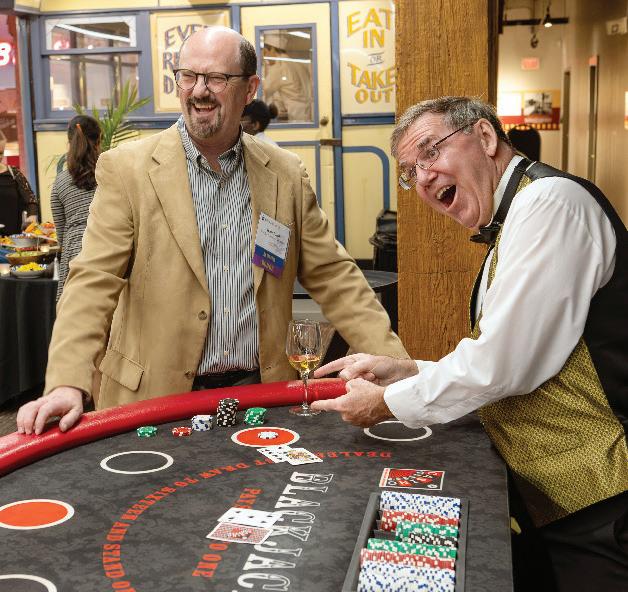
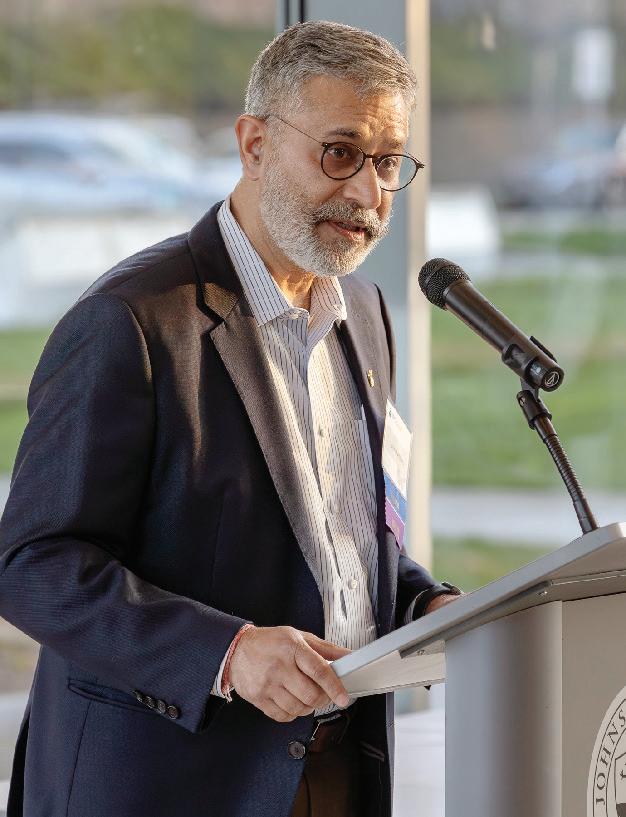
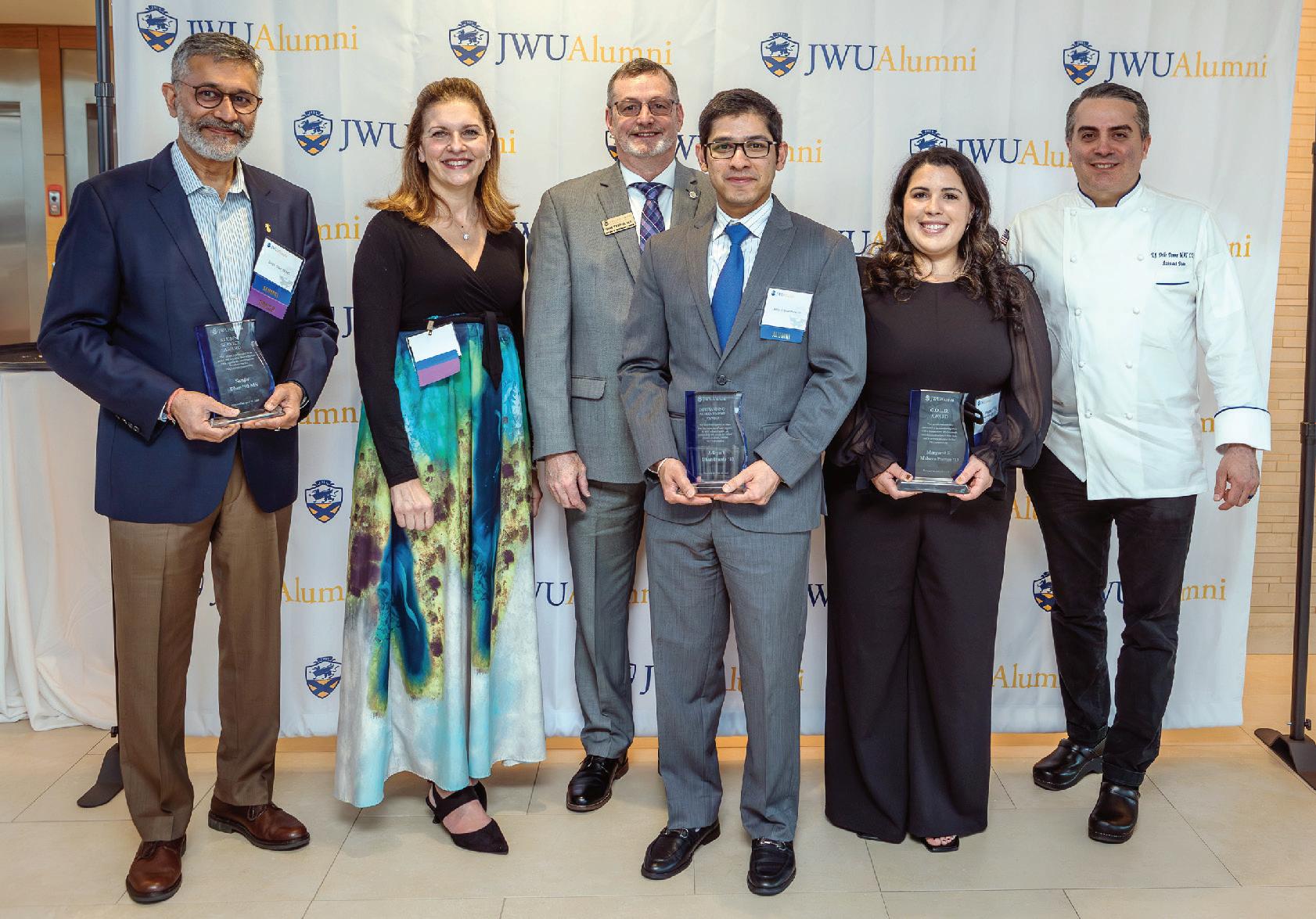
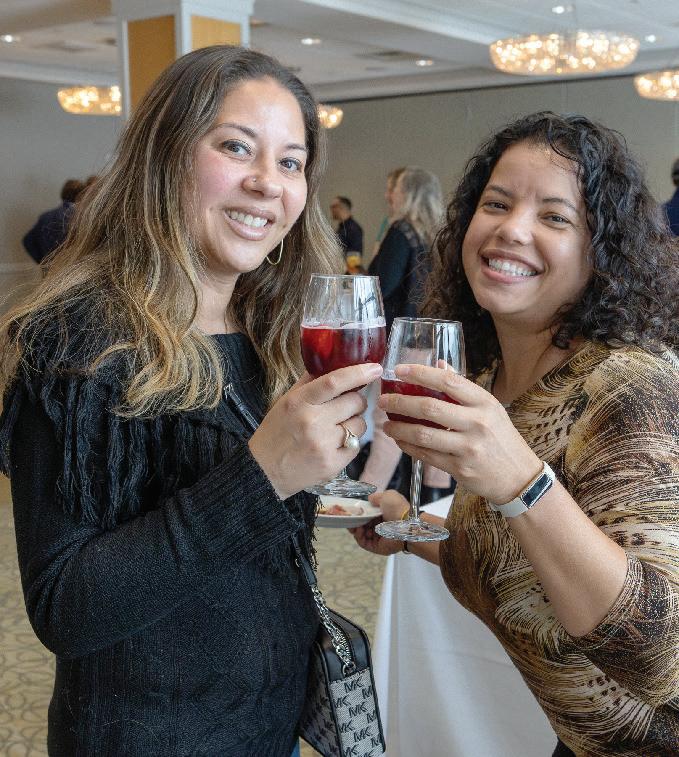
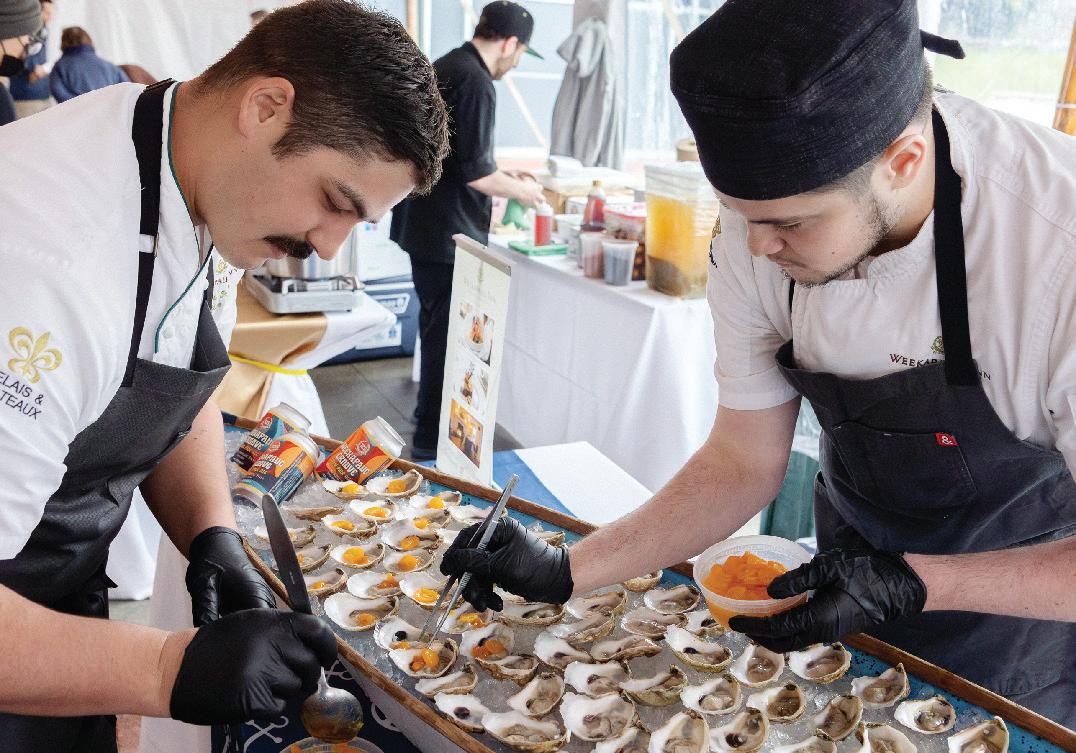
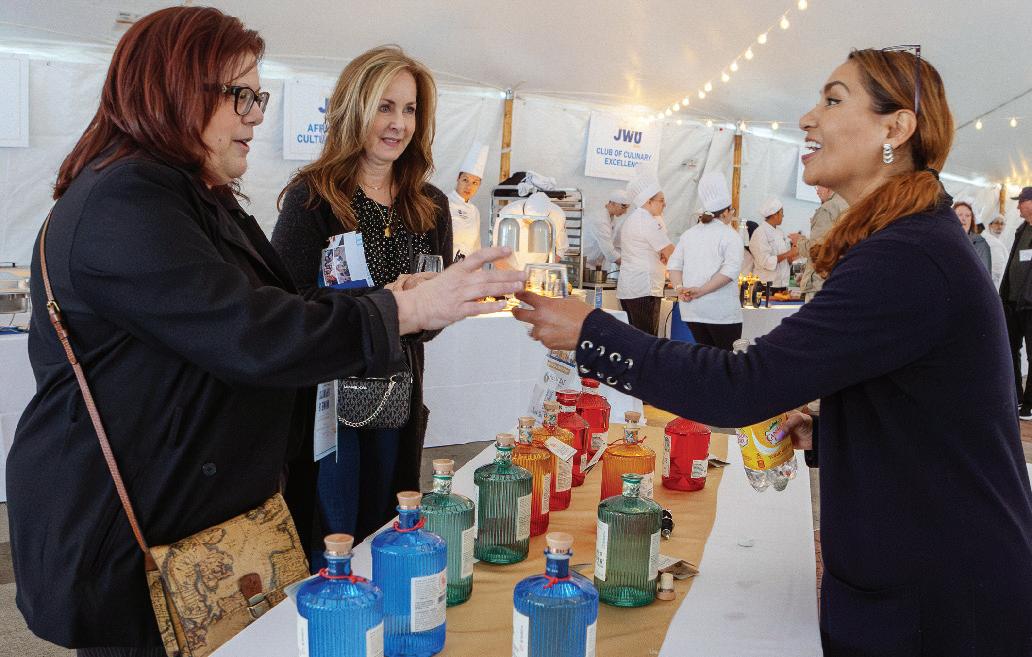
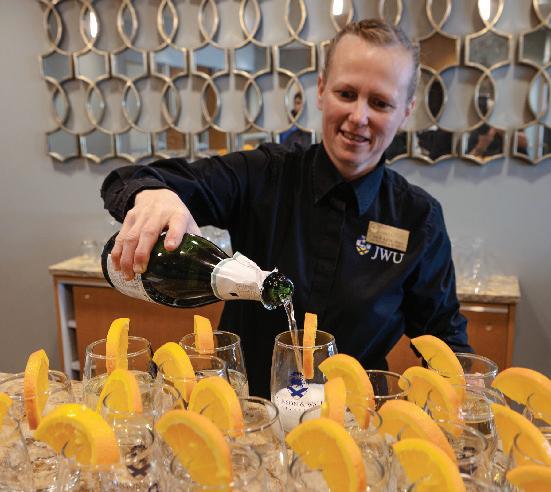
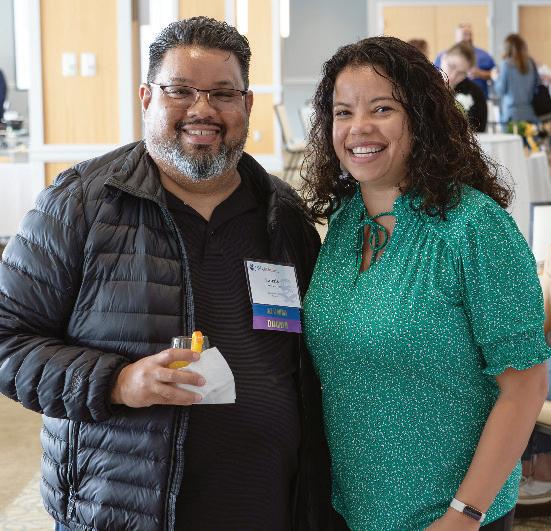
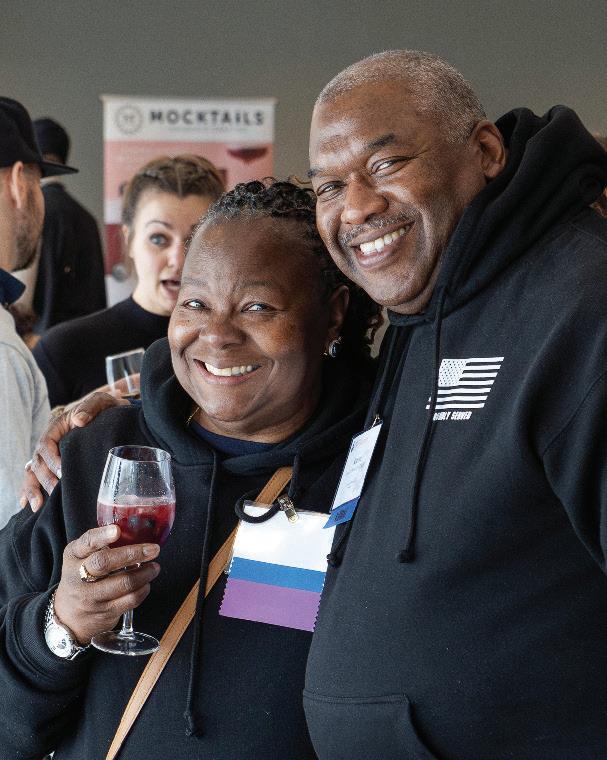
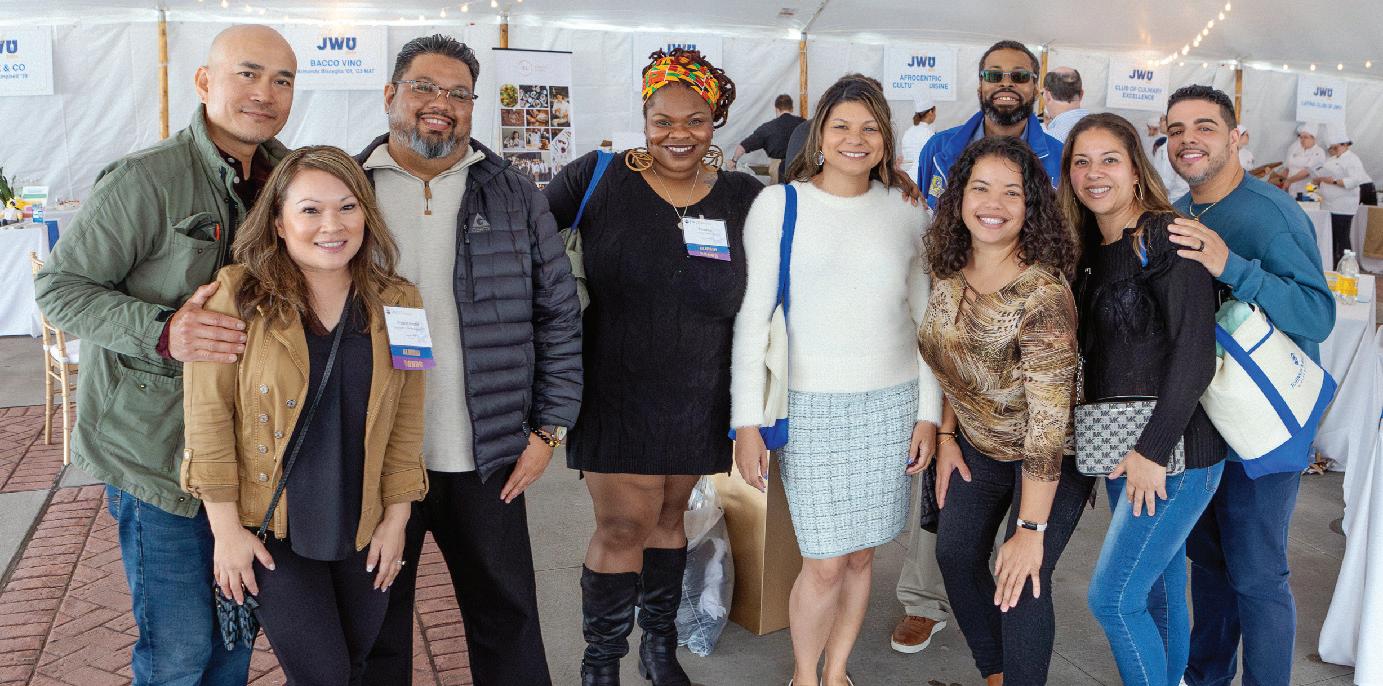
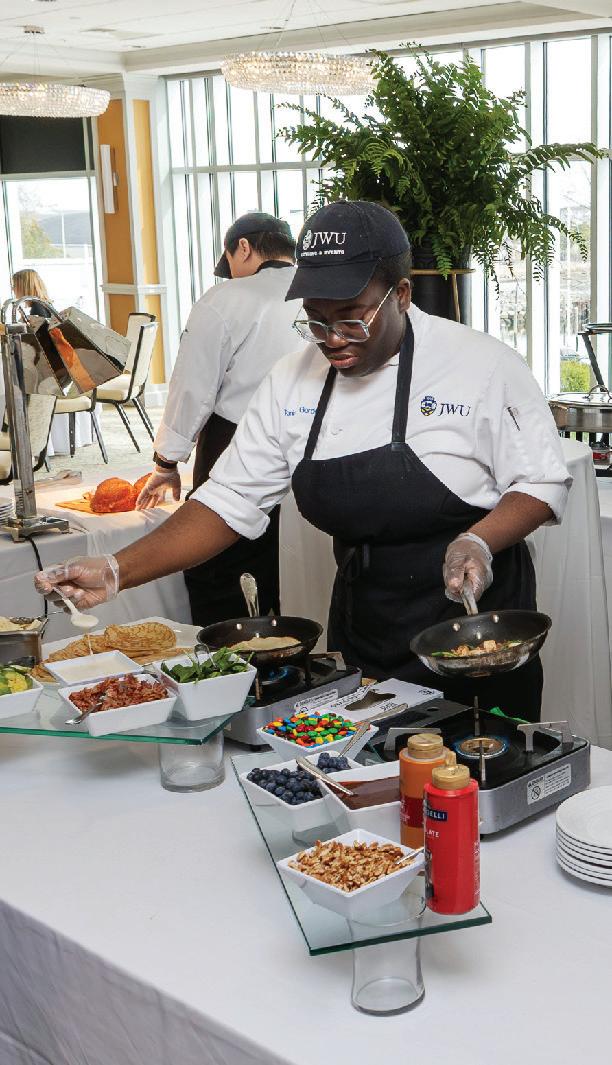
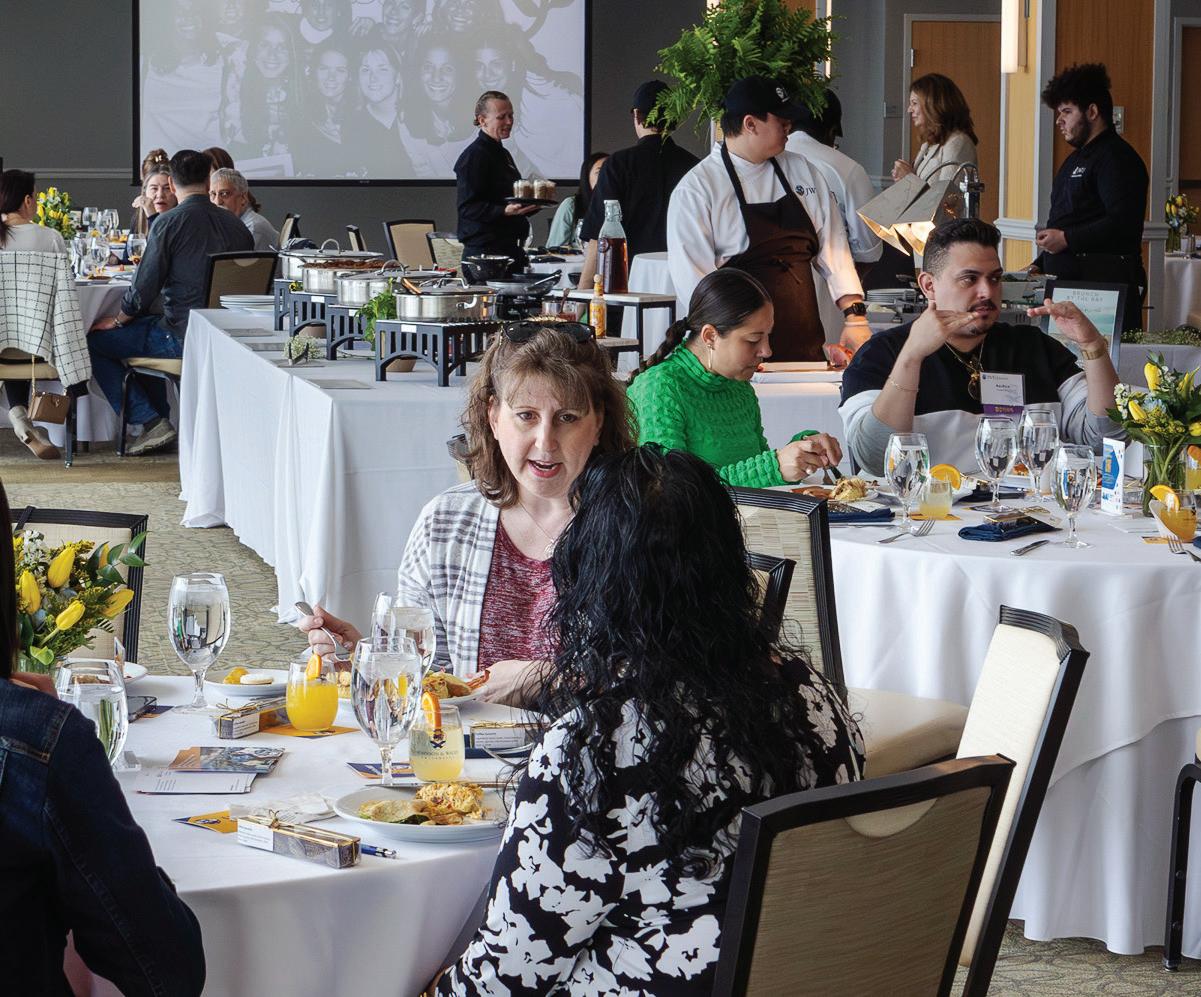
CHARLES P. MIRARCHI PVD
FOREST HILLS, NEW YORK
After years of working as a pastry chef and hospitality professional, Chuck is now the director of communications for Club Coupe du Monde Team USA. Every two years, a new team is selected to compete at the Coupe du Monde de la Pâtisserie in Lyon, France.
KRISTINA M. BERANO PVD
LADY LAKE, FLORIDA
Kristina has joined Florida Building Material Alliance as the director of communications and events.
JENNIFER C. TRAPANI PVD
CAPE CORAL, FLORIDA
Jennifer has been appointed director of sales and marketing at The Westin Cape Coral Resort at Marina Village.
[1] MONIQUE E. HENDERSON PVD
FARMINGTON HILLS, MICHIGAN
“Moe” owns Shade Cigar Cafe and CIGARDEN Mobile Cigar Service in Farmington Hills.
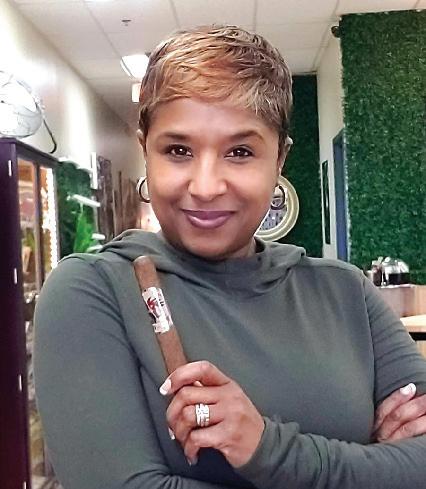
ROBERT R. BLASI PVD
MIAMI, FLORIDA
Robert is the chief people officer for Riviera Dining Group, which is based in Miami.
BRYAN J. CICCHINI CHS
ROYAL OAK, MICHIGAN
Bryan was appointed the director of nutrition at William Beaumont University Hospital-Royal Oak last year.
[2] CHAD L. PAWLAK SR. PVD
CHAPEL HILL, NORTH CAROLINA
Chad has been appointed CEO of Genvor Inc.
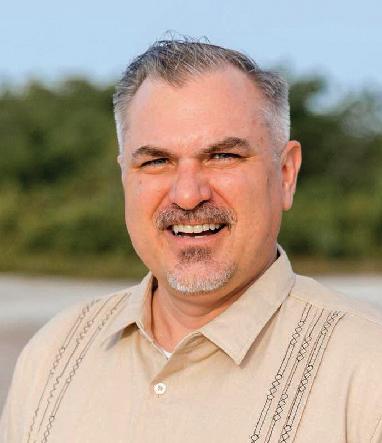
ARA KARAKASHIAN ’02 MBA PVD
JERSEY CITY, NEW JERSEY
Ara is dean of the School of Business, Culinary Arts & Hospitality Management at Hudson County Community College in Jersey City. He earned his doctorate in Educational Leadership from Rowan University in 2020 and was recently named the 2023 Cannabis Educator of Year by NJ Cannabis Insider. Ara leads his community college’s efforts towards creating minority and underprivileged participation in this industry by forging partnerships with local dispensaries for student internships and employment.
TIFFANY LEWIS PVD
RICHMOND, VIRGINIA
Tiffany was promoted to vice president of sales & marketing for Sandpiper Hospitality.

[3] MARLA SIMON CHS SAN FRANCISCO, CALIFORNIA
Marla’s company, Scarlet Fire Hot Sauce, won a 2023 Good Food Award.
MICHAEL E. MARRAPODI ED.D. PVD
BOSTON, MASSACHUSETTS
Michael is the associate provost for online programs at Cambridge College in Boston.
[4] NAJAH
RAHMAAN-ONEALE PVD
NEW YORK CITY, NEW YORK
Najah was featured in Canvas Rebel magazine discussing their journey from JWU student to business owner and marketing executive running a full-service strategic marketing and design agency. Najah is a senior partner and CEO of Dedica Group in New York City.
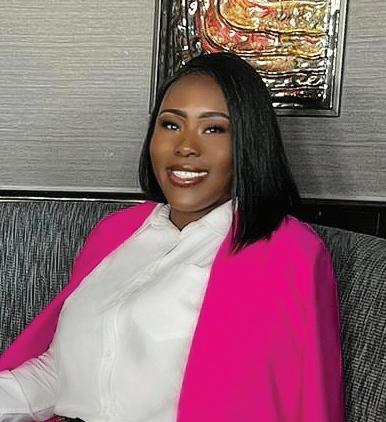
KRISTI J. DUKOFF PVD
WARREN, RHODE ISLAND
Kristi owns Kristi’s Kraftails, which specializes in homemade, vegan, low-sugar and gluten-free drinks made from fresh fruit.
[5] SUSAN B. MAHAFFEE ’07 MBA PVD
ANNAPOLIS, MARYLAND
Following a successful career in human resources, Susan established People Rise LLC in November 2022. Her people advisory firm provides strategic HR consulting to small and medium-size businesses in myriad industries, from manufacturing and food service to acrobatics and real estate.
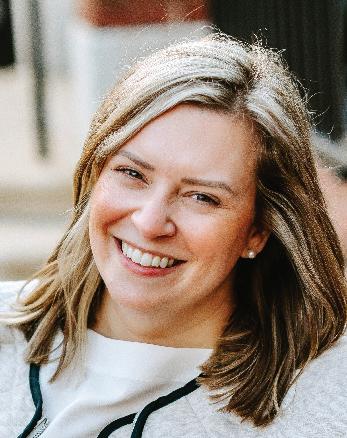
MANSOOR HAIDER PVD
UNION CITY, CALIFORNIA
Mansoor is the corporate executive chef at Mollie Stone’s Markets located throughout the Bay Area.
THOMAS KENWORTHY ED.D. PVD
EAST GREENWICH, RHODE ISLAND
Thomas, who has served as superintendent of the Portsmouth, Rhode Island, school district since 2020, was recently elected as chair of the Board of Directors of the East Bay Educational Collaborative. The role is a two-year term, during which time Kenworthy will also represent East Bay superintendents on the Executive Board of the Rhode Island Superintendents’ Association.
ARMAND C. ROBINSON PVD
PHILADELPHIA, PENNSYLVANIA
Armand is the executive chef at Di Bruno Bros. Catering and Commissary in Philadelphia.
BRENDAN G. DWYER PVD
KINGSTON, NEW YORK
Brendan has been appointed general manager at Hutton Brickyards in Kingston.
[6] GEORGE P. FISHER PVD
SAN FRANCISCO, CALIFORNIA
George (Jack) is the director of development for The University of the Pacific Arthur A. Dugoni School of Dentistry. He is responsible for developing and managing relationships with university alumni, board members, and other supporters in order to secure funding for student scholarships, named endowments and capital facility projects.
6
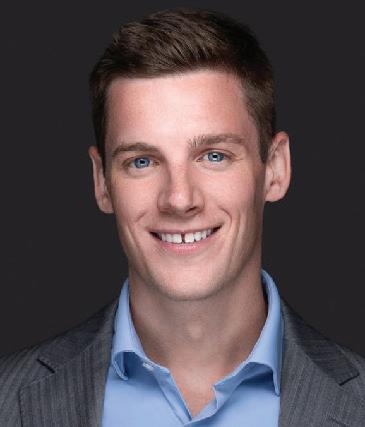
PVD Providence
NMI North Miami
DEN Denver
CLT Charlotte
CHS Charleston NOR Norfolk
VAIL Vail International ONL Online
BENJAMIN J. SIEGEL 15 PVD
ELIZABETH, NEW JERSEY
Benjamin is a portfolio manager for wines at Allied Beverage Group in Elizabeth.
KOLBI L. HOLMES PVD
MELBOURNE, FLORIDA
Kolbi, who has a doctorate in occupational therapy, works as an acute care occupational therapist with Steward Health Care.
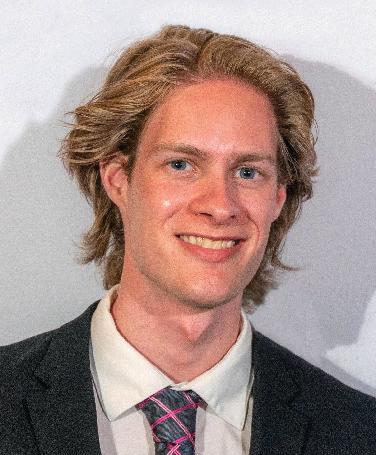
[7] IAN G. WALLIS ’19 MBA PVD
RACELAND, LOUISIANA
Ian is the sales and marketing manager at Louisiana’s Cajun Bayou Tourism in Raceland. Ian and his organization were lauded with the Shining Example Award for Best Marketing by the Southeast Tourism Society.
ELENA MANCHETTE ’23
MSPAS PVD
NORTH KINGSTOWN, RHODE ISLAND
Elena is a physician assistant at Wood River Health in Hope Valley and Westerly.
If there’s news in your life you’d like to share with fellow alumni, please send us photos and announcements about your career, recent weddings, unions and additions to your family.
Images: To submit images from your event, please provide high resolution digital files (minimum one megabyte [1 MB] in size, in jpeg format), or actual photographs can be emailed to alumni@jwu.edu. A form to submit class notes is available at: https://bit.ly/jwuclassnotes

CATHERINE (PANGAKIS) ANTZES
PVD and JACK G. ANTZES PVD
Zachary Antzes
2006
MELISSA A. BENJAMIN PVD and Cecilio Gomez
August 24, 2023
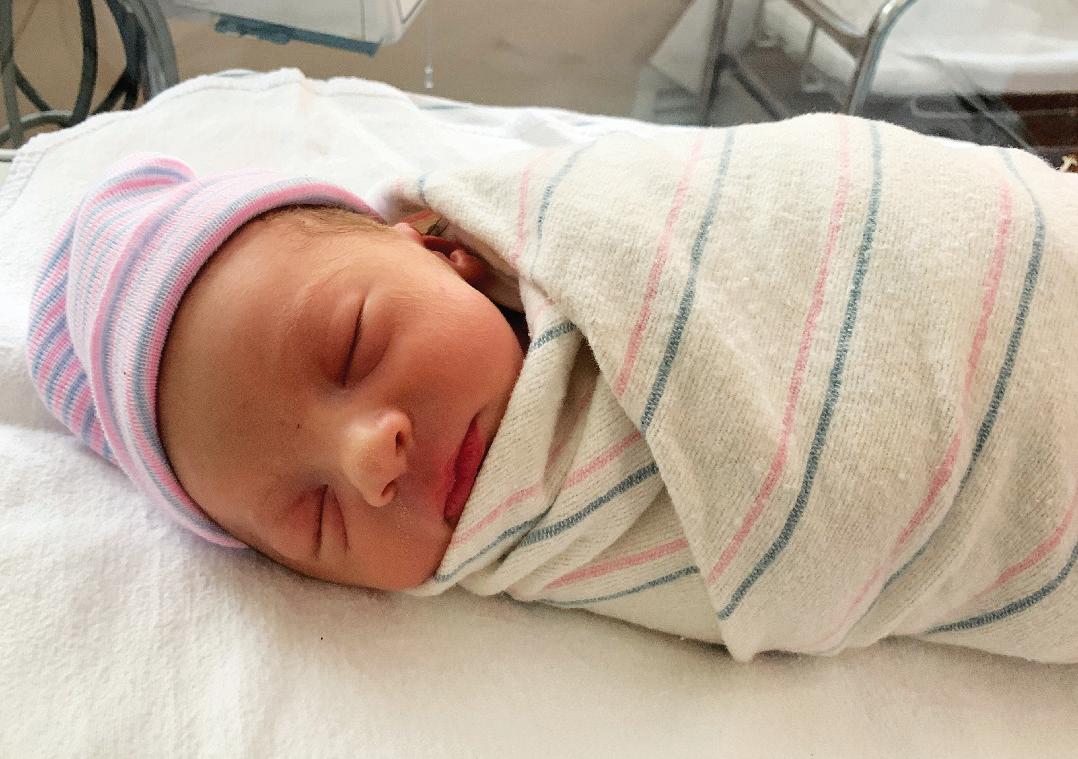
JOAN M. SENNA ’60
January 7, 2024
DONNA CARPENTER ’64
December 25, 2023
DIANE A. KOWALCZYK-OBERG ’66
September 6, 2023
ANNETTE I. BERNIER ’69
April 12, 2023
JOY PARRISH ’69
January 14, 2024
KENNETH P. REGO ’70
July 13, 2023
PAUL J. IMBRUGLIO ’73
July 18, 2023
DEBORAH D. KELLY ’74
July 4, 2023
JAMES BOLAND ’75
January 23, 2024
JAMES MCCURLEY ’75
January 13, 2024
KENNETH BRASIER JR. ’76
September 7, 2023
HARRY VAUGHN LANE ’76
February 8, 2024
EDWARD N. MALLOY ’76
June 16, 2023
JAMES W. MAYNARD ’76
May 21, 2023
NELSON PARADIS ’76
November 7, 2023
JOHN PECKHAM ’76
December 5, 2023
ROBERT POLIQUIN ’76
September 30, 2023
HAROLD WOLSTENHOLME ’76
January 10, 2024
PHILIP CERVERO ’77
March 31, 2023
LINDA DAVIS ’77
August 11, 2023
JOSEPH J. GROSS ’77
January 1, 2024
RONALD E. LAGUE ’77
January 12, 2024
JOHN J. VENDETTOLI ’77
February 8, 2024
EDGAR J. DAVIS ’78
September 17, 2023
EVERETT H. FILLION ’78
November 23, 2023
JOHN W. GAGNE ’78
December 11, 2023
GLEN S. ROSSER ’78
July 12, 2023
MICHAEL A. LEBORIOUS ’79
November 17, 2023
DAVID R. MAGILL ’79
December 21, 2023
MYRLE D. STOCKFORD ’79
July 26, 2023
LEONARD HALKO ’80
November 30, 2023
JOHN W. HENDRICKSON ’80
November 8, 2023
EARL L. LACY ’80
May 31, 2023
RAYMOND V. TREMBLAY ’80
May 15, 2023
GARRY G. GERMANO ’81
May 7, 2023
DAVID R. J. GROMACKI ’81 August 6, 2023
RICHARD D. MERCURE ’81
July 5, 2023
LINDA D. SULLIVAN ’81 December 26, 2023
MICHAEL G. LOSCALZO ’82
September 18, 2023
BRIAN R. MILLER ’82
December 28, 2023
STEPHEN PARR ’82
May 19, 2023
BRIDGET GILLIAM ’83
November 1, 2023
BARRY STEINBERG ’84
December 31, 2023
WILLIAM BANNON ’85
November 10, 2023
EDWARD DECROSTA ’85
August 31, 2023
ROSE M. DESICS ’85
January 26, 2024
LEONARD P. PAQUETTE ’85
September 9, 2023
CHARLES P. HURLEY ’86
October 6, 2023
ROBIN D. SEVACHKO ’86
November 15, 2023
NAZARE ABREU ’87
August 20, 2023
DANA B. BEATTY ’87
June 1, 2023
LORI A. KOCZWANSKI ’87
October 5, 2023
SUE E. TIBBETTS ’87
May 24, 2023
JACQUELINE I. BOISVERT ’88
September 29, 2023
MARY A. DALTON ’88
November 12, 2023
JAYNE M. DEVINE ’88
November 3, 2023
LISA A. BONOMINI ’89
January 22, 2024
KENNETH B. HARTNETT ’89
July 16, 2023
MICHAEL D. O’BRIEN ’89
November 8, 2023
MICHAEL J. PERAGINE ’89
December 10, 2023
WILMER SHIREY ’89
July 23, 2023
HEIDI A. AUSTIN ’91 M.S.
February 20, 2024
SUSAN ENEVOLDSEN ’91
December 12, 2023
HOLLIS C. MCKEE ’91
August 28, 2023
KENNETH E. NOEL ’91 May 19, 2023
KARL A. CABUCIO ’92, ’95
MBA
August 4, 2023
STEPHEN A. LAROCHELLE ’92
October 6, 2023
KAREN M. SHAFER ’92
October 7, 2023
STEPHEN O. HOPKINS ’93 M.S.
October 5, 2023
OTTO H. MAURER ’93
December 8, 2023
WILLIAM J. KAFOUSE ’94
December 27, 2023
CHARLES M. MILLER ’94
January 14, 2024
NANCY ZITER ’94 M.S.
February 3, 2024
LAWRENCE B. MARCUS ’95
November 27, 2023
KELLI L. POWELL ’95
September 15, 2023
BRIAN R. HURTUBISE ’96
July 30, 2023
JAMES J. MAYNARD ’96
February 8, 2024
DAVID MORAIS ’96
May 6, 2023
REBECCA K. GORDON ’97 May 7, 2023
JOHN C. METZ ’97 HON. May 8, 2023
LANEICE K. WILSON ’97
April 23, 2023
LARS E. JOHANSSON ’98 HON.
January 13, 2024
DAMIAN M. PECIKONIS ’98
August 6, 2023
EDWARD J. SCHRIVER ’98
December 7, 2023
WILLIAM M. SHEPHARD ’99
May 15, 2023
MICHAEL L. DAPONTE ’00
January 4, 2024
JOHN BOENSCH ’01
December 4, 2023
DR. PAUL B JENNINGS JR. ’01
October 23, 2023
KOURTNEY MCKEONEO’CONNOR ’01
August 5, 2023
ED BARROOD ’02
January 27, 2024
KENNETH BLACK ’02
December 16, 2023
BURTON H. HOBSON ’02 HON.
October 3, 2023
PHILLIP E. TURPIN ’03
May 25, 2023
SIDOLITTA MATEO ’04
December 1, 2023
ADAM G. WILLIAMS ’04
December 14, 2023
CHRISTOPHER BENNETT ’05
May 23, 2023
MARK A. VIDONYA ’05
October 7, 2023
JASON WINTER ’05
April 1, 2023
KRISTEN L. HOLOBOWICZ ’06
August 14, 2023
KYLE D. SMITH ’06
August 16, 2023
JOSHUA L. BURKE ’08
August 1, 2023
SARAH F. TURGEON ’08
June 2, 2023
JAMES C. CANTRELL ’09
November 10, 2023
DANIEL P. ROMANO ’09
January 13, 2024
JONATHAN J. ARAUJO ’10
September 11, 2023
DATWAN L. SMITH ’12
June 1, 2023
JEREMY J. O’CONNOR ’13
May 27, 2023
SHERONDA L. WOODYWILSON ’14
August 6, 2023
YORK M. WINSTEAD ’15
December 31, 2023
DEVIN J. WOLFE ’15
September 9, 2023
JAMES A. MULYK ’19 M.S.
October 17, 2023
PETER J. BARBIERI ’20
January 20, 2024
HONORARY ALUMNUS
ARTHUR S. ROBBINS ’87 HON.
February 20, 2024
DONALD A. DESTEFANO
June 1, 2023
MARGARET HAGER
September 20, 2023
BRIAN F. MOONEY
November 8, 2023
LES PILLITTERI
March 17, 2023
Visitors to José Carlos Redon’s farm north of Mexico City come from all over the world — Asia, Europe, the United States. They often arrive, he says, having already enjoyed the sort of postcard experiences that define a typical Mexican vacation: strolls along sprawling Pacific beaches, hikes up Aztec pyramids in the Yucatan, mariachi music and mezcal cocktails in Mexico City.
Redon ’04 shakes them out of all that.
He leads visitors across high desert ranchland in Hidalgo, where he and his uncle forage leaf cutter ant colonies tucked below maguey plants. Through the heat and the hills and the snakes, he’ll reach under the spiked leaves and plunge his arm into the ant-filled tunnels. As the tiny ants pepper his bare arms with bites, he’ll come out with a handful of leaves, dirt, pebbles, ants and a few white orbs that look a bit like cheese curds or jelly beans. These are ant larvae. They’re delectable when Redon cooks them up back at the farmhouse, at once a delicacy and a sustainable comfort food the locals know as escamoles. And they’re what Redon knows people talk about when they head back to South Korea or Norway or Missouri: fine dining, courtesy of foraging the offspring of wild ants, and a natural balance that Redon works hard to maintain.
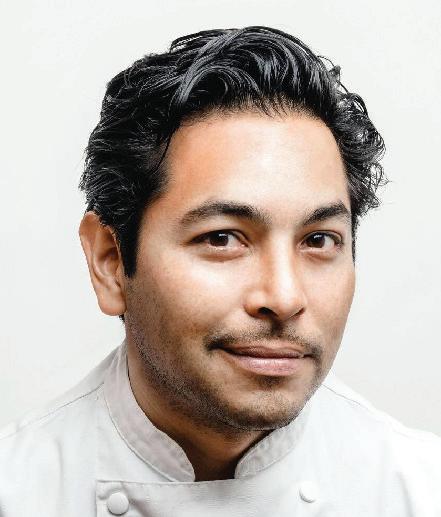
“Most of these insects require specific ecosystems,” Redon says. “They need everything in the climate. If they don’t have that, the nest is destined to die.”
Redon grew up in the rugged state of Hidalgo and remembers his grandparents’ love of escamoles. The annual harvest season (roughly mid-February through April) overlaps fortuitously with the period of Lent, during which Catholics forgo meat on Fridays. Escamoles were fair game, however, and though a hard morning of foraging might yield just a few ounces, their light nutty flavor and high protein content made them a treat to look forward to.
Redon eventually moved through France and Italy, as well as JWU’s
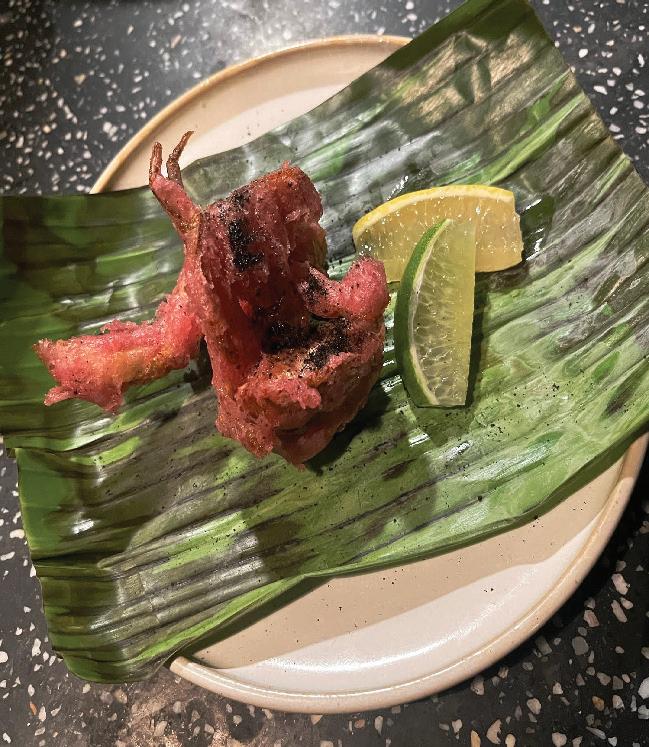 By Sam Eifling
By Sam Eifling
Denver Campus, for his culinary and restaurant studies, and worked as a chef and consultant at restaurants around Europe before finding his way back to Mexico about 12 years ago. That’s when his uncle turned him on to the practice of foraging for the ant larvae. For a time Redon’s escamoles were starring in dishes at such lauded Mexico City establishments as Pujol, a mainstay on lists of the world’s top restaurants.
Since the pandemic shook up the scene, he has mostly foraged escamoles with visitors on ecotours and for his own pop-ups. When reached at the beginning of escamole season, he was looking ahead to designing a tasting menu that would pair edible insects with Mexican wines — chapulínes (grasshoppers) with a sturdy red like a Pinot noir, and escamoles with a crispy white. “Even champagne,” Redon says. “Something bubbly and dry.”
He revels in the chance to elevate the humble foods of his home state. When UNESCO in 2010 recognized Mexico’s traditional cuisine as a piece of the world’s cultural heritage, Redon says, the local food community began to understand how special it was. Keeping that flame lit by foraging escamoles is tricky: Poachers threaten the ant nests, which are easy to destroy with overharvesting. But the bugs represent a piece of a sustainable food practice that remains fiercely local. The entire country produces only about four tons of escamoles a year, and the things spoil easily, making them notoriously tricky to ship. Their best path is from a dusty hill straight to Redon’s kitchen.
“It’s nice to be in nature,” he says. “We have eagles, we have different flowers. You have this bonding time, and life, and then you get to come back and you had a good day.” Then he whips up some escamoles on fresh-made tortillas with some onions and flowers for his visitors. “And it doesn’t matter where they’re from,” he says. “At the end, their mind is just blown away. JWU
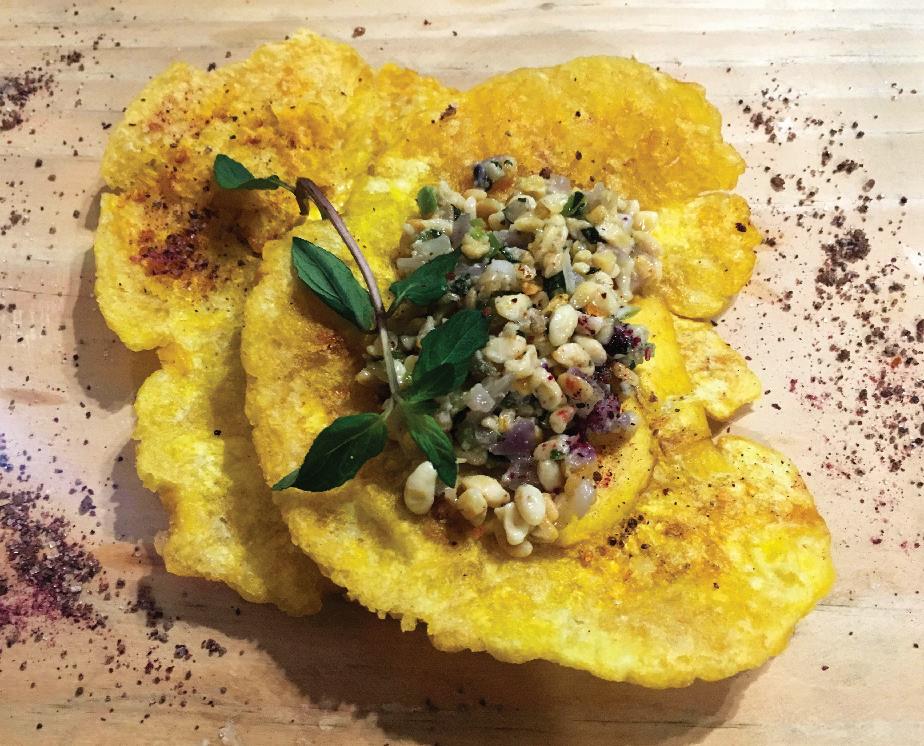
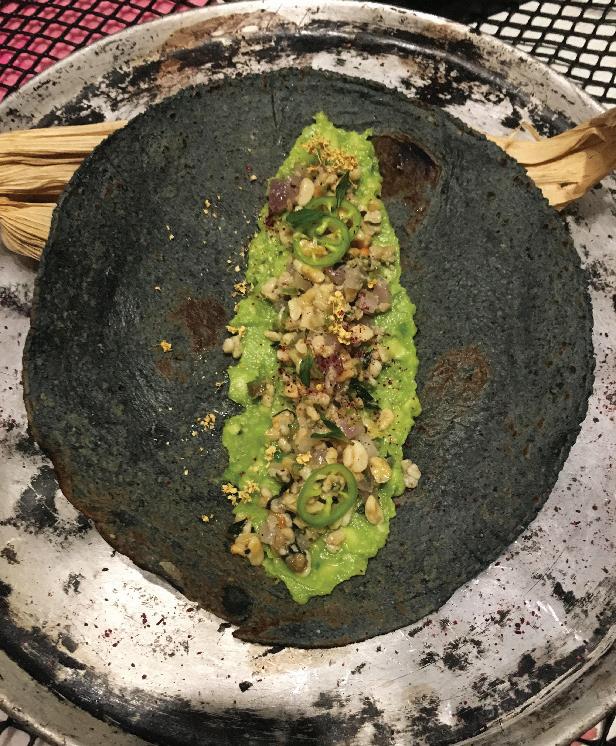
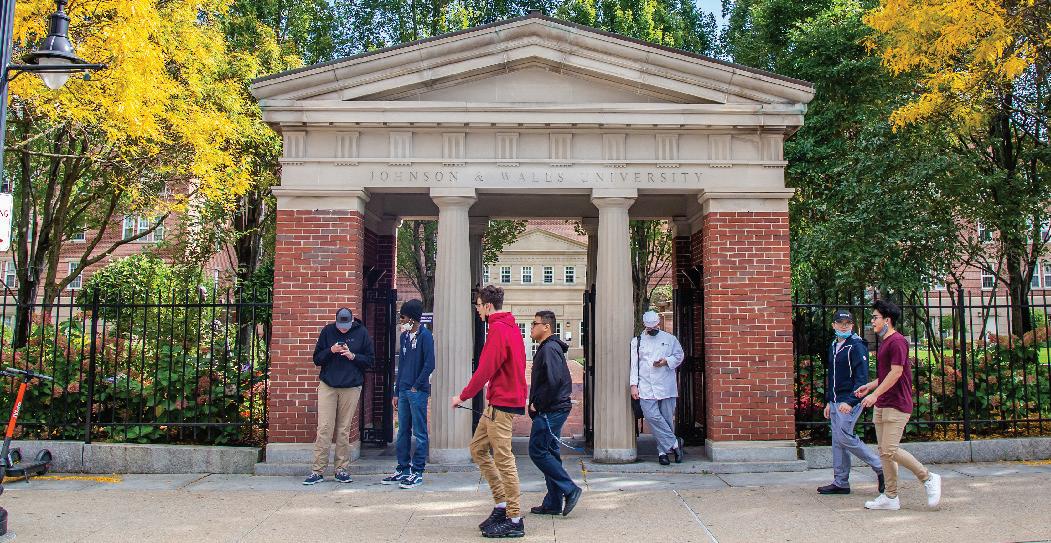
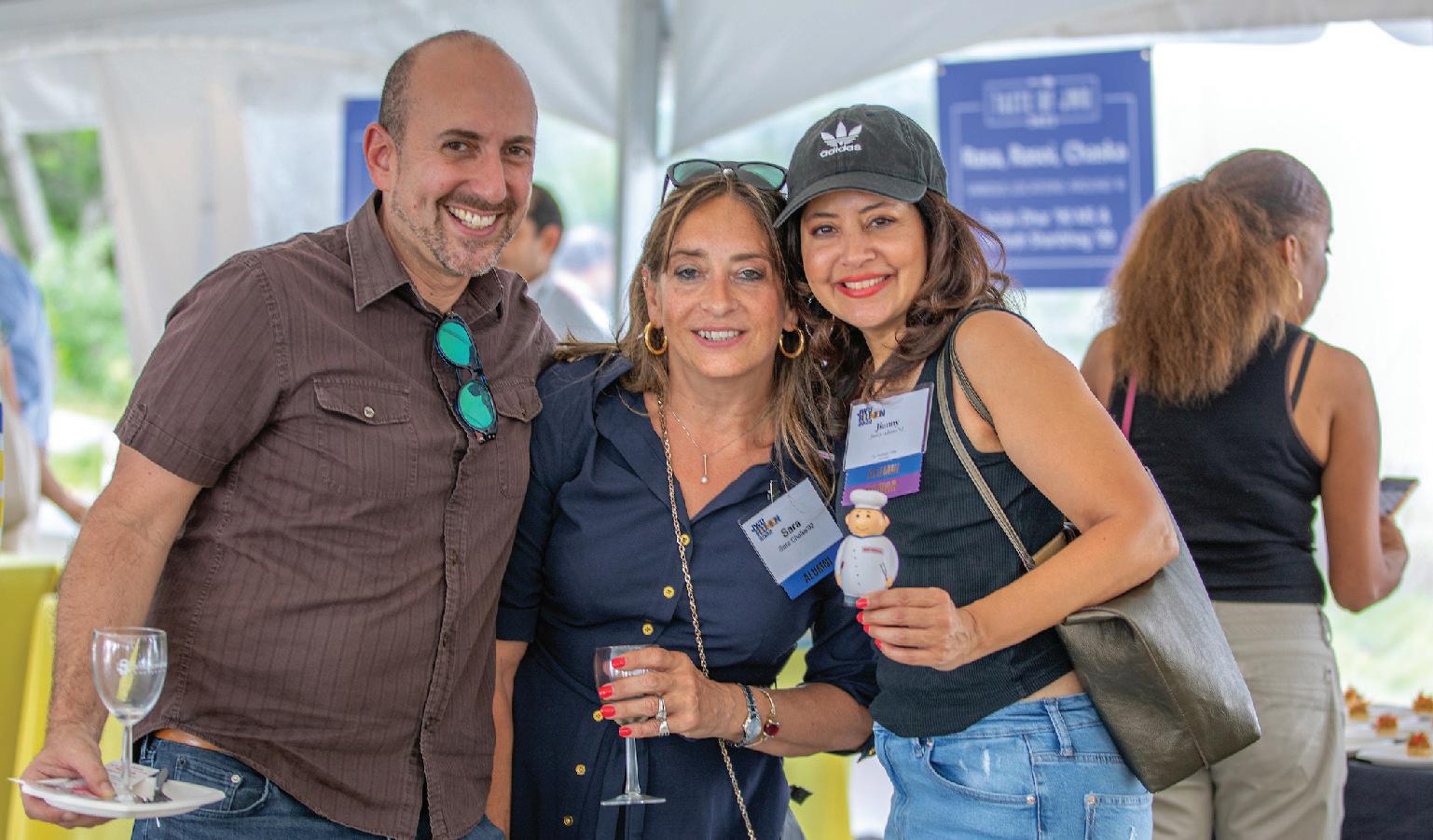
Come and reconnect with all the things that make JWU so special! Indulge in delicious flavors at Taste of JWU, attend interactive workshops, tour our cutting-edge classrooms, celebrate the Distinguished Alumni Award recipients, and much more.
Dates and details for the biggest #JWUAlumni event of the year are coming soon! alumni.jwu.edu
